DA EDA LUS 2023
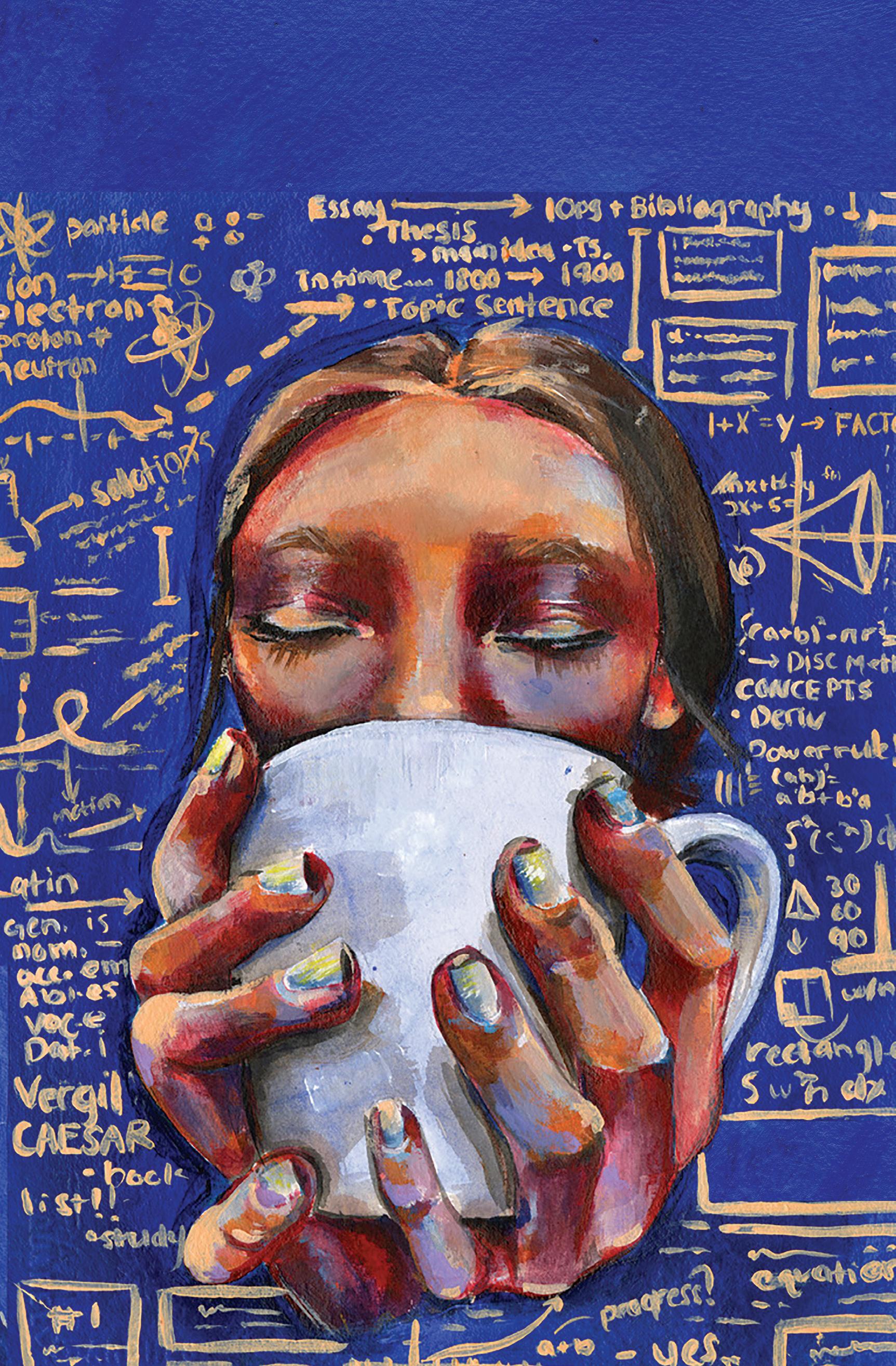
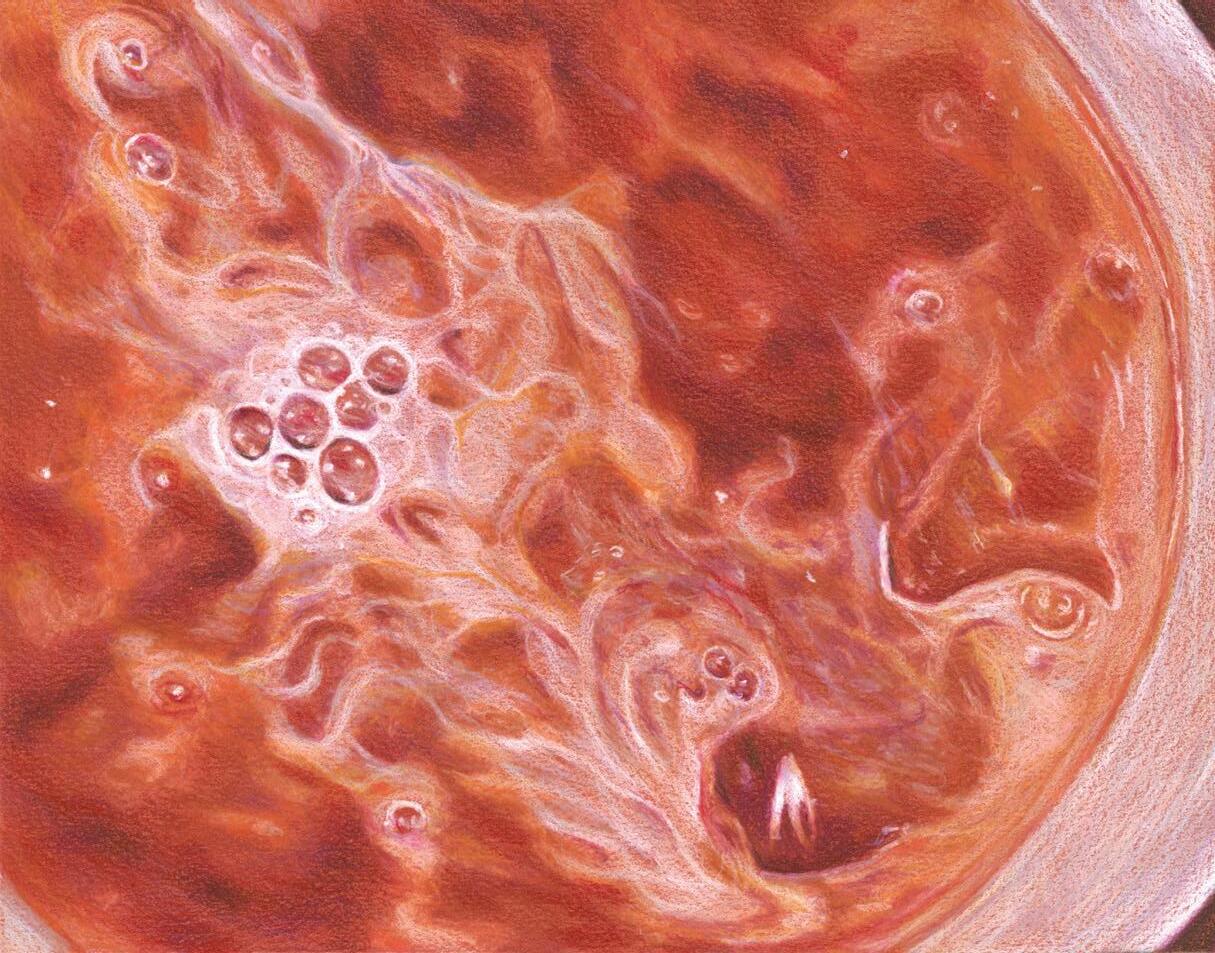
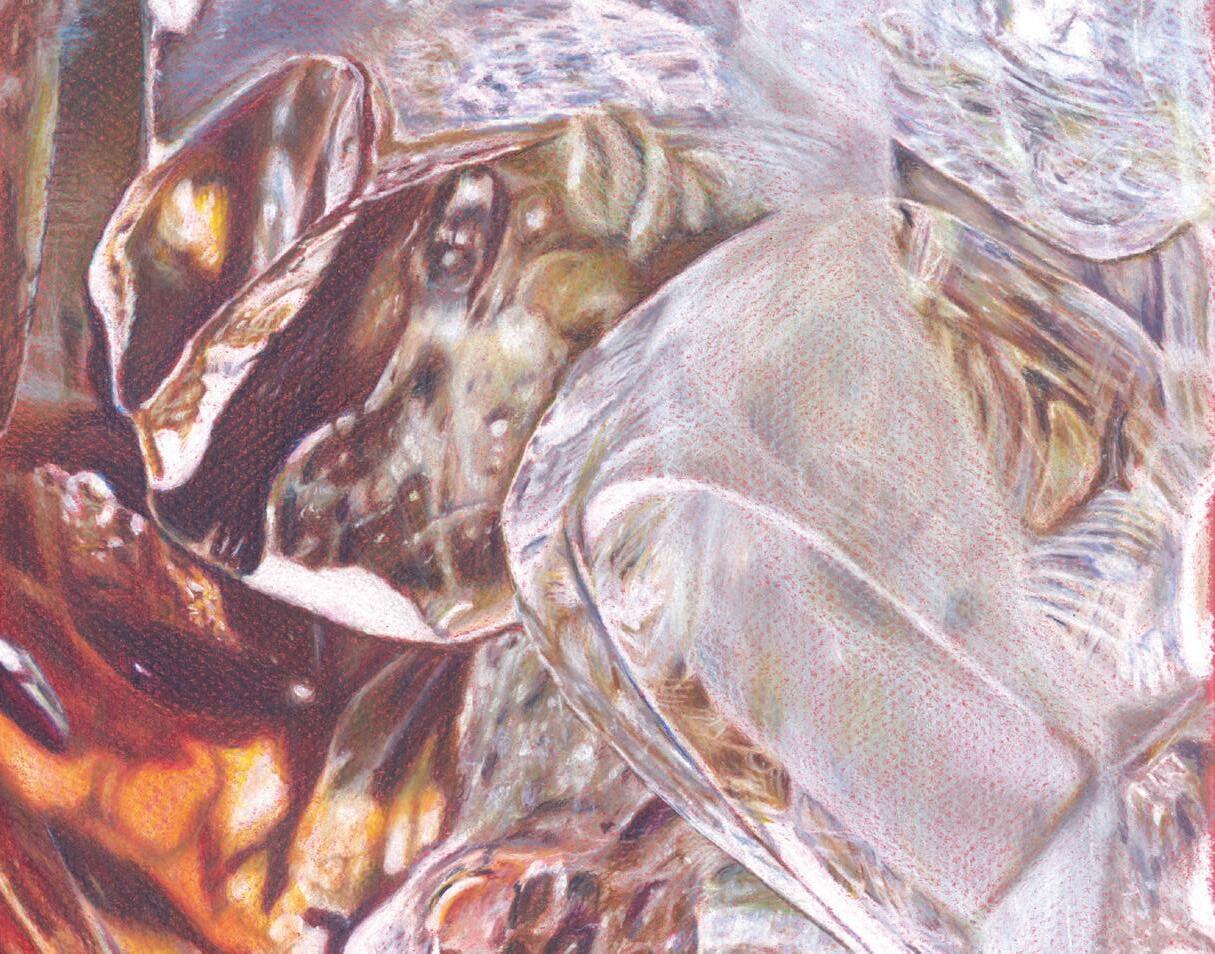
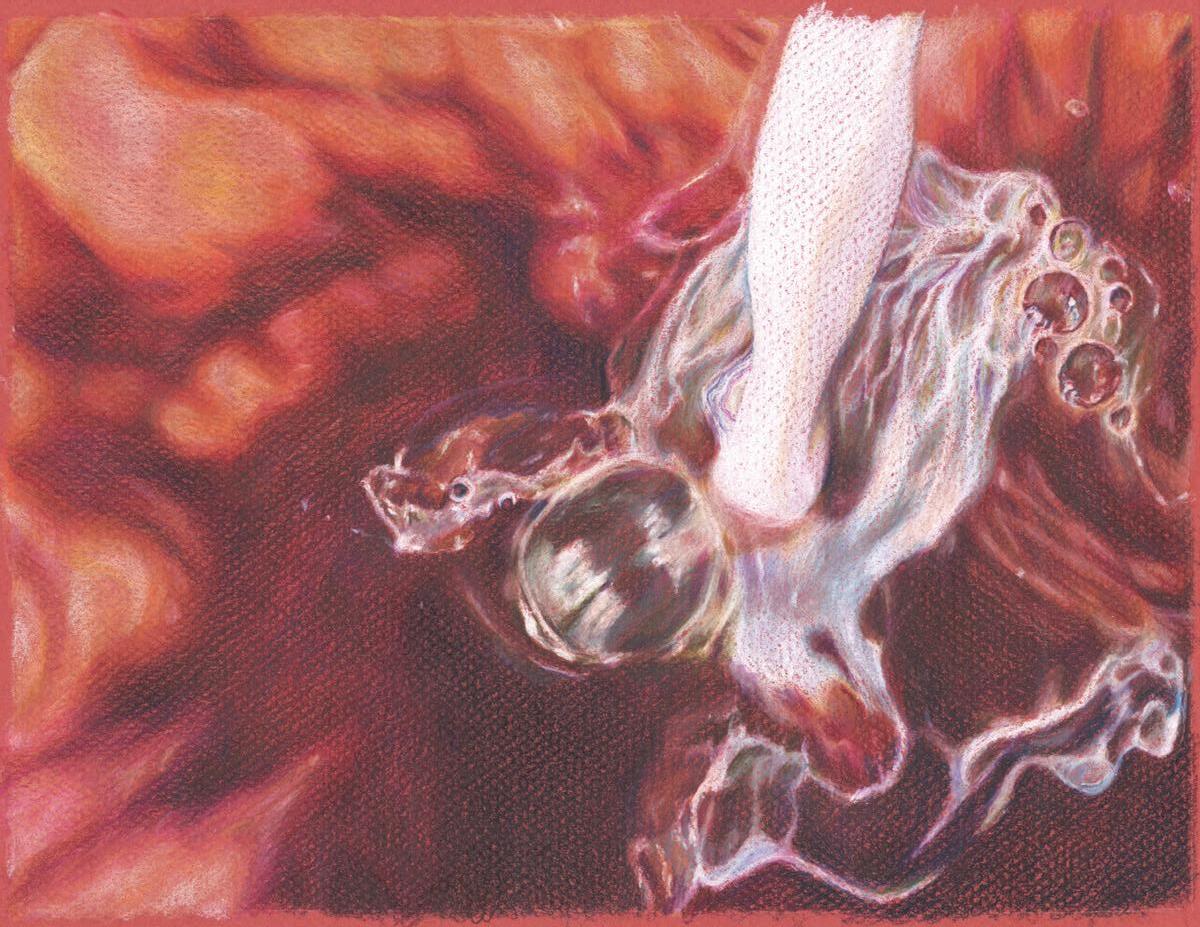
DAEDALUS 2023 Greenwich Academy Volume XXXV daedalus@greenwichacademy.org 200 N Maple Avenue Greenwich, CT 06830
Daedalus, the ancient Athenian, created the Minotaur's famed labyrinth and invented wings so that he and his son could escape from King Minos. Daedalus reminds us that we are all creators and all inventors.
Editors-in-Chief
Ying-Chu Chen, Katie Nichols, Sara Raghavan, Tara Salli
Chief Art Editors
Nina Herceg, Sarah Li, Alicia Qin, Elizabeth Spaulding
Associate Writing Editors
Grace Crookenden, Scarlet Fishkind, Saskia Jakubcin
Associate Art Editors
Arielle Burrows, Zara Kurbanov, Ainsley McKee, Honour Russell
Members
Chloe CasturoBurnette
Natalie Cook
Alessia Cutaia
Isabelle Dioquino
Arabella Everitt
Hadley Faulstich*
Grace Galvin
Grace Genereux*
Madison Grace-Harris
Shriya Gupta
Ellie Holden
Joyce Huang*
Haley Johnson
Zara Kurbanov
Maggie Nichols
Libby Nook*
Elsa Pekarovic
Melina Salame*
Lauren Sun
Anna Zhuperina
Alexandra Zummo
*Junior Editor
Over the last 35 years, Daedalus has earned 63 national awards from the Columbia Scholastic Press Association (CSPA) and the National Council for Teachers of English (NCTE). We continue to be inspired by the community of writers and artists at Greenwich Academy. To gather the writing contained within the pages of this magazine, students of Greenwich Academy submitted writing to five monthly deadlines. Submissions are anonymous and read by the entire Daedalus writing staff. During subsequent manuscript meetings, the Daedalus staff discussed each piece, offering constructive feedback so as to improve the general quality of our community’s writing. Club members then anonymously vote yes/no (whether or not we think it should go in the magazine) on the submissions. The writers of the top two pieces from each manuscript meeting as dictated by these ballots earn the coveted title of “Writer of the Month,” which comes with a gift certificate to Diane’s Books, a favorite local bookstore. Meanwhile, the art editors also select from hundreds of original pieces over the course of the year. In March, all editors narrow their selections and begin production, which continues through April. We use the publishing software InDesign to format our layout and construct graphics. In May, chief editors collaborate with our printer until Greenwich Academy’s end-of-year Publications Assembly, where we read from the issue, exhibit slides of all art, and celebrate!
Faculty Writing Advisor
Lauren Delapenha
Faculty Production Advisor
Rob Pursell
Faculty Art Advisor
Sherry Tamalonis
Printer
Graphic Management Partners, Port Chester, NY
Colophon
800 copies of Daedalus have been printed on 80 pound Euro Gloss stock with 120 pound Euro Gloss for the cover. The text is set in Avenir Next, designed by Adrian Frutiger in 1988.
CONTENTS Wings Drink to Stay Alive || Multimedia Honour Russell 8 At the Coffee Shop || Nonfiction Sara Raghavan 9 A Liar’s Admonition || Poetry Alexandra Zummo 10 Wish For Myself || Linoleum Block Print Honour Russell 11 Todd’s || Acrylic Ava Lee 12 Case Number: 01315 || Fiction Siena Sabitsana 13 Doorway || Photography Ying-Chu Chen 15 Self Portrait || Oil Paint Joyce Huang 16 To: Lost Bunny || Fiction Grace Genereux 17 Chasing Flowers || Fiction Libby Nook 18 Bloom || Pastel Ava Lee 19 When Wallflowers Talk || Marker Ainsley Mckee 20 Wing Structures || Pen and Ink Grace Sullivan 22 Bug Boy || Fiction Grace Crookenden 23 Webster || Laser Cut Wood Anna Sullivan 25 Prisoner of Addiction I; II || Multimedia Callie Hammond 27 Mirror, Mirror || Pastel Zara Kurbanov 28 Surprise Gift || Fiction Grace Genereux 29 Perception || Collage and Digital Design Katie Hawks 32 Upon a Verdant Country Hillside || Poetry Alessia Cutaia 34 In Bloom || Photography Sara Raghavan 35 Tennis Boy Struggles || Fiction Katie Nichols 36 Happy/Angry; Angry/Sad || Digital Design Jake Minella 39 An Ode to Youth || Watercolor Nina Herceg 40 Apple and Pears || Pastel Alicia Qin 40 Simple Summer Mornings || Poetry Libby Nook 41 Labyrinth Crumbling City || Graphite Izzy Hartman 44 The Ice Cream Man || 3D Print Sarah Li 44 A Mail Truck’s Path in Vairable Delight || Poetry Natalie Cook 45 Jaque Mate || Graphite Victoria Batres 46 The World According to Karl || Fiction Scarlet Fishkind 47 Traffic || Oil Paint on Tile Elena Schmedlen 51 Pass the Salt || Poetry Joyce Huang 52 Citizenship || Graphite Joyce Huang 53 Aphrodite’s Garden || Collage Ava VanMoorsel 54 The Final Flower on the Bus to Runeberg || Fiction Tara Salli 55 Twisted || Colored Pencil Ava Lee 57 Above the Tracks || Fiction Izzy Rosales 58 The Commute || Colored Pencil Anna Leventon 60 Arrived || Marker Anna Leventon 61 Last Cab || Colored Pencil Anna Leventon 61 Homeward Bound || Photography Sara Raghavan 62 Janie Ignores an Astronaut || Poetry Natalie Cook 63 Selfie || Acrylic Ainsley Mckee 64 Pechorin’s Diary || Fiction Tara Salli 65 The Voyage || Acrylic Alicia Qin 67 The February Sun || Poetry Katie Nichols 68 Golden Hour || Photography Sara Raghavan 68 Golden || Photography Sara Raghavan 69 Somber || Oil Paint Zara Kurbanov 70
Cover, Back Cover: Morning Cup || Acrylic Ainsley Mckee Inside Front Cover, Front Page: Coffee Series || Pastel Zara Kurbanov Section Dividers: Coffee Series || Pastel Zara Kurbanov Inside Back Cover: Sunday Morning || Digital Media Elizabeth Spaudling
Cover Credits
But the Air and Sky Are Free
Lesson From Mother || Fiction Ying-Chu Chen 71 First Snow || Pastel Zara Kurbanov 73 Collette || Digital Design Elizabeth Spaulding 74 Donald || Charcoal Elizabeth Spaulding 75 A Most Peculiar Library || Fiction Honour Russell 76 Thoght Process || Pastel Nina Herceg 77 Dance Corps || Multimedia Nina Herceg 78 Overcast || Dance Dance Corps 78 keep dreaming.; Stop! || Dance Dance Corps 79 Mortals and Immortals The Inner Workings of a Hooverville || Fiction Arabella Everitt 82 Rust || Oil Paint Sarah Li 83 Ohio Hills || Oil Paint Sarah Li 84 The Adlers || Fiction Sara Raghavan 85 Growing || Ink Wash Nina Herceg 87 Red || Poetry Joy Akuffo 88 Distorted Reflection || Oil Pastel Arielle Burrows 89 A Letter to Moscow || Fiction Tara Salli 90 Water II || Acrylic Sarah Li 92 The Glove Department || Fiction Ying-Chu Chen 94 Transformation || Black and White Charcoal Grace Sullivan 95 When Did Samhain Become Halloween? || Poetry Serena Evans 96 Ojo de Isabela || Photography Kristy Keil 97 Comfort || Oil Paint Alicia Qin 98 Lloyd Crofton’s Winning Goat || Fiction Alessia Cutaia 99 But Then I Met || Fiction Scarlet Fishkind 102 Self By Self || Paper Cut Jake Minella 103 A Problem for Another Day || Fiction Melina Salame 104 Skin and Bones || Watercolor Ainsley Mckee 106 Critique || Acrylic Ainsley Mckee 107 In a Crowd, Walking Alone || Collage Asher Benn 108 Monday, 4 AM || Nonfiction Sara Raghavan 110 Binney Park || Colored Pencils Zara Kurbanov 111
Oh the Patterns || Poetry Ella Kurtz 114 In Winter || Oil Paint on Tile Alicia Qin 115 Macbeth || Acrylic and Spray Paint London Ulysses 116 Tamir Rice’s First Art Show || Poetry Emma Jones 117 I’ll Never Show My Hands || Song Lyrics Lauren Sun 118 Blues || Acrylic Joyce Huang 119 Not Your Aphrodite || Acrylic Honour Russell 120 Bound Freedom || Acrylic Honour Russell 121 Mirrors || Marker Sofia Sabitsana 122 Estranged || Poetry Joy Akuffo 123 The Moon and His Lover || Fiction Zara Kurbanov 124 Mystical Night || Acrylic Zara Kurbanov 125 Vortex || Acrylic Zara Kurbanov 126 Pennies for a Purpose || Nonfiction Hadley Faulstich 127 Liberation || Pen and Ink Persia Shipman 128 Letter No. 136 || Poetry Ashley Aufderheide 130 Love So Deep || Multimedia Honour Russell 131 My Forever Love || Fiction Katie Nichols 132 Introspection || Digital Design Summit Mock 133 Winter Scene || Acrylic Izzy Hartman 134 Thoughts of Fire and Snow || Nonfiction Ying-Chu Chen 135 Still Standing || Photography Sara Raghavan 137 Morning; Sunrise; Evening; Sunset || Pastels Zara Kurbanov 138 The Silver Cabin || Fiction Gianna DeBono 140 Door to Elsewhere || Photography Zara Kurbanov 141
Letter from the Writing Editors
This year, Daedalus published its 35th edition! As the largest and oldest student-led organization at Greenwich Academy, Daedalus has continued to foster a strong community of writers and artists who are passionate about both respecting the legacy of the magazine and establishing new traditions in 2023.
In her second year as faculty writing advisor, Lauren Delapenha has continued to play an integral role in the club and magazine. Ms. Delapenha, our faculty production advisor Mr. Pursell, and our art advisor Ms. Tamalonis were invaluable in assembling and ultimately publishing this year’s magazine. We thank them for their dedication and the countless hours they’ve invested in Daedalus
Although meetings take place on a weekly basis, the camaraderie and care of the Daedalus community extends far beyond Fridays. This April, at our 16th Annual Writers’ Fest, we hosted three visiting authors: journalist Lisa Miller, poet Natasha Rao, and fiction writer Hirsh Sawhney. Organized in conjunction with The Brunswick School and Sacred Heart Greenwich, this day-long event was an opportunity for students to attend readings by accomplished authors and develop their own writing skills in workshops. Thankfully, before breaking for the holidays in December, we were able to bring back the annual Daedalus Coffee House, when club members were invited to read their work and enjoy hot chocolate and donuts.
We also began several new traditions. In monthly newsletters, we updated the Greenwich Academy Upper School on upcoming creative writing and art competitions, and forwarded monthly book recommendations: two from excited faculty and two from us. Additionally, over Winter Break, we emailed “12 Days of Prompts” to encourage the creativity of our club members during time off. All in all, it was a successful year of reinvigorating the old and ushering in the new!
On Fridays when there was not a manuscript meeting, the Editorsin-Chief ran a variety of art and writing workshops. We explored poetry, creative nonfiction, clichés and how to avoid them, ekphrasis, historical fiction, creative letter-writing, and even Shakespeare as the perfect lesson in dialogue and scriptwriting. During art workshops, we learned how to draw popular cartoons and invent our own, made greeting cards, and even decorated cookies around Valentine’s Day. This year, the Art Editors also successfully collaborated with the Greenwich Academy Breast Cancer Awareness Club to knit hats, all of which went to cancer patients recovering or receiving treatment in hospitals in our area.
Thank you, Daedalus, for contributing so happily to the community of writers and artists at Greenwich Academy. Without you, we would have missed many happy afternoons typing away at a new short story, and we have been so proud to give back to the community that has molded us into the writers and people we are today. Putting together this amazing collection of writing has been a wonderful experience, and we leave this May knowing that the magazine is in the strong, capable hands of the junior editors and faculty advisors.
Happy reading!
With love and appreciation, Ying-Chu Chen, Katie Nichols, Sara Raghavan and Tara Salli

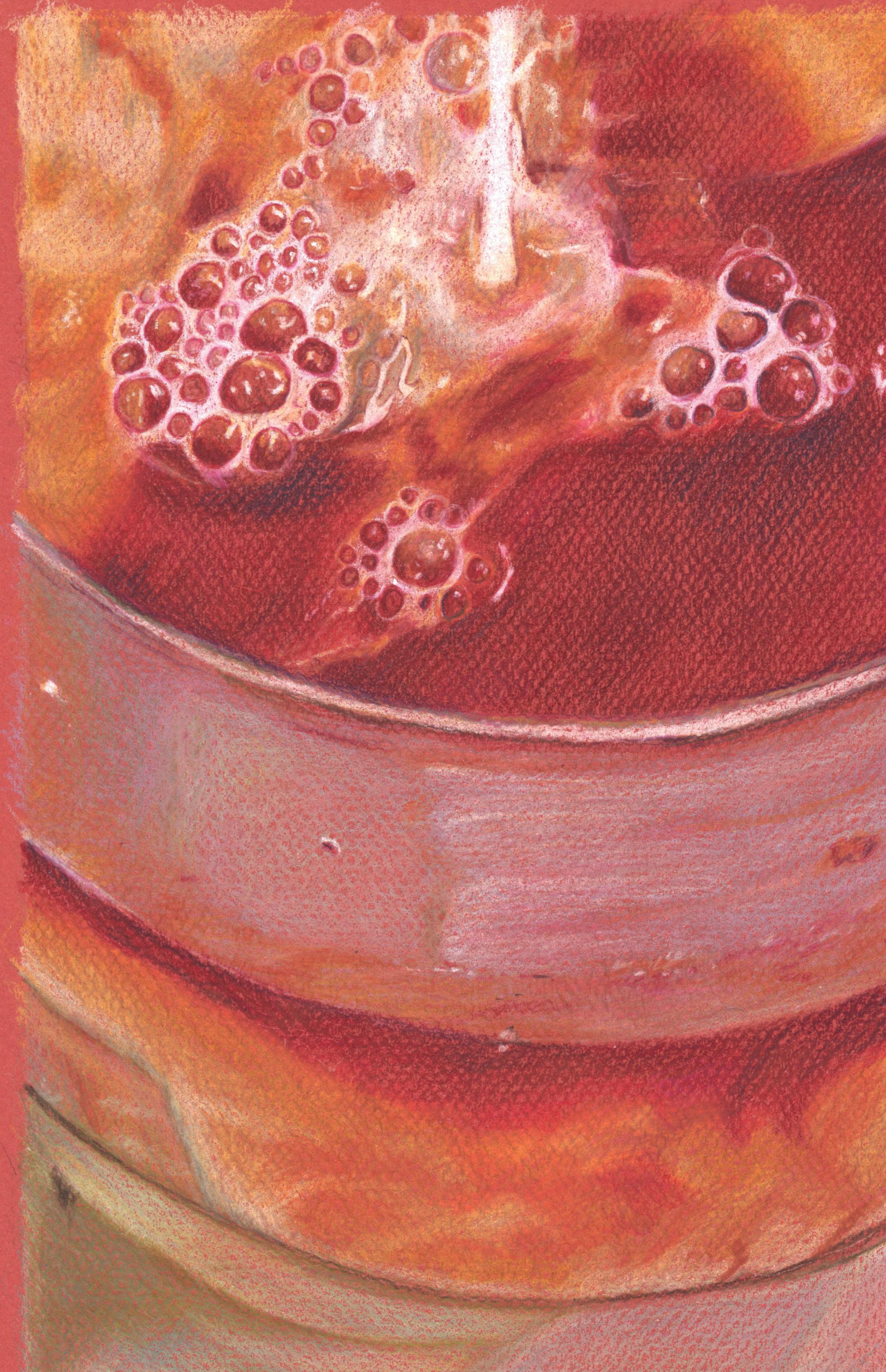
Wings Wings Wings Wings Wings


Wings Wings
Drink to Stay Alive
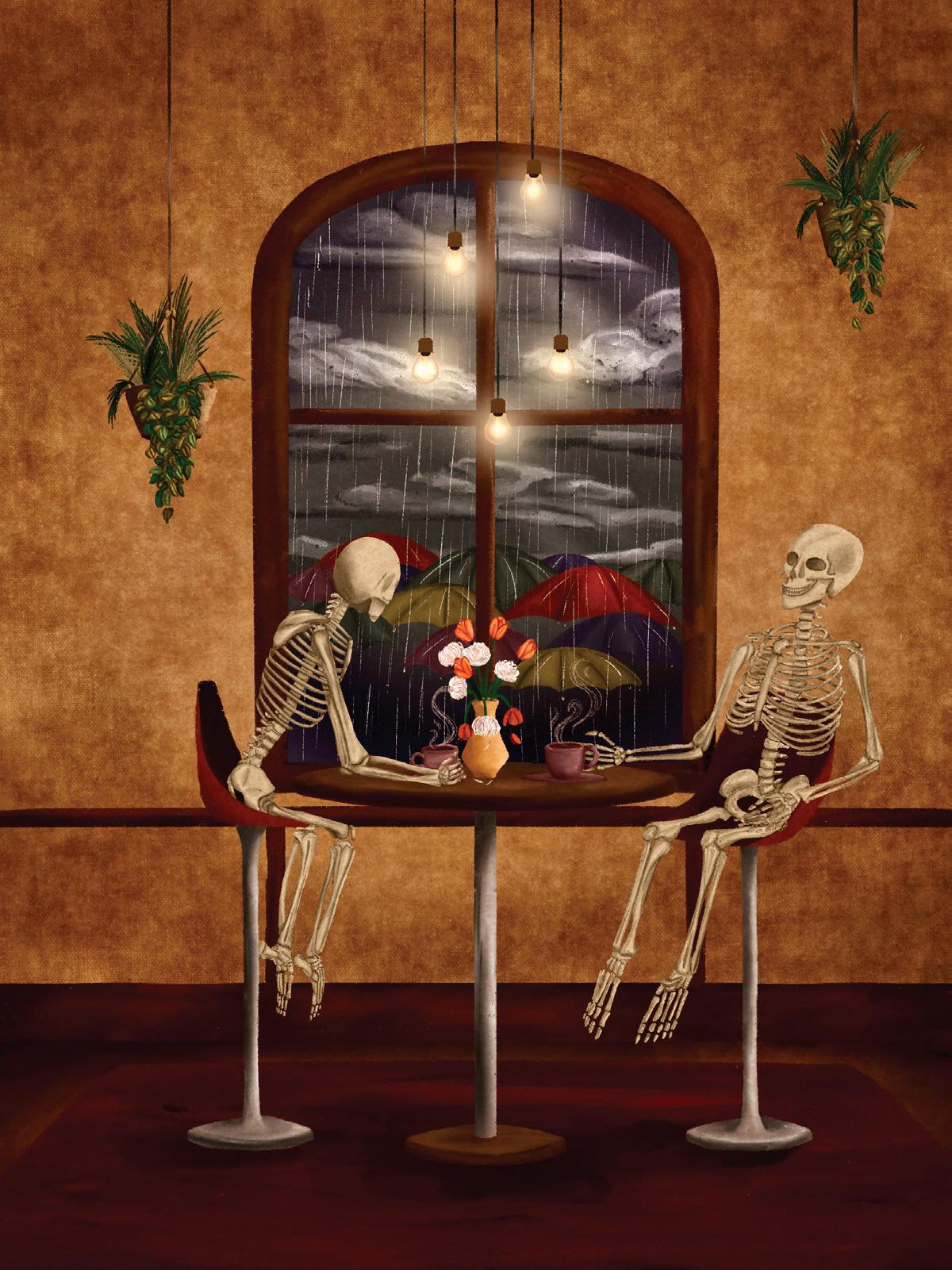 Honour Russell
Honour Russell
8
At the Coffee Shop
Sara Raghavan
A couple is on a date. It feels like a first date. The woman says to the man, “I’m reading this new poetry collection that follows a six-year-old girl as she grows up. Right now, she’s thirteen, and…” The man nods intently, gently sipping from his mug. You think they’re cute but somehow doubt they’ll last.
Two elderly women, half reclined and half awake, discuss the concept of “affluenza.” You’ve only ever heard the term in song lyrics. One woman has a British accent. It feels fake. “These rich children—they have such easy access to drugs under the wrong influences. What a pity.”
A man wearing a yellow raincoat has just finished paying for his latte. He requested oat milk in place of the usual dairy. As the barista begins to tell him his total, he asks if he can add a blueberry scone to the order. The barista says yes, of course. The man waits until the barista returns to tip, so that she sees the dollar and seventeen cents go into the can.
Another barista wanders about clearing tables. You watch as he sweeps a torn train ticket and a wilted, abandoned bouquet of flowers into a small black trash bin. He sets the bin down and begins to wipe the table top clean.
And you. You are sitting at a narrow two-seater by the register, your backpack in the chair across the table. You hold your pen in one hand, the other grasping the coffee mug, keeping you warm. You’re praying for divine inspiration as you write, inventing, creating. Hoping the characters will construct the plot for you.
9
A Liar’s Admonition
Alexandra Zummo
They claim my eyes flash with madness. They say my hysteria defaces my beauty. They call me a liar. The unstable daughter of King Priam, who surely must have offended a god to deserve such a cursed daughter.
My poor family. Poor, poor, poor. Having to listen to me screech about how the wine was poisoned, the guest carried a knife, the wooden horse was trickery.
No, they insist, I must have mistaken the glint of a knife for jewelry. Or perhaps I’m just looking for attention. Crazy, contemptible Cassandra. Gifted with seeing, cursed with never being seen.
Trapped like the Minotaur in Daedalus’s labyrinth. Trapped, trapped, trapped. When the war finally bleeds past our unyielding walls, when the dirt turns to rust, when screams of anguish fill the air, don’t say I didn’t warn you.
10
 Honour Russell
Honour Russell
11
Wish For Myself
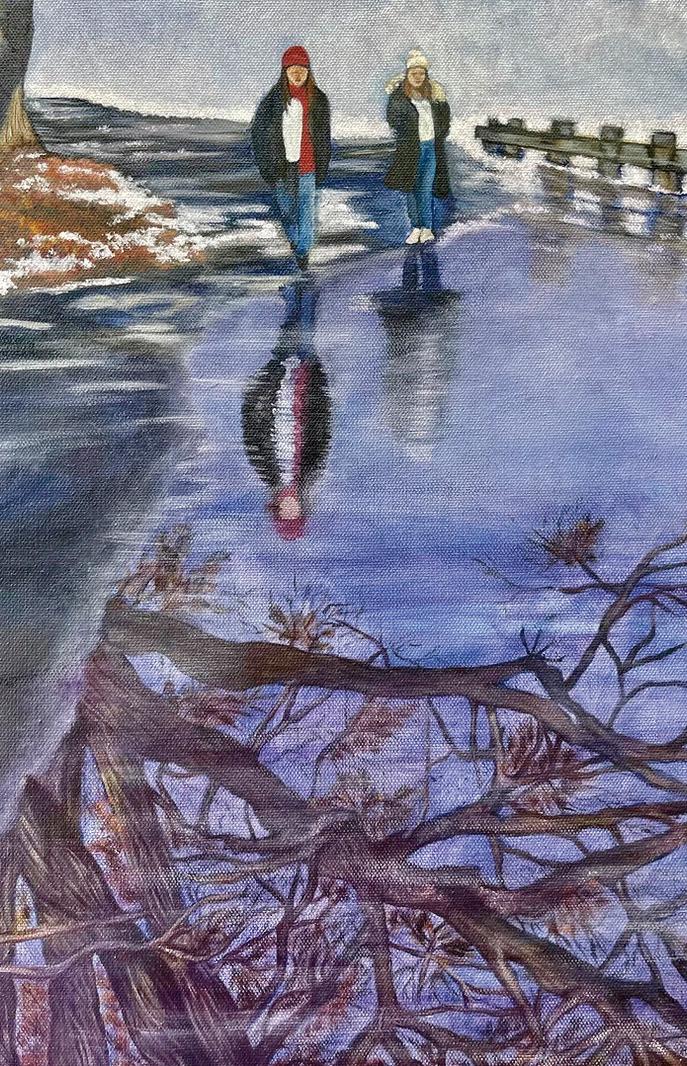
Case Number: 01395
Case Number: 01395
Date: August 20, 2003
Address: 94 Greyhound Lane, Allister, CA
Reason: Collecting Evidence on Missing Person
Notes:
Siena Sabitsana
Evidence #1: A Stuffed Animal (Purple Bunny)—found in the 1st Bedroom closet. mother said that she slept with it every night. Seems like she hasn’t touched it for over a year. It appears to have been cut and sewn back together many times.
Evidence #2: A Broken Yellow Headband—found in the top drawer of the bedside table. Another staple in the missing person’s younger years according to the pictures mom provided. Said she liked it to push her hair back. The mom said she wore it every day to school, and ripped it off as soon as she got home. Insecure about hair? The mom said it broke in 5th grade one day at school, and was never worn again.
Evidence #3: Hair Straightener—hair straighter found on the desk. Mom said she started to straighten her hair right after the headband broke. Coincidence? Missing person straightened her hair every morning before anyone could see her curls. Sister can’t remember the last time she saw her natural hair.
Evidence #4: Box of Clothes—box filled with tank tops, skirts, and jean shorts. Also shoved into the back of her closet though it seems most of these were bought by mom and family. The mom prides herself in being very in-tune with the teenage fashion. Picture book shows that she used to wear the clothes in the box, but she has worn sweatshirts for the past couple of years.
Evidence #5: Smashed Mirror—glass shards all around the mirror. Appears to have been smashed right before the girl went
Ava Lee Todd’s
13
missing because there are no signs of cleaning up the glass shards. Family doesn’t remember hearing it break. Still cannot identify how it was smashed.
Evidence #6: How to Present Yourself as a Lady—book found shoved to the back of the middle drawer in her bedside table. Note inside the book:
To my girl—Thought I would give you this book since it seems you are struggling a bit. I saw it in the bookstore and immediately thought of my wonderful daughter. Love, Mom
The mom denies ever giving the book to her, but her signature is the same as the one on the missing persons’ report she filed one day ago. In the note, the writing is crossed out and in its place is the missing persons’ handwriting: “Become perfection. Love, Mom.”
Evidence #7: Missing Persons’ Computer—found on the desk. Password was “Solo67.” Solo is the missing persons’ dog that had died just a few days before. Mom said the girl was devastated. Girl was being cyberbullied by her classmates anonymously. Messages reach back to 5th grade, bullying her for her headband. Last message was from four days ago, three days before disappearance. It read, “Watch your back.” From the same user who sent the headband message, the only consistent messenger throughout the years. From 0394milbornms. Milborn Middle School was the school the missing person attended.
Evidence #8: Blue Scissors—found inside the smashed mirror, apparently it could be opened. It has been determined that the scissors shattered the mirror based on the remaining shards left and the dent in the wood behind the glass resembled the tip of a scissors blade. Dried blood was found on the scissors as well.
Follow Up: 0394milbornms was traced to the next door neighbor, Kate Mendol. She was interviewed and denied sending the messages. Got a hold of her computer and she confessed once we opened it. She said the missing person made the whole class laugh at her when she tripped over her books. She had cried for two whole days after that Friday, and the next week, she sent her first message. Girl was taken to the police station to be questioned further.
14
Evidence #9: Diary of Missing Person—found stuffed inside the mirror as well, with a sweatshirt wrapped around it so nobody could find it. Diary was filled with one sentence a day for six years. Most phrases consisted of, “I need to get my mom off my back.” The only time two phrases were written was the last time something was written in the diary, exactly three days ago. The message says, “I need to get out of here. I’m sorry.”
Evidence #10: Duffel Bag Missing—family discovered that some of the girl’s favorite clothes, a phone charger, her phone, and her safe were also missing. It seems like she has been saving up for a while now considering her mom said she never bought anything with the money she had.
Conclusion: The missing person planned her escape. It seems like the sister might know where she has run off to. She seemed extremely nervous when they found the diary and the missing items. She denies knowing any more information than they have told us. Our team will try to locate her whereabouts, but she turns eighteen in a matter of days, so if we do find her, we are under no obligation to tell the family where she has been or where she is going.

15
Ying-Chu Chen Doorway
 Joyce Huang
Joyce Huang
16
Self Portrait
To: Lost Bunny
Dear Bunny,
Grace Genereux
Tell me the truth. Are you walking down 7th Avenue? Are you sitting on a bench in Prospect Park? Are you at our favorite playground across the Brooklyn Bridge? That’s a long way for you to travel, but I don’t doubt you can do it.
I’m really not exactly sure how I lost you. I swear. I got out of gymnastics, and I thought you were safe in the back of the stroller like always. Mom was rushing me, so I hopped in and didn’t think about grabbing you. And you know I normally hold you on the subway rides while I play on mom’s Blackberry. I didn’t realize until I got home that you were gone. I promise.
Did you fall out of the stroller? Did someone take you? Did you decide to take a walk? Honestly, you’ve never been much of a walker…
We’ve been looking for days, and there’s still no sign of you. I’ve taped up signs on lampposts, asked a few neighbors walking past our front stoop, but I’ve got no leads. To make matters worse, I saw mom on her laptop last night scrolling through the Jellycat website. I got you there years ago, and I think she’s going to try and make a purchase… a replacement.
I don’t exactly know where I’ll send this letter, but I’m thinking of bringing it to the post office to get their advice. There’s got to be a place lost stuffed animals can go to receive letters.
Anyways, I should really bring this to a close. I’m supposed to go to bed soon, and I really want to watch some Nickelodeon. You’ve never been a big talker, but try and get some help from someone. Avoid talking to people at night though, mom tells me they can get weird. Also, try and find a good place to sleep. Maybe you can finally meet some of the other bunnies I’ve been telling you about.
From, Your best friend.
17
Chasing Flowers
Libby Nook
Charlie Grace wears flowers in her hair. We don’t remember when it began, but any time we see a girl with pops of color sprouting from her sandy-haired head, we know it’s Charlie Grace. She can be seen around town wearing leftover flowers from Proctors Market’s floral arrangements and bouquets, which the owner, Mrs. Proctor, began gifting to her a few years back. In the fall, we often see her wearing sunflowers and poppies tucked into symmetrical French braids, while in the winter, it’s normally pansies and violets scattered through a ponytail. In the spring, she’ll wear daffodils, daisies, or peonies, and by the summer, her head is always painted in a variety of flowers.
Charlie Grace wears ribbons as shoe laces. She waltzes through town with shimmery satin ribbons laced across her tired white Converse sneakers. With her flowers and ribbons, Charlie Grace dresses in janky overalls, mismatched pastel socks, and stained crew-neck sweatshirts from places she’s never been. She sticks out in Pine Creek like a Fruit Loop in a bowl of Cheerios. We’ve noticed that Charlie Grace is good at art. We always see her doodling mountains and dandelions beside the equations in mathematics. The only time we’ve ever seen her smile at school is in Miss Moller’s art class. Hiding in her little corner of the art room, Charlie Grace spends every class painting portraits of scenic mountains and wild-flower fields while humming to music that plays through her white-corded headphones. She’ll laugh if you ask her what song she’s listening to because, apparently, we wouldn’t know it.
Charlie Grace doesn’t want friends. We came to this conclusion years ago. In elementary school, Charlie Grace despised the playground but loved the swings. For the entire recess, she would fly side to side as her emerald wide eyes gazed into the clouds. Silently swinging, she’d never give anyone else a turn. In middle school, during gym class, we once asked if she wanted to bike to the movies with us after school. She said no without a breath of hesitation and then cartwheeled off into the tall wispy grass beside the playing field. Freshman year, we even asked her if she was going to the homecoming game. In response, she chuckled and shook her head. However, we should have known better by then.
18

203659
Ava Lee
19
Bloom
 Ainsley Mckee
Ainsley Mckee
20
When Wallflowers Talk
Two weeks before graduation, we saw Charlie Grace wandering outside the diner with daisies and daffodils displayed in her scraggly braid. Benny and Joe chuckled from a booth inside the diner at the sight of her creamsicle-colored overalls that matched the shade of her ribbon shoelaces and polka-dot socks. Longing for her attention, we banged on the window. Charlie Grace didn’t even blink at the commotion. She was used to the eyes and the cackles. Unfazed, Charlie Grace skipped across the street in her jingling overalls as if none of us ever existed.
All along, Charlie Grace was just waiting to graduate. In fact, just minutes after receiving her diploma, Charlie Grace disappeared from Pine Creek for good. Her mother told us that she had left on a vacation with a distant relative, but in reality, we knew that she had no clue where her daughter had gone. Throughout her life in Pine Creek, all Charlie Grace ever wanted was to leave. Everyone knew that.
After her sudden departure, rumors circulated around town like a disease. Some people believe that she left to climb Mount Everest. Others swear that she’s joined a cult of useless hippies and stoners. But we don’t think so. We think that Charlie Grace left to chase the flowers. We hope she finds them, too.
21
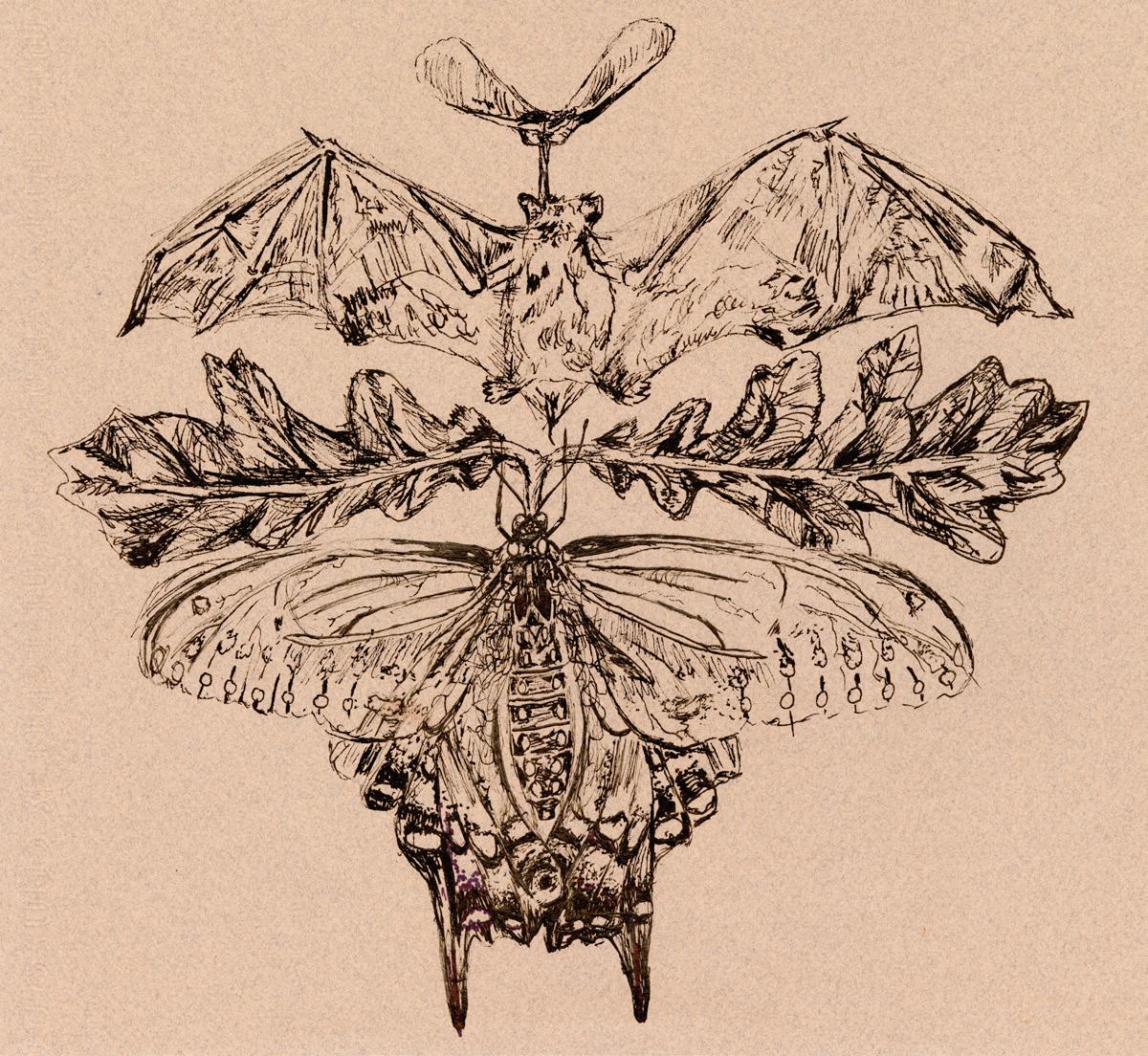 Grace Sullivan
Grace Sullivan
22
Wing Structures
Bug Boy
Grace Crookenden
On a windy Saturday afternoon, walking down Cherry Street on his way back from primary school, Jimmy leaned down into a squat. His little knees wobbled and he put a hand to the ground, patiently waiting for an inchworm to climb aboard. He watched as the green body curled halfway up and halfway down until it came to the edge of his finger. Determining the pudgy pinky was adequately safe to mount, the worm then stretched upwards to rest on Jimmy’s hand. Jimmy wondered if the inchworm had a brain packed into its small body that agreed to the offering after careful consideration or if it was rather instinct that determined his hand was hospitable.
When Jimmy had reached the door of his home, he caught a whiff of cabbage stew seeping through the cracks. The inchworm’s narrow green body was now resting on the tip of his pointer finger. It squirmed when it reached his nail beds, which were raw from digging dirt and building sandcastles at school. Jimmy’s parents were at that odd unidentifiable age. Young people would not know if they were forty or fifty or maybe early sixties but only that they weren’t young anymore. They had softly worn faces and memories of well-lived lives inscribed in the crow’s feet that stretched from the corners of their eyes. They were warm, but not sweet. Jimmy often sat at the dinner table quietly to observe the way his father, Joe Mackey, held a fork or took a sip of water, amazed by his ability to consume a glass in one gulp as if he was eternally thirsty. Jimmy would listen to his mother chew and slap her lips together. Sometimes she would spit out sentences at Mr. Mackey just to fill space. And while her words were tame, the delivery made Jimmy flinch and Mr. Mackey shuffle slightly in his seat. She then always followed with: “Jimmy, how was school today, darling?” spoken in a sickly sweet voice full of composure and softness that justified whatever she had said before. Jimmy would begin to explain his day but she would be back to eating again—nodding and humming at his description and occasionally glancing up at Mr. Mackey with a squint in her eyes. By the end of their dinner ritual, Mr. Mackey would slink away from the table and back to his indented seat on the living room couch. Before dinner, on the day of the befriending of his inchworm friend, however, Jimmy snuck through the door and went straight
23
upstairs to escape the “Why are you home so late?” talk from his mother. The door swung open to his bedroom, which was two doors down the hall from Mr. and Mrs. Mackey so that in the middle of the night, he could slip into their bed under the covers when his stomach began to hurt from dinner. On each wall were vases stolen from underneath flower bouquets on the rare occasion Mr. Mackey had made out at the casino and wanted to treat his wife. The vases, in their assortment of different shapes and sizes, were lined up on Jimmy’s bookshelf, which had been transformed into an observation center. He loved his bugs. The caterpillar was hanging from the lip of his mother’s crystal wedding pitcher, and the house spider was scampering around the bottom of a narrow tulip vase. His most special creature was an entrancing shade of green with a body that had been folded by an origami master and then brought to life by God himself—or so Jimmy believed when his teacher told him its name: praying mantis. The body of the creature could almost be described as vulgar, with legs that bent completely in different directions than a little boy’s knees ever could. Its face was fierce, but there was no doubt that the creature was magnificent. Its folded flesh almost tricked you into thinking it was a leaf—one that Jimmy could have tread on or ripped apart. But this was a game to the praying mantis. Deceiving and seducing you with its beauty.
Jimmy found a glass ink jar in his room for the inch worm and promised to bring cabbage back for it after he had eaten. He looked around at his room once more before leaving for dinner and was content with his bugs that he so lovingly nurtured with soft hands and soft foods. Dinner was the usual routine, and Jimmy returned to his room as promised to plop a piece of semirotten cabbage in the inchworm’s new home. The worm lifted his little head, or maybe backside—Jimmy wasn’t one-hundredpercent certain—to wave “thank you.”
Weeks went by and Jimmy’s collection slowly grew with earthworms and stink bugs, and once, a lightning bug that soon died in its enclosed jar. Jimmy had hoped it would light up his room so that he could see when he woke in the night, but was devastated when not only was there no light, but a lifeless body in his strawberry jam jar. School was getting harder, as he was now entering third grade and learning about Gothic period architecture. He was bored, but loved the flying buttresses which reminded him of the praying mantis’ legs that extended out at sharp angles. This further supported the idea that his mantis was
24
sent from God, as God must have created cathedrals with flying buttresses and used the same design on his friend. One day at dinner, Jimmy’s father looked particularly out of sorts. His eyes drooped slightly in his sockets and the bags that were underneath had cut deeper stains into his hollow face. He lifted his water to drink, downing three glasses, and then stumbled away. Jimmy sat quietly listening to his mother slap her lips around the mashed potatoes. But the silence was uncomfortable and his mother’s chewing soon began to make Jimmy’s chest warm. He then realized he was gripping his fork so tightly that his hand had turned white. He set the fork down and swallowed his potatoes. His mother had over-salted them. He had to force them down with water but it only filled his stomach with aching weight. His father did not return to the table, but instead was lying back on the couch where the indentation welcomed him. Mr. Mackey’s feet were up and his eyes closed and Jimmy thought to himself that he looked much like the lightning bug before it had become a corpse—its tired flutters and weakness that Jimmy had then mistaken for sleepiness. Jimmy felt composed, but his heart was beginning to jog away and there was still that uncomfortable
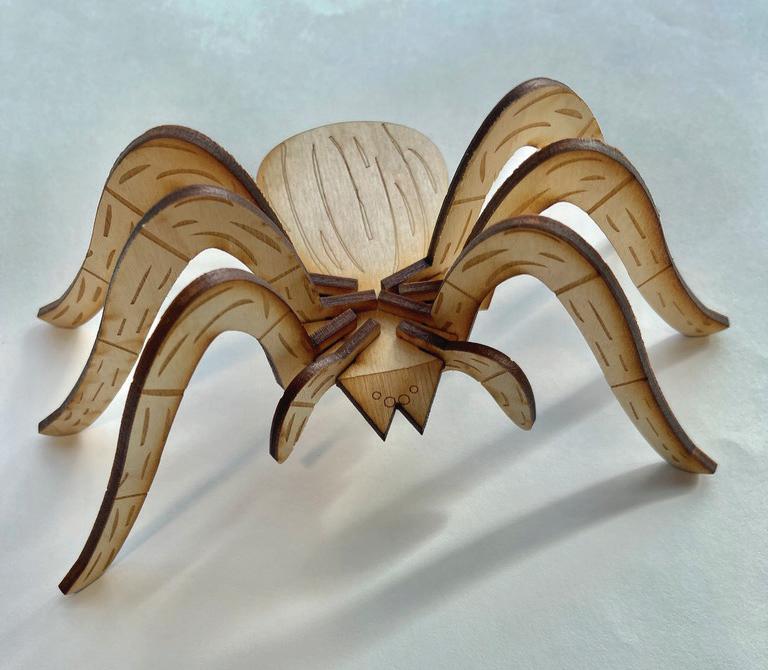
25
Anna Sullivan Webster
warmth in his chest that seemed to cloud his lungs from breathing properly. He did the dishes for his father. Delicately he put each plate back on the shelves but flinched at the irritating clatter that they made against one another no matter how gently he tried to place them. He drifted away from the kitchen and heard his mother sit down to play the piano. But she was playing too loudly, the sound jarring to his ears.
His bugs gave him comfort as he lay in his bed but the warmth was still there, and in fact growing warmer. He thought of his father who was still sprawled weakly on the couch. And of his mother who was playing harsh notes that flooded into his room and mixed with the scent of decaying cabbage. His tongue began to run back and forth on the inside of his cheeks and his teeth closed around each other firmly. He stood up to look in the mirror to calm down and then returned to his bed and looked over at the enclosure of his beautiful mantis. It was peaceful—roaming around its tank blissfully unaware of Jimmy’s anger. For the first time, Jimmy resented the bug. Its color that now reminded him of cabbage and its face that was ugly and noseless. The way the bug was trapped in a glass box, and perfectly content with it. Jimmy shifted in his bed to reach over. He let the creature crawl onto his hand and his hair raised at the feeling of feet tickling his skin. He put the mantis down and watched. Watched as it stayed still. Watched as it did not run off or catch a bug or attack. It depended on Jimmy. So Jimmy felt his chest become hot. He felt his fists become tight and his cheeks red. Then he smelled nothing at all, saw nothing at all, heard nothing at all, but felt as his fist came down on the creature and a cool liquid coated his knuckles. The bug was very still now, more still than it had been previously, completely still. It was stiller than his father on the couch, stiller than the thick silence in his room. And Jimmy felt his anger slip away, but it was replaced by eyes widened in fascination. He could not look away. The legs of the creature were lying delicately next to its torso in a jumble of beautiful green. Its eyes closed peacefully. The only blood was smeared in a soft line against the side of Jimmy’s knuckles and it was not green or red, but brown— as if all the colors in the world had come together and mixed into one. Jimmy’s eyes were wider now. Suddenly he became aware of the over-salted mashed potatoes causing the unimaginable weight that was lodged in his stomach. Jimmy turned back from the cage and lay down in his bed. Curling tightly into a ball, he began to shake.
26
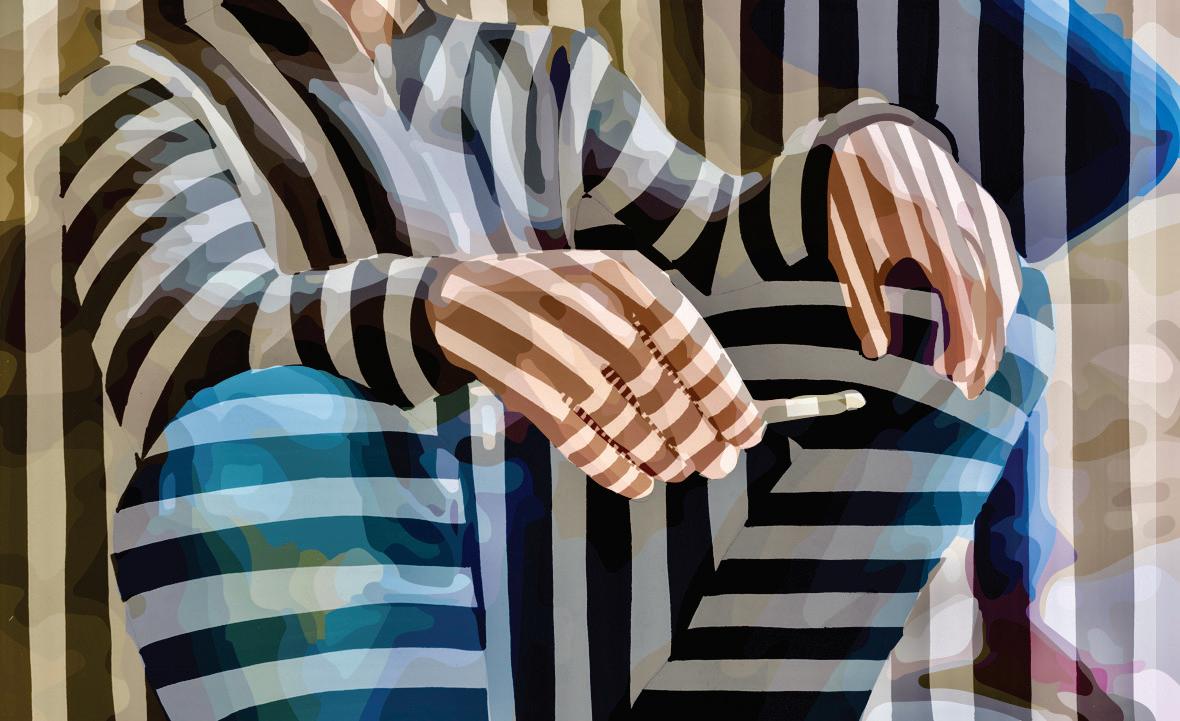
 Callie Hammond Prisoner of Addiction II
Callie Hammond Prisoner of Addiction II
27
Callie Hammond Prisoner of Addiction I

28
Zara Kurbanov Mirror, Mirror
Surprise Gift
Grace Genereux
A blur of children in plaid pajama pants stampedes down the stairs, and a sprinkling of lights flicker on around me. Excited voices fill the den as people stare at me and my friends before proceeding to rip open the skirt of presents surrounding us. Squeals of delight fill the air as new toys and clothes are opened. The gingerbread cookies release a warm and spicy aroma, and the sweet, fruity scent of the Jones’ pies lingers for hours. It’s a nice counterpoint to the inescapable pine. When you’re stuck on this tree for a month straight, the smell of Christmas gets old.
Kate spends the next few minutes neatly arranging her new clothes for her doll, and Jessie gawks at his shiny Xbox remote. They’ve gotten so big! Jessie finally has the braces he’s been worried about since last year, and Kate’s grown out her hair.
After everyone opens their presents, Dad circles the room with a bag for the torn remnants of wrapping paper, ribbon, and bubble wrap strewn across the floor. Every single year. Without fail.
Slowly, the noise in the den dissipates, and everyone files out into the hall. Voices drift to the dining room, and we’re finally alone. The tree’s lights remain on, but we know they won’t for long.
“When do you think we’re off this year?” Felt Rudolph says from the other side of the tree. “Let’s place our bets early this time. Over or under… two days?”
“Over,” I say. “Taking everything down took a while last year. I’d like to think we can get back to the attic sooner this time, but I just don’t think that’s the way things operate around here.”
“I agree with over,” say a few other voices.
“I’ll go with under!” shout more, and the debate continues. Suddenly, we hear the side door open. As I attempt to swing myself below the branch for a glance at who is coming in, I hear them whining again.
“Grandma! Grandpa!” Jessie and Kate shout from the kitchen. An older woman and man step out into the hallway with their arms outstretched for a hug. The family rushes downstairs in a commotion of steps and excited screams, falling into a big embrace. I knit my brow, confused. I hear curious whispers and quickly shush my friends to hear the conversation.
29
“We brought a special present…” says the old woman. Behind her, a fluffy animal scurries into the den. It’s golden, with floppy ears, little paws, and a tail that keeps moving back and forth.
“A puppy!!!” the kids yell. Their faces light up as they chase the animal into the den. Meanwhile, Dad stands in the hall rolling his eyes. It bounds this way and that, clawing at the carpet and hopping on the chairs. Finally, it does something that especially shocks me. It licks Jessie’s face! It rubs slobber and slime all over their cheeks, but oddly enough, it doesn’t seem to upset him. Believe it or not, I think they’re enjoying it!
Dear God, what is this animal!
“Let’s go up and get toys for him!” they all say and sprint up the stairs, leaving us with the foreign furry creature.
I stare at it, the puppy or whatever it’s called, and it stares right back at me. On the tree, everyone is frozen. No one says a word. We’ve never seen an animal so weird and so happy to see people. Every Christmas is the same for us; we never get a surprise like this. The puppy begins sniffing the ground, scrutinizing the carpet. He walks around the room, gaping at and sniffing anything he comes across. Finally, someone on the tree speaks.
“Do you think it could hurt us?” At the sound of the voice, the puppy looks in our direction, and he cocks his head.
“I wouldn’t worry,” I say, but my voice shudders. “He was nice to all the people! Why wouldn’t he be nice to us! It’s just weirdlooking in my opinion. I don’t understand why the family is so into this thing.”
Stepping closer to us, the puppy starts sniffing the base of the tree. He circles around and around, studying the branches, the lights, and all of us. He moves his head upwards, brushing the branches with his nose. He starts to back away for a second, but then jumps up and nips at a branch.
“Whoa!” we say. The tree rocks back and forth a little, but eventually settles.
Phew, that could’ve been close. Then, I see the puppy has a section of the string of lights in its mouth.
It must have pulled it down when it nipped at the branch. If that puppy pulls on the lights, this whole tree could come down. The silence from the rest of the tree lets me know everyone else gets that message too. I see Rudolph anxiously twitch out of the corner of my eye, and hear Santa’s quickened breaths.
It looks right at me, those big brown eyes studying me closely,
30
almost daring me to make him drop the lights. I don’t have that kind of power, so I plead with it, but the puppy just cocks its head again, almost confused at my request. The family grows louder upstairs, drawing the puppy’s attention. It drops the lights, and we exhale a sigh of relief.
As the puppy takes its first stride towards the hallway, its paw snags on the string of lights and I feel us lean towards the ground. It’s a slow lean at first, with just the top of the tree moving. Then the middle of the tree starts to feel it. The branches rustle and shake together, and I just pray my hook stays secure. I look up, feeling the tree begin to fall faster, and the wood planked ceiling comes into view. Air whooshes past us, and I hear the string of lights pop out of the outlet. As we plummet towards the carpet, I close my eyes and pray it won’t hurt.
Crash. I peel my eyes open slowly. Glancing around me, I see the carpet I’m lying on, many of my friends, and a pair of big brown eyes. I shut my eyes and brace for whatever it will do to me, but all I feel is slobber. For a second, I’m disgusted. And then I start to laugh. It kind of tickles! The family rushes in and begins to pick me and the rest of my friends off the floor. Thankfully, no one is injured. After all, we’re stuffed.
31
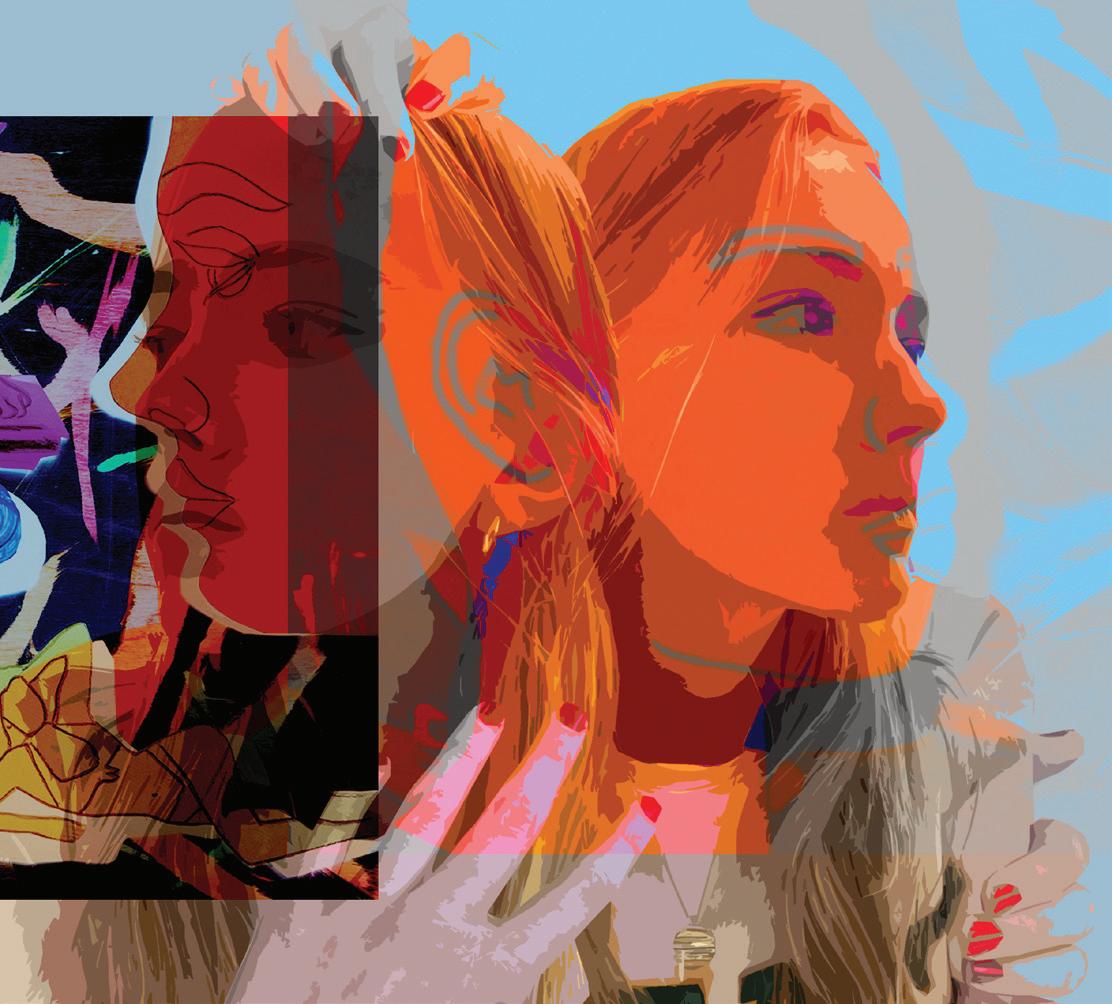
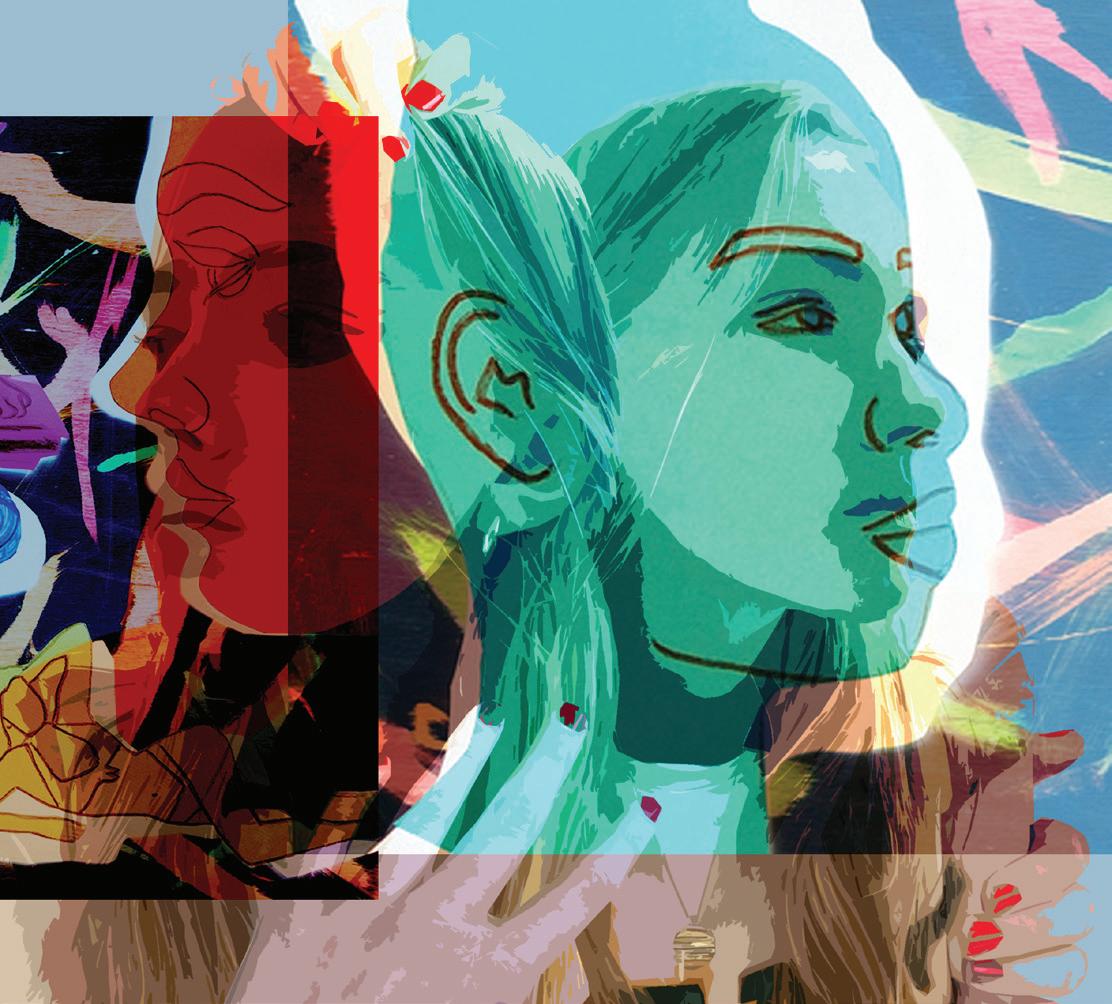
32
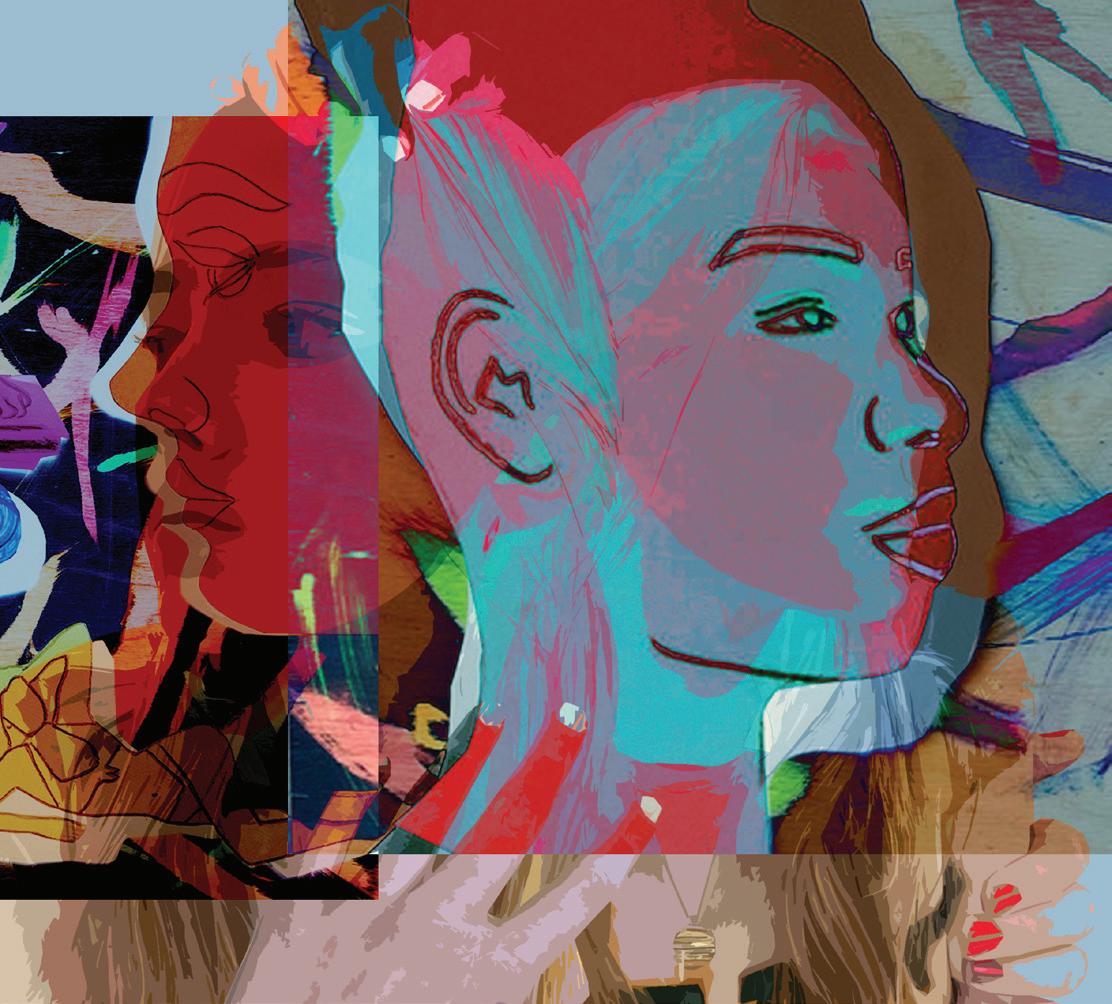

Perception 33
Katie Hawks
Upon a Verdant Country Hillside
The clouds resemble something from a dream I had. When did they roll in?
A breeze commences. Why have you started to dance? The wind moves your hips.
A sonatina of some sort. Leaves rustle now. Let the music play.
My feet crush flowers, the soil sticking to my skin. I must clean my toes!
Did you call my name? I am embarrassed. The leaves caught my eye, rain-soaked.
Warmth thaws the branches. Although our treehouse has tired out, we haven’t aged.
Alessia Cutaia
Raghavan In Bloom 34
Sara

Tennis Boy Struggles
Katie Nichols
What’d you do over the summer? I went to Wimbledon… as a participant, actually… yeah, I know… unfortunately, it’s not that cool… well, if only everybody else thought like you!1
Sure, this joke of a high school team is pretty lucky to have me, but when I get up there with all the pros, forget it. What they hoped would be the 128th seed in their tournament tripped walking across his living room and fractured his ankle. Rumor is there was nothing in his way—just a patterned rug. Sad. Then they called me! Well. I weaseled my way in, lost my very first match, and missed every first serve—my own and the 127th seed’s.2
Still, this September should have felt different. Over the years, my shoulders have slightly curled into my body. I thought maybe they’d finally perk up a bit, sort of subconsciously, I guess. But I looked the same as always in the mirror this morning, standing there in my collared shirt and tiny khakis. I kept telling Mom that she couldn’t really expect me to show up like this, looking like the seventh-grader I once was, who’d grown another painful three inches over the summer. But no. She was completely serious, and so embarrassing.3
Maybe, I kept thinking, it was just this simple—nobody knew about my casual summer trip across the ocean. But everybody knew. That was exactly the problem.
They were jealous!4 I wish. Sure, it is humiliating to lose as epically as I did. But this is not what they taunt me with when they shove my Nightmare-Before-Christmas body into their lockers.5 It’s because I play tennis. Tennis! Not football, not soccer, tennis. I
1 My side of a conversation with our neighbor, Mrs. Lancaster, who I talk to because I want her to keep sending us cookies in a holiday tin every December. No, I definitely don’t actually like this retired grandmother who gardens with her mini dachshund on Sunday mornings.
2 You know what? I’m fine. I am. We don’t have to talk about it.
3 Yes, I know she still comes down to my room before bed to say, “Goodnight, I love you.” I know I still need that nightly hug. Of course I would never want her to stop, but she is so embarrassing.
4 No, they aren’t, Mom, thank you.
5 Who chose metal? Who? Why can’t they be cushioned? Upholstered? Padded for my sore curled shoulders?
36
hate tennis. I’m thinking of quitting.6
It’s all Todd’s fault. He plays football. He returned to school the summer before sophomore year with the fresh haircut I wanted,7 and the same pair of gray eyes that the girls have been talking about ever since. All he had to do was lose the fat in his cheeks, chisel up that jawline, and get ridiculously tan/freckled in Cancun for them to notice. They squeak over school pizza about their particular hue—like a cloud glows with the sun behind it on a gloomy day, the shade of a skyscraper glimmering in the late afternoon. Suddenly, Cordelia, Andromeda, Sofia, Tabitha, Leonora, and Emma8 no longer remembered the Todd they laughed at when he stumbled to receive his diploma at fifthgrade graduation, didn’t remember the Todd that baked his own birthday cupcakes in the eighth grade, the Todd that wore his grandfather’s old hunter-green sweater through our cold Januarys, the Todd I have been pretending to be friends with long before That Fateful Day in Second Grade. But they did fall for his eyes. I hate Todd. He plays football.
And I couldn’t care less about the incessant swooning of Cordelia or Andromeda or Emma…but not Sofia. Sofia, I care about. Sofia, I’ve been in love with since That Fateful Day in Second Grade, when I asked her for a yellow crayon to complete the sunflower on my mom’s birthday card, and she handed me a blue marker. Sofia is by far the prettiest girl at our tiny private school in protected suburbia, but my love for Sofia is about so much more than her looks.9 Finally,10 I’ve seduced her. I am her best friend. I’m practically CASTLE’s newest edition, so close to revealing my feelings and taking our relationship to the next level.11 But Todd. It’s all Todd’s fault. Sofia has a massive crush on him; she’s so obsessed that she’s stopped talking about how hot our 37-year-old married-with-two-daughters math teacher is. I hate Todd. He plays football.
6 No, I’m not thinking of quitting. Does it suck that I’m too good for the best amateurs and too bad for the worst pros? Yes. Have I spent countless hours and energy and headspace consumed by this fantastic racquet sport? Also yes. That second answer wins.
7 Thanks again, Mom, for curtailing that dream.
8 Otherwise known as CASTLE or 6-end-in-As. They wear orange on Wednesdays.
9 I love her hair, and her pointy eyebrows, and her lips, and her green eyes.
10 FINALLY!
11 I’m not stuck in the friend zone. I’m not. Don’t tell me that. You’re wrong.
37
So we went to the big homecoming game, right? I should have been practicing my serve,12 but I met CASTLE there anyway. Everyone was already screaming,13 but when Todd scored his second touchdown of the night, Sofia really went wild. I couldn’t handle it anymore, to be by her beautiful side, watching those gorgeous green eyes light up for another guy. I had to take a breather.
So I was resting my arms on the fence behind the sidelines, right? Todd scored yet another touchdown,14 and the rival coach looked so frustrated that I think ours took him off the field just to be nice. It was right when he pulled that helmet from the haircut I wanted, his eyes as stormy as ever, that they brightened up. He was looking at someone on the bleachers, and my heart sank.15 But—no, that wasn’t right—he was looking at me.16
So he was waving, right? And I was waving back, right? Watching Todd, the Todd that wore his grandfather’s old huntergreen sweater, the Todd I laughed with while tracking the growth of our precious plants in chemistry class, the Todd I told about my stupid love for Broadway soundtracks17 in the wings of the auditorium during our seventh-grade nativity18 play. And I was looking back, too, at those gray eyes I noticed on the very first day of kindergarten. And Sofia was my best friend. And I didn’t hate Todd.
12 England knows it…
13 Which is my thing, right? Who doesn’t love a good loud, sweaty, obnoxious crowd of drunk teenagers?
14 While I should’ve been perfecting yet another forehand shot…
15 Sofia! NOOOOOOO!
16 Panic. So much…panic?
17 Thanks again, Mom, for that one.
18 I was a dancing rock. He was a sheep. Also dancing, of course.
38


Jake Minella Happy/Angry; Angry/Sad 39
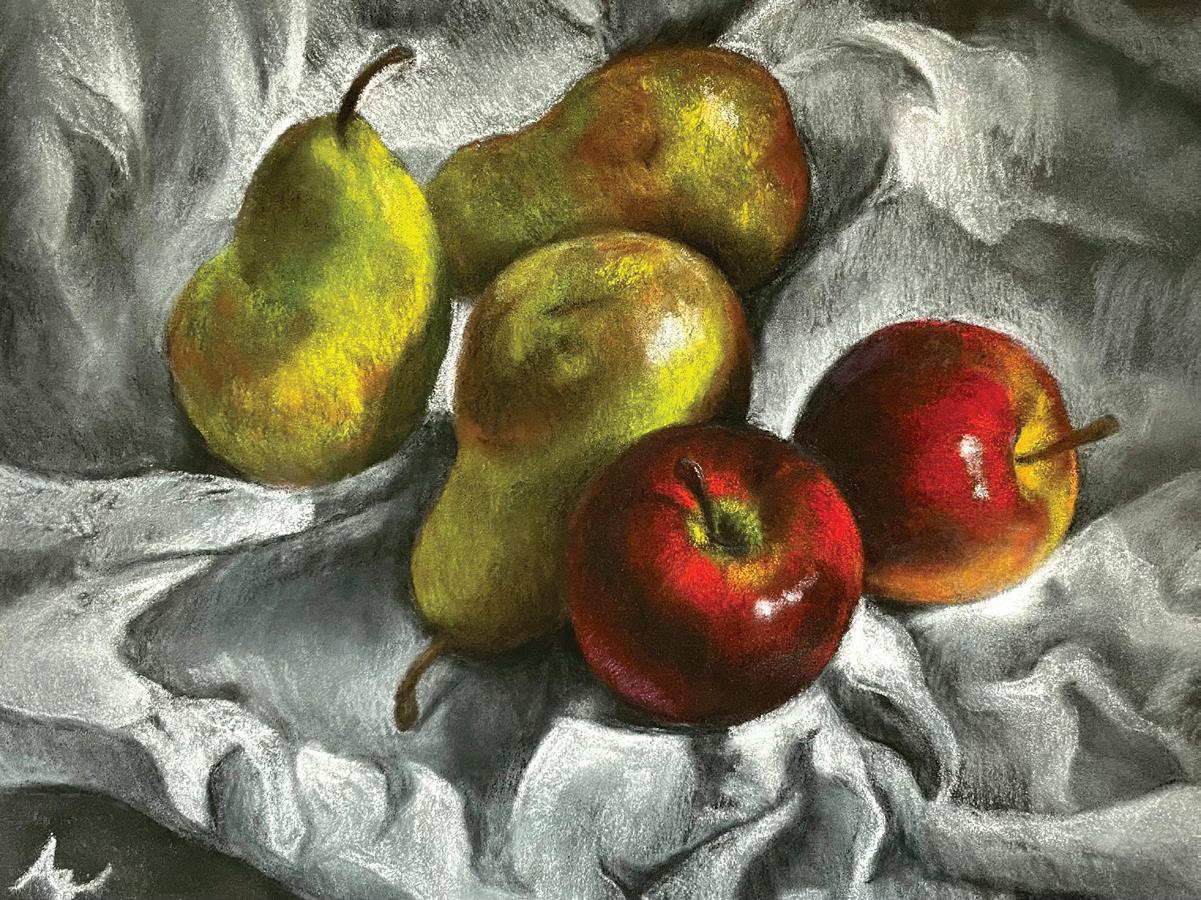
 Alicia Qin
Apples and Pears
Alicia Qin
Apples and Pears
40
Nina Herceg An Ode to Youth
Simple Summer Mornings
A creeping sun glares into a quiet kitchen. The kettle hums, scrambled eggs sizzle. Faint guitars whisper out of the stereo. One by one, bed-headed children Race down the creaky stairs
With curious eyes and wide grins. Their mother sends them outside. In the yard, they frolic, they squeal, Playing tag, and chasing a sticky soccer ball, While their father sits at the picnic table. He reads the morning paper, Glancing periodically at his children in Adoration. The youngest swings On a tired tire swing, Contently watching the others until Her mother calls them in for breakfast.
Libby Nook
No one in the family knew, then, How much they’d long for another Simple Summer Sunday Morning. Because curious-eyed, wide-grinned, bed-headed children Don’t stay children forever.
41
Labyrinth

Labyrinth Labyrinth Labyrinth Labyrinth Labyrinth



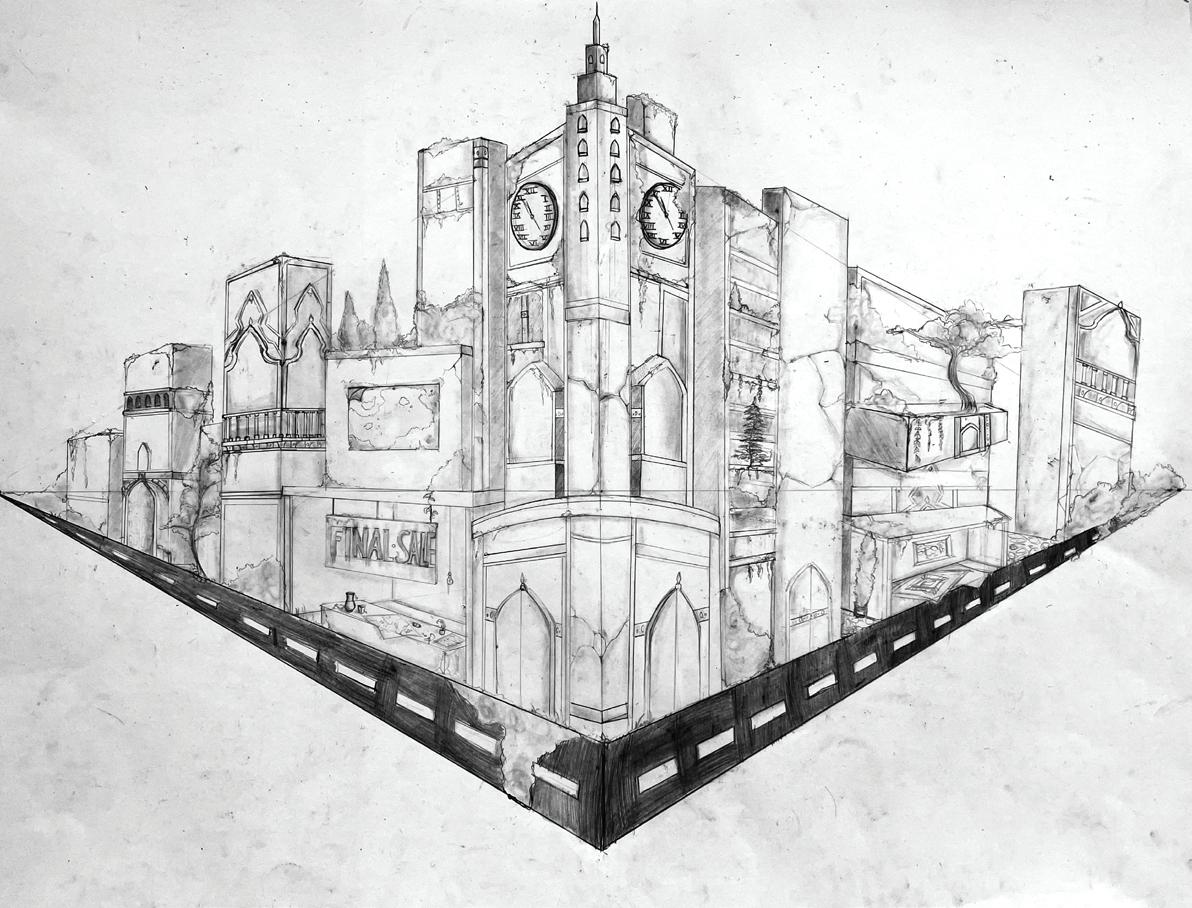
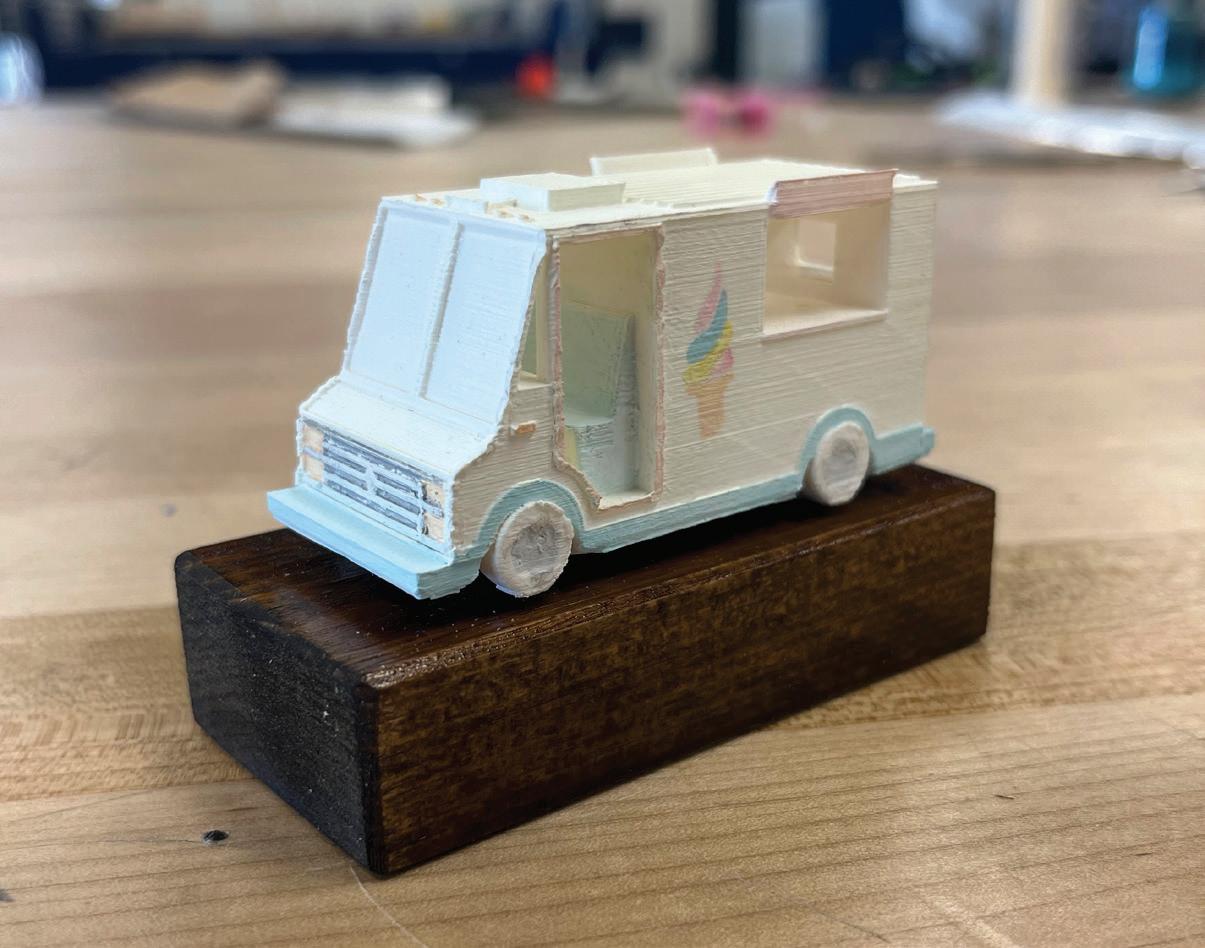 Sarah Li
The Ice Cream Man
Izzy Hartman
Sarah Li
The Ice Cream Man
Izzy Hartman
44
Crumbling City
A Mail Truck’s Path in Variable Delight
X is the hardest neighborhood
For the mail truck of Variable Delight. There is just one type of letter That saves its boxes from their plight.
To Y, the truck brings anything— From parabolas to lines to cubes A Y family loves a circle, But it can also welcome a tube.
After tumbling out of Y With squiggles drawn on its tires, The mail truck takes a sigh As it slowly reroutes its wires.
For it’s heading now to X, Where it can only bring one value Such as one, two, or three... But nothing that would wow you.
The X families take a 7 And use it as a centerpiece But during dinner they stare at it, And they call that simplicity peace.
Meanwhile, downtown in Y, Absolute functions are v-shaped slides And as the Xs sit with a 2, The Ys are on endless rides.
So be a Y and not an X, And life might treat you well. For you’ll talk to different types of people And Y, not X, will sell.
Natalie Cook
45
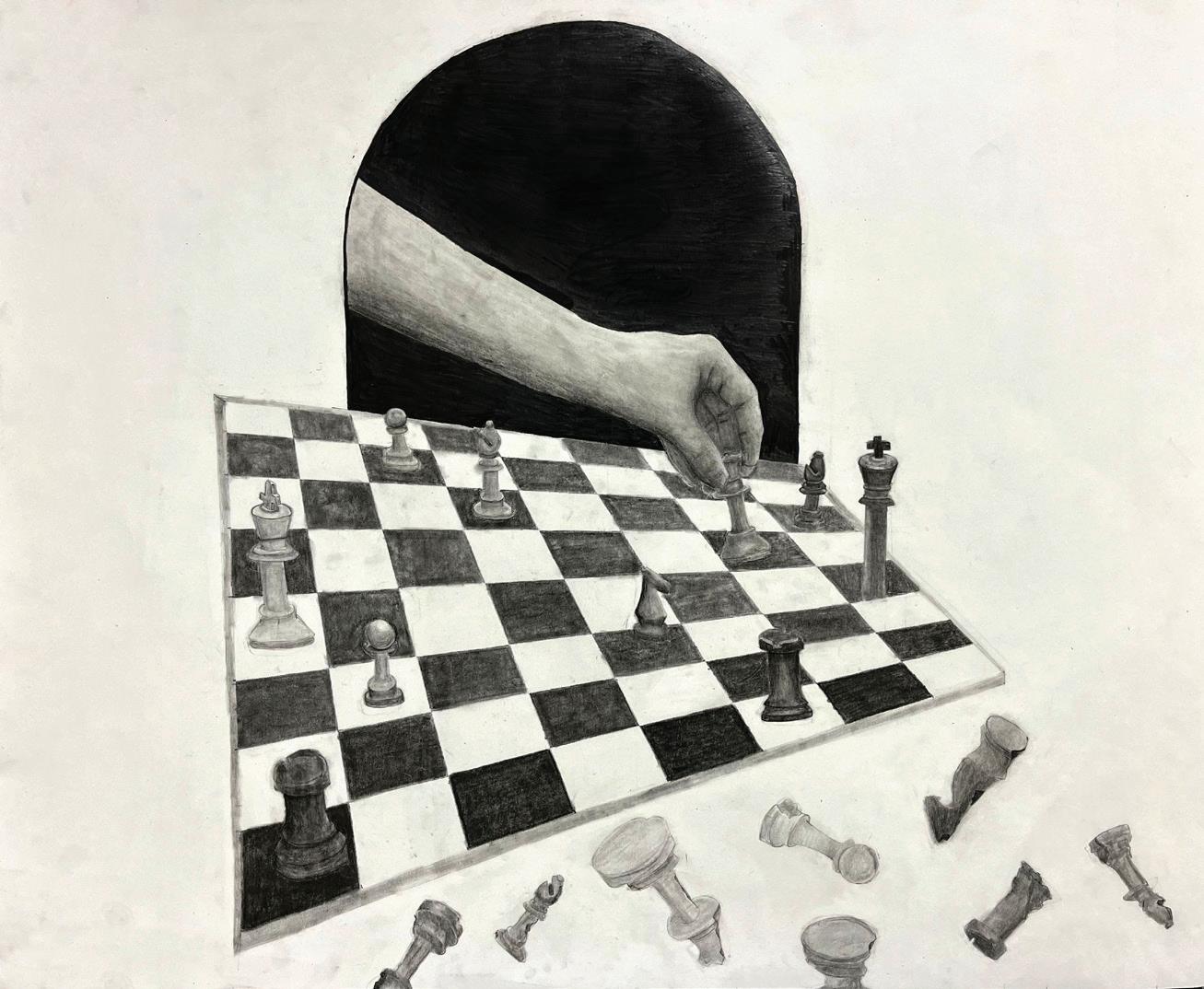
46
Victoria Batres Jaque Mate
The World According to Karl
Scarlet Fishkind
In December of 2003, Karl Prentice, the newest member of Seattle’s Chess Association, walked into the National Chess Tournament. Karl had been a chess champion since he was thirteen and three quarters. Of course Karl remembers this exactly—it was his first competition, held at his Junior High, when he beat Christopher Cardella with his rook. Although Karl doesn’t consider himself religious (his family is Roman Catholic), he recognizes that day as a second baptism, the moment when he was reborn with a passion and purpose in life.
As a young lad, Karl was never really good at anything. Well, it wasn’t the fact that he wasn’t good at anything, he was just never content with anything. Upon trying soccer, Karl concluded that he could never focus on the ball when there were screaming teammates and girls gawking at his team from the bleachers. So he decided to choose a more independent sport, which led him to golf. However, Karl quit the team when he found out that someone else, a person who was not talented at golf whatsoever, had to follow him around with his clubs and make small talk. Destined to find a sport with no interaction required, Karl stumbled upon cross country. Karl was quite good at cross country. He ran a 5k at a 5:52 pace, accelerated up hills without gasping for air, and did not have to converse with anyone but his internal voice. The only thing that Karl couldn’t deal with in cross country was the shorts. “Those damn shorts,” Karl would say in a later interview with the Seattle local news after earning first place in the city-wide 10k. “They made me feel like my genitalia was having a conversation with the whole world, for crying out loud.”
After attempting most of the sports that caught his eye on the school directory, Karl decided that it was time to demote himself to the next tier of hobbies: clubs. Therefore Karl turned to chess. It was the first club that interested him while meandering through the Patrick Henry Junior High Clubs Fair. He was only a ninth grader, and all the booths were yelling, chanting their club name and holding up information waivers as if their life depended on the amount of people who signed their name on a clipboard. But not the Patrick Henry Chess Club. The only kid behind their booth was Jacob Satfield, a junior with a buzz cut and a freshly pressed Tommy Bahama Hawaiian shirt. Jacob Satfield didn’t yell or hold
47
waivers. In fact, Jacob Satfield didn’t really do much at all. All he muttered was “Chess Club! Chess Club! Chess Club! Chess …” and so on, like the film through his movie projector was jammed. On this infinite loop, Jacob Satfield molded to his plastic cafeteria chair and stared into the sea of teenagers. Led by what he would later say was fate, Karl approached Jacob Satfield and signed his name, Karl Prentice, in cursive on the clipboard.
To everyone’s surprise, Karl didn’t fall out of love with chess. Amazingly, there were no shorts to steer him away, no caddies to mimic his shadow. The only problem Karl faced with chess was practicing. Although he read all of the books about chess in the library and watched most of the professional competition videos on his mother’s Apple Macintosh, Karl found it difficult to improve when no one seemed worthy enough to play with him. During chess club practices, Karl occasionally scrimmaged with Jacob Satfield, but found it useless. How can I improve, Karl thought, by playing a kid with a buzzcut in a Tommy Bahama Hawaiian shirt? So, smushed in the corner desk of his room, Karl learned how to play chess with himself. He would make a move, brainstorm what he would do to retaliate, and then continue from there.
The titles that Karl received in chess grew with his height. When he played against the other clubs in the Patrick Henry High regional league, Karl almost always received a handshake and medal from an old white man. Nothing could break his focus on the movements of a pawn or bishop. Of course, when his father passed away, Karl had to take a physical break from chess to plan the funeral with his mother. And there had been Matilda, a girl he met in his biology seminar senior year. While removing his personal protective equipment, Matilda approached Karl and asked if he wanted to work on their lab report back at her house. That Friday night, Matilda kissed him while discussing phospholipids and their properties. Karl removed his lips from hers and told Matilda he would learn about the phospholipid bilayer on his own. On the walk back to his house, Karl decided not to be in an intimate relationship with Matilda. Sure, she was attractive—he liked how she always wore red Mary Janes with off-white tights and how she blinked when someone called her name. But the romantic bond between two individuals was too fluid, too unpredictable. Even kissing her was difficult to understand; how would he know when to turn his head, push up against her, or pull away?
When he graduated from Patrick Henry High, Karl joined the Seattle Chess Association. SCA held meetings on Tuesdays,
48
Thursdays, and Sundays. In these meetings, members prepared for their upcoming tournaments, analyzed famous games and moves, and ate soggy turkey clubs. For the first time, Karl would compete against the old white men that gave him handshakes and medals in high school. However, Karl thought it was stupid to go to the SCA meetings on Tuesdays, Thursdays, and Sundays. I have myself, my corner desk, and my chess set, he thought. Why do I need anything else?
After graduation, Karl moved into his own apartment. While walking to the tailor to pick up his dry cleaning, Karl stopped and viewed a sign that was hanging off the grimy patio above him.
It’s about time I live on my own, Karl decided. So he rang Harrison “The Officer” Ziegenhagen on the rotary phone in his father’s study. “Hello, this is The Officer,” said Harrison Ziegenhagen, in a thick Swedish accent.
“Hi, Mr. Ziegenhagen. I am Karl Prentice. You may know me, you may not. I play chess for the Seattle Chess Association, on the corner of Franklin and 4th Street.”
“I know the place,” said The Officer.
“I am calling in response to your sign—I would like to invest in an apartment in your building. I can walk over there and give you the money right now if you’d like.”
“Meet me there in 15. And would you call me The Officer, please.”
APARTMENTS AVAILABLE CALL HARRISON “The Officer” ZIEGENHAGEN, FOR MORE DETAILS
And so it was. While walking into his new home, Karl was instantly reminded of the smell of the Patrick Henry Junior High Clubs Fair: upper lip sweat and anxiety. The radiator creaked like a small bird (maybe a sparrow) was stuck inside, and the natural must made Karl’s glasses fog up. There was a Playboy stuffed behind the cupboard, and the blinds had become shelves for dust bunnies. It was perfect. However, what Karl didn’t notice was that the apartment was extremely small. The apartment was more than small: it was teeny. In fact, it was the smallest apartment in all of Seattle. But Karl didn’t mind. He had his corner desk and his chess set, and that’s all he would ever need.
49
One morning, while preparing for the National Chess Tournament, Karl’s mother formally invited Karl to have lunch with her. As they sat in his father’s old study and nibbled on shortbread cookies, Karl’s mother told him that she was worried. “I want you to take a break from chess, spend some time outdoors and maybe pick up a hobby. Have you ever tried running or hiking?” But Karl didn’t hear any of these remarks, as he was too busy focusing on the chair underneath him. This might be the most comfortable chair I have ever sat in, Karl concluded. When he left lunch with his mother, Karl went straight to the Seattle Public Library and discovered that the chair was called a Barcelona chair. To his disappointment, however, Barcelona chairs were typically 58 feet long. His apartment was 54 feet long. Well isn’t that a shame, Karl thought, as he walked back to the corner desk in the smallest apartment in Seattle.
In December of 2003, Karl Prentice, the newest member of Seattle’s Chess Association, walked into the National Chess Tournament. Karl had been awake since 5:42 AM. He stepped into his freshly dry cleaned brown blazer and ruby red tie, combed back his blond tuft of hair, and headed off to the corner of Franklin and 4th Street. He was to play Memphis Thwaites, the Idaho state champion, and indeed, an old white man. Walking into the Seattle Chess Association building, Karl was stunned at the amount of people there to watch his match. The crowd reminded him of the girls on the sidelines of the soccer field in Junior High. Karl shuddered and focused on the game at hand. He sat across from Memphis Thwaites, and began.
Karl soon realized that he was not playing in the corner desk in the smallest apartment in Seattle. He was not sitting in the comfort of the 58-foot Barcelona chair, and he was most definitely not across from Jacob Satfield in his Tommy Bahama Hawaiian shirt. He felt a deep burning inside his chest, and, unable to move his pawn, Karl stood up, turned around, and hastily left the building of the Seattle Chess Association for the first and last time. Descending into the pouring rain, Karl realized that there was no Patrick Henry Junior High directory to tell him what to choose, no clipboard to sign his name on, no tier to be demoted to. His face stung and Karl began to accelerate forward with increasing speed. The infinite loop of inching rooks, pawns, and bishops had finally reached its end, and for the first time in his dull 22 years of life, Karl thought of nothing but his shuffling feet underneath him.
50
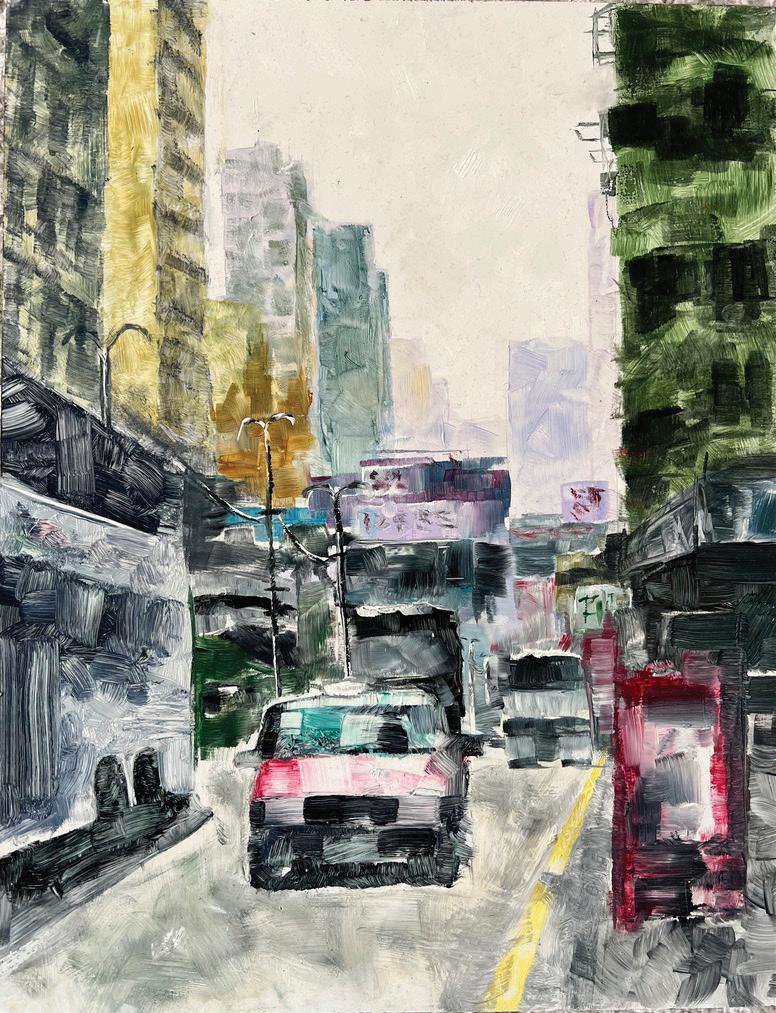 Elena Schmedlen
Elena Schmedlen
51
Traffic
Pass the Salt
It happened when she asked her grandparents to pass the salt at dinner
She sensed it as the thought formed and metamorphosed into sound when she asked her grandparents to pass the salt at dinner
It was faint
Perhaps it had been lingering for longer
Joyce Huang
Maybe thanks to some form of cruel divine intervention she only noticed it when she asked her grandparents to pass the salt at dinner
A distinctly American curl of her tongue
The once-familiar words tasted so foreign She didn’t sound Chinese anymore when she asked her grandparents to pass the salt at dinner
Honestly she should’ve expected it sooner
It was a bitter miracle that she only noticed when she asked her grandparents to pass the salt at dinner
ABC
A phrase referencing such a simple pattern
An identity which is not-so-simple unraveled in a second as she asked her grandparents to pass the salt at dinner
52
It was all in due time Obviously she would eventually become more A than C She supposed it just didn’t sink in until she asked her grandparents to pass the salt at dinner

53
Joyce Huang Citizenship
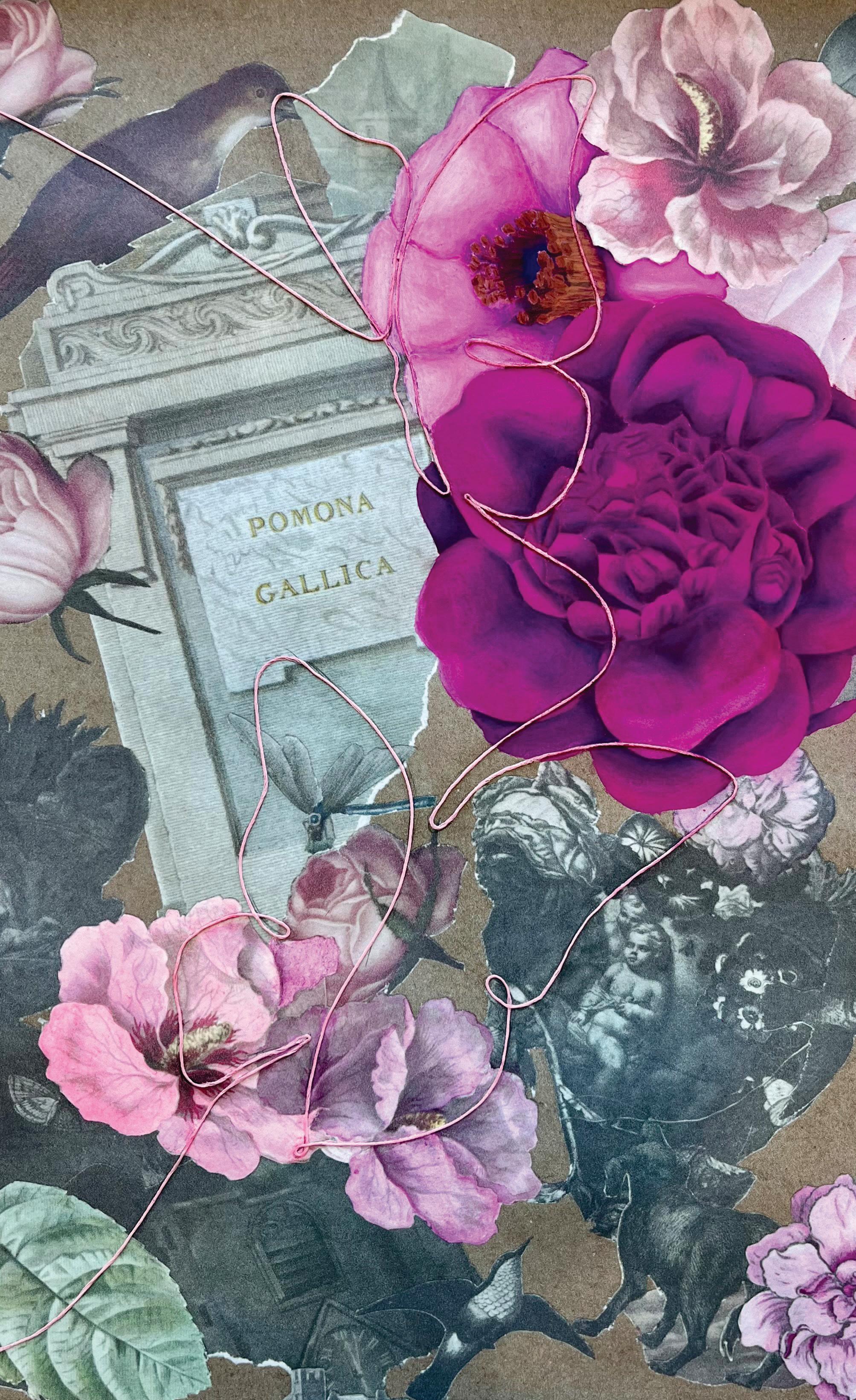
The Final Flower on the Bus to Runeberg
Tara Salli
It had been nearly seven years since the little florist shop on the corner of Flannery Street had burned to the ground, and whenever Keira’s bus passed by, she could still see the remnants of the pale, mint green walls lying on the ash-ridden ground. As the seasons passed, she watched as a layer of snow covered the pile into near obscurity during the months of January and February, for it had never snowed on Christmas during all 17 years of her life in Runeberg. And during the brief summer months of June and July, small children dressed in gravel-dusted denim overalls, handed down from a line of older siblings and cousins, would use the broken pieces of wood as swords, as they fought each other to see who could rule over the feeble pile of scattered wood that still held on to its pale-green shade of discolored reverence.
As the bus continued on the last leg of its route, it passed Stonehenge, a pub that resembled nothing of its namesake, for it radiated drunken laughter and boisterousness with a distinct stench of craft beer and booming music. No, Stonehenge was a haven of drunken sorrow and dimmed liveliness that went there to drown themselves once and for all, never to resurface again.
Keira could always tell who had drowned themselves. She watched as their remaining silhouettes staggered onto the bus in the morning—or more like afternoon, for by then she had already been let out of school—with mauve colored eye bags, dragging along the aisle in pace with their hungover reel. And she watched those same, empty silhouettes hop off at night, absent from the remainder of the world around them, stumbling, and catching themselves at the door of the bus at the very last minute, hanging on to one of the stained metal railings, clinging on to whatever force still kept them up at night.
By 15:31, the sun had already set, and thus Keira continued on her mind-drooling ride back home from school, staring out the window next to her seat on the now empty bus, surrounded by nothing but vast darkness all around her. The street lamps on Flannery Street hadn’t worked properly for years, and when they did, they illuminated the snow in a dark shade of mustard yellow, and so Keira preferred them when they were out.
Drawing closer to Keira’s stop—the terminus of the bus route, and only a couple stops after the florist shop—a graying windmill, missing three quarters of its blades, stood precariously on the top of a grassy knoll, the yellowed canvas of its final blade, feebly flapping
Ava VanMoorsel Aphrodite’s Garden
55
along with the faint February wind. Behind it sat a distorted redbrick building with a hole in its front-facing wall, the size a curious five-year old child could easily squeeze themself through. The padlock to the cedar wood doors was nailed shut, although that had never stopped thrill-seeking teenagers from entering.
The building had once been a theater, or so the town’s older residents claimed, for nothing about the cigarette butts and broken Guinness bottles that claimed the ground beneath resembled any sign of productive creativity to Keira.
Only two stops away from where Keira would be getting off—just like she had done every day since the first grade, where her grandmother would be waiting for her in one of the stacked, popcorn-yellow buildings, differentiated from the rest solely by the emblem 7B and the distinct graffiti that all the towns residents cursed and cried over yet never took any initiative to repaint—Keira now sensed the bus come to a halt.
Only one person hopped on—the same elderly woman who had done so from the days Keira still hauled around her oversized Pokémon backpack, handed down from her older brother, who had long since escaped the drowning depths of Flannery Street. Keira continued staring out the window of the bus, when the stout woman disturbed her lolling gaze, as she sat down plumply on the seat next to Keira’s. They were the only two left on the bus. After a brief moment of still silence, the woman spoke:
“You know, it’s a real shame what happened there,” pointing her gaze towards the pile of pale green wood that was still faintly visible in the distance.
“We really ought to do something about that.”
Keira nodded her head slowly, not turning her eyes away from her reflection in the window. The bus jerked into motion once again, turning the corner before the final stop, the pile of mint green wood disappearing from view.
Keira tried to remember the last time she had been to the florist: how the petite, hearty old lady had handed her a bouquet of lilacs to give to her grandmother for Mother’s Day. Keira closed her eyes to smell the bouquet of flowers, but her nostrils burned instead with the heavy stench of rotten cigarettes and forty-year-old discount perfume sitting next to her.
“Yes,” she sighed, staring blankly out into the darkened abyss. She saw nothing in her reflection but the outline of her long, pinstraight hair, draping over her hunched shoulders, and as she spoke, her words carried the weight of the clouds in the clear, darkened sky above. “We really should.”
56
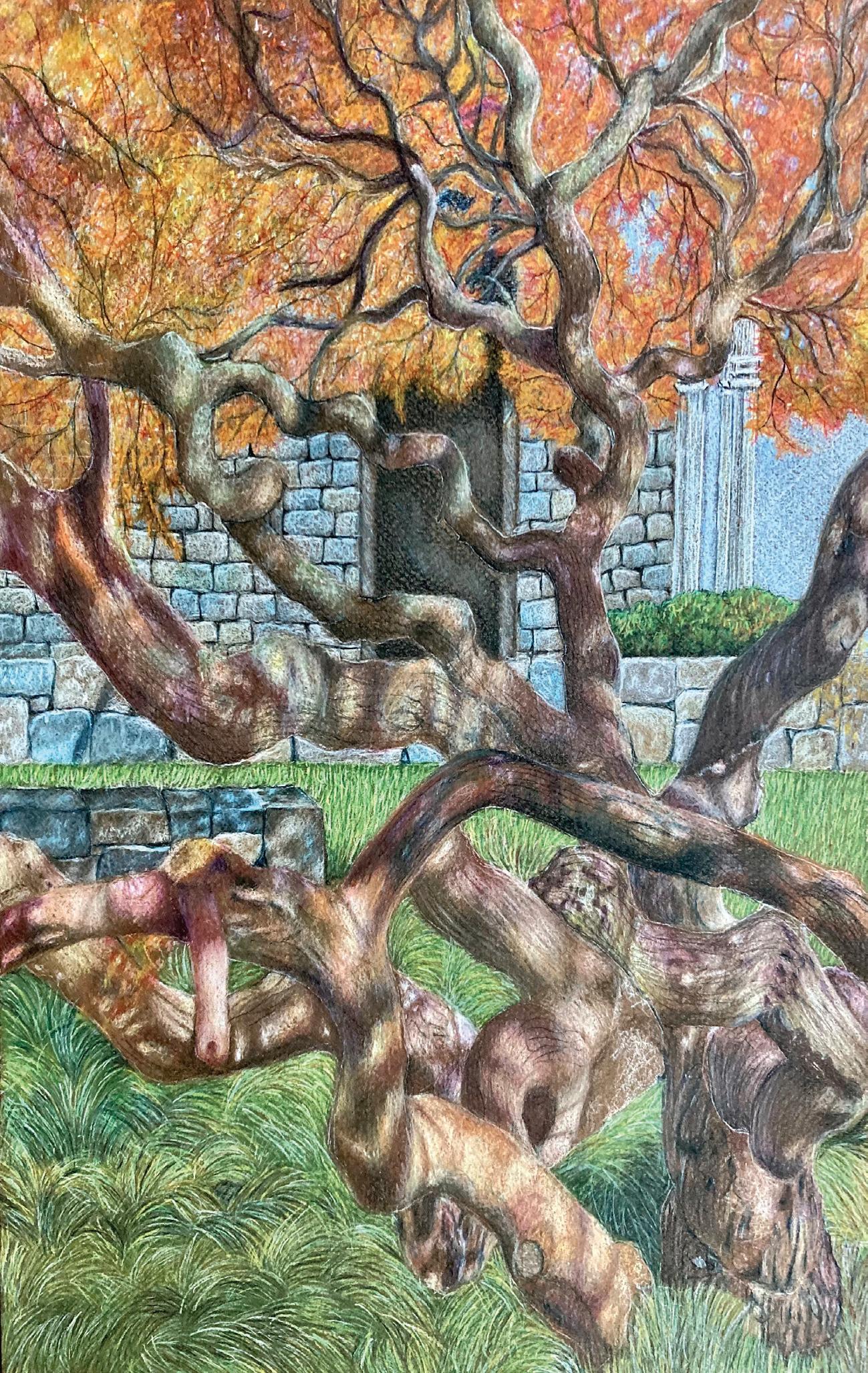
57
Ava Lee Twisted
Above the Tracks
Izzy Rosales
Jax was a city boy. Born and raised in the concrete jungle, he did it all. School in the morning, soccer at the pier, and things on the weekends he would eventually get a stern talking-to for.
Put gently, Jax was somewhat of a…complex guy. He poured his milk before his cereal, preferred drinking warm water over cold water, and didn’t care for unwarranted conversations from anyone other than his two friends—Van and Ace. And his family, of course.
The second Jax stepped out of the door, his earbuds were glued to his ears, blasting his own curated mixtape—mostly Beethoven and Mozart.
His untightened backpack lazily sat on his shoulders, with open zippers revealing the contents of his bag: crumpled notes, dried-out pens, George Orwell’s 1984, and three water bottles. One was old and plastic, scrunched into the side pocket of his backpack from an old chem experiment. The bottle was definitely contaminated, but when the experiment was over he insisted on keeping it to take his findings “to the next level.” One day his mother noticed the bottle, and being the clean freak she is, has begged him to throw it away ever since. But every time she reminded him to do so he simply said, “I’ll do it later,” knowing damn well that that wasn’t going to happen.
Jax was the classic never-does-any-work-but-still-managesto-get-straight-A’s student, and his teachers’ comments always read something along the lines of “I truly don’t know how a person this young can manage to seem to so uninterested and unresponsive during class, yet produce such compelling work.”
Not only was he a surprisingly strong student but a beast on the field, never afraid of being put in a chokehold. At the soccer banquet, his coach couldn’t help but add, “Whenever Jax is on the field, it rains yellow and red. Not exactly the type of rainbow you’d hope to see, but for him, it works.” Everyone chuckled and stared at him while he simply flashed one of his notorious smirks.
Other than his cat Farkle, there’s nothing that Jax loved more than his independence. His daily commute to school was the highlight of his day. It was the only time when Jax was truly alone and allowed to simply exist. He walked down the steps into the subway station and was welcomed with open arms by
58
the concocted scent of blood, sweat, tears, and weed—the sweet smell of the city. Per usual, he minded his business and stood against the mosaic wall, waiting for the rumbling metal tires to come to a screeching halt. Jax never batted an eye at anyone, but he noticed an abnormally large crowd today. A short and scrawny man was selling packaged food out of a suitcase. Jax, intrigued, stepped closer, and upon further inspection, he noticed that this man wasn’t selling just any food, but international snacks. Snacks from Japan, Brazil, and even Russia. Jax’s initial dismay turned into respect for this entrepreneurial move. It was the first time he had ever found himself interested in someone else. People lined up to feed on the man’s scheme. Jax didn’t enjoy following crowds, but this was one he wanted to join. As he was about to step into line, he heard the roars of the subway summoning him. If there was one thing Jax didn’t like, it was being late. He knew he couldn’t risk missing his train, so he ditched the line and stepped through the sliding doors.
Sounds of sealed plastic squeezing open and all types of crunches and chomps filled the subway. Jax turned up the volume of Mozart’s “Lacrimosa” to drown everyone out. However, he noticed too much movement on this seated ride. Clamor and muffled shouts echoed in the subway car. To his surprise, the mystery snack-selling suitcase man was in his peripheral. Jax turned and noticed that a businessman arguing with the mystery vendor looked awfully pale and unwell. As Jax glared at everyone else with the colorful opened packets, he realized they too looked like all the life had been sucked out of them. Disgusted by the deadly aura that filled the already foreboding subway, Jax saw their lips moving and brows dancing but continued to listen to his music.
It wasn’t until Jax felt the floor of the subway shake from the depth of the seller’s roar that he finally pressed pause. The mystery man’s face turned a shade of red Jax didn’t even know existed, as he repeatedly screamed, “I DIDN’T DO ANYTHING TO THEM! I’M JUST A LITTLE BOY, I’M JUST A LITTLE BOY!” Everyone went silent. Jax could practically see the smoke bursting out of the man’s ears and immediately felt his stomach drop—something that’s never happened to him before. The seller turned around with his hunched back and head dropped before walking toward the transfer door, while the passengers looked at each other as though attempting to confirm whether it had been real—a 40-something-year-old man who claimed to be a “little boy” was
59
moping around after possibly selling laced foreign snacks on the subway. But when they thought he was gone for good, Jax and the man were suddenly the only two breathing.

Jax watched him as he stole his victims’ possessions, mumbling, “Momma’s gonna be so proud.” When he got to Jax he was dripping with sweat, and glared at the plastic water bottle in Jax’s bag. Jax understood. He handed it over, maintaining eye contact. The man unscrewed the cap with his teeth and threw it on the floor. Jax watched as it rolled across the grime, gum, and bodies. As the man drank, the subway’s automated voice alerted Jax to his stop. As he walked to the opening doors, he heard a thud. The mystery man had fallen, motionless. Jax stepped out without another glance at the carnage, smirking and shaking his head at the idiot who had so quickly consumed his prospects in chemistry.
When Jax returned home after school, his mother immediately exclaimed at the empty side pocket of his bag. “You threw the bottle out?!” It was too good to be true. Jax simply smirked and skipped up the stairs to his room. Would physics be the thing for him?
60
Anna Leventon The Commute
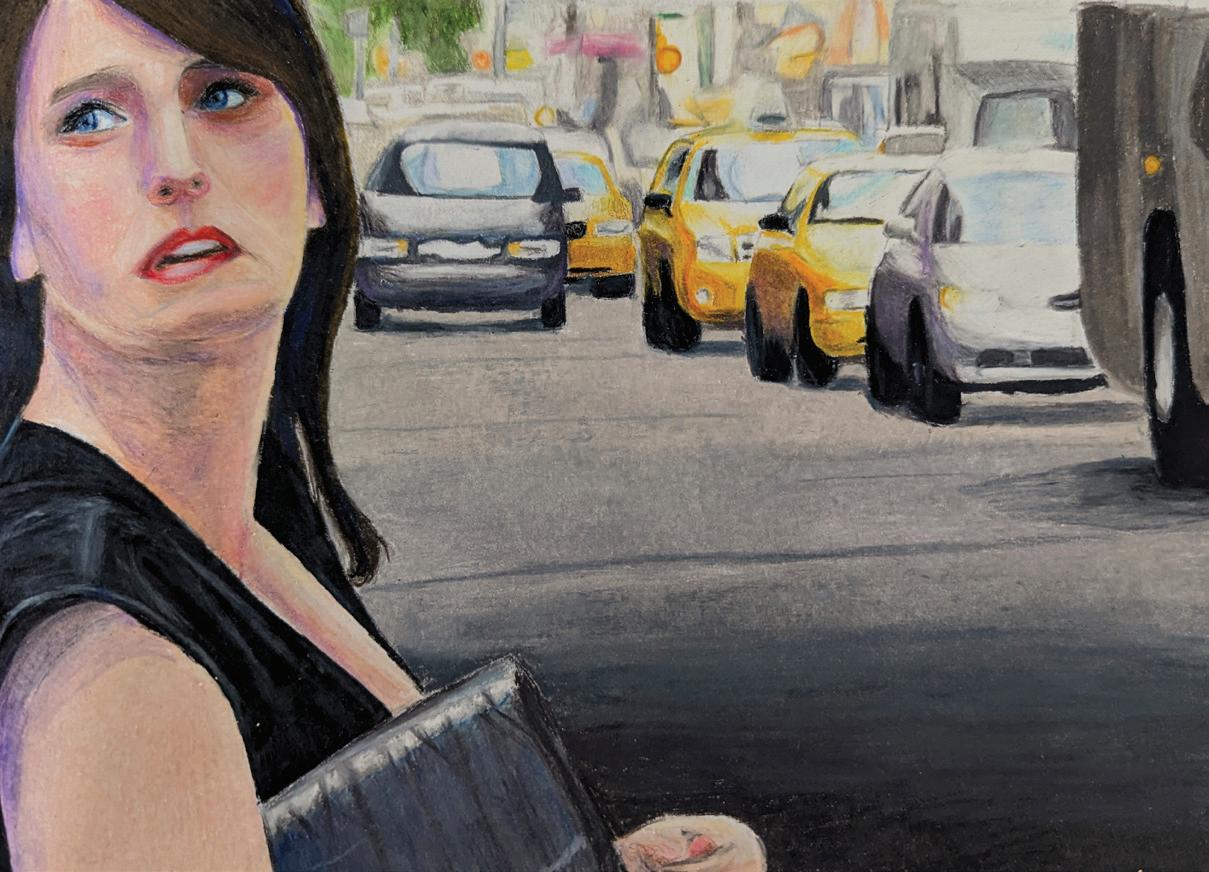
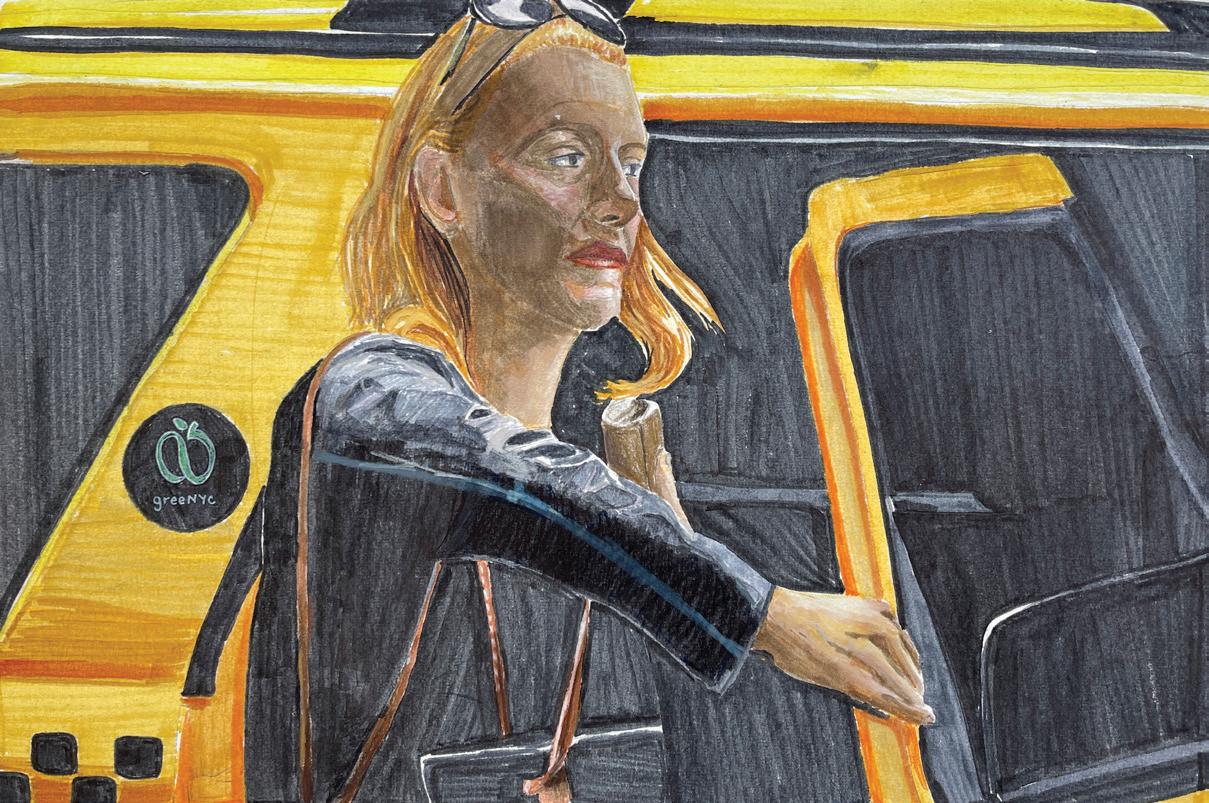 Anna Leventon
Last Cab
Anna Leventon
Anna Leventon
Last Cab
Anna Leventon
61
Arrived

Janie Ignores an Astronaut
Janie’s car approaches The headquarters of YZ Tech, A brand new job awaiting, Beads of sweat run down her neck.
Nervous Janie is oblivious To what the emerald eyes have seen Of a stranger in his rusted car That she peeks at through her screen.
The stranger’s name is Earl, And he’s on a marvelous path That Janie wants one day, Despite her mother’s impending wrath.
Earl has been to outer space.
But to Janie he’s a passerby, Not Earl the astronaut. Will she, on the way to YZ tech— Have a thought of him? She’ll not.
But such we should expect Even famed humanists know it’s true— Life proves wrong the saying: The world does not revolve around you.
Natalie Cook
Sara Raghavan Homeward Bound
63
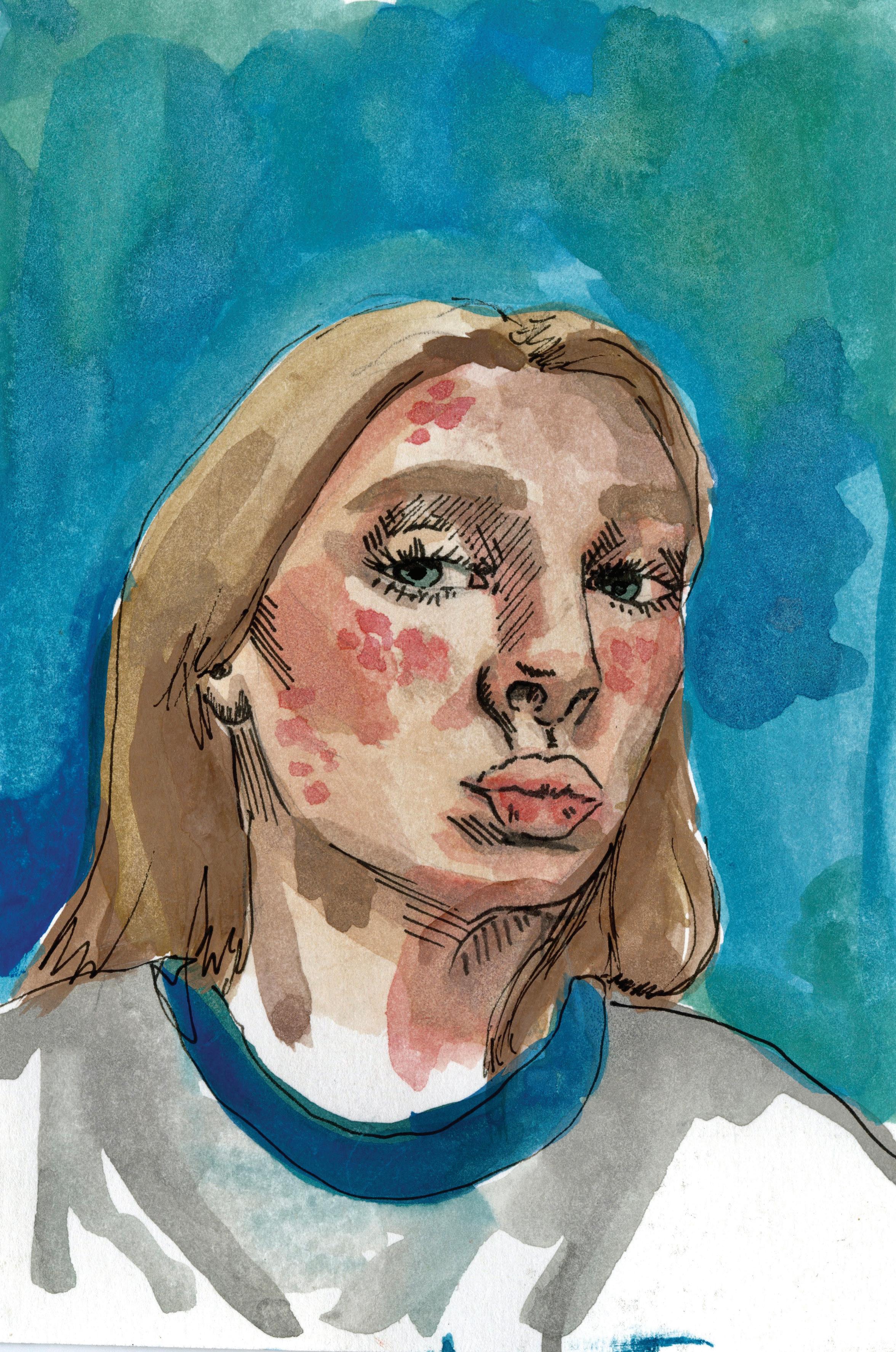
Pechorin’s Diary
after
A Hero of Our Time
13 June 1840
by Mikhail Lermontov Tara Salli
Once in a blue moon, when I have nothing of quality worth occupying my mind, I wonder if I’m too harsh on God’s ill creations. But knowing Grushnitsky has proven to me that such a term does not exist. Indeed, I could well argue that I’m more virtuous than our beloved Princess Mary, but I won’t, because that would imply that she carries some greater importance to me. Which she does not. Poor girl. Women always want to be remembered. They spend hours admiring themselves in the mirror, reorienting a single strand of hair so that it falls most effortlessly upon their exposed collarbone, which itself has been softly doused in all but the most poignant floral spray, creating the allusion that some gardner forgot where the outdoors was and mistakenly planted an entire rose garden directly on some high society woman’s collarbone. And a rose garden of thorns that is! Women will do anything to lure unsuspecting victims into the traps of their femininity. A rosy scent is only the beginning. Regrettably for me, I’ve had my fair share of such women, and therefore such coquetry doesn’t earn so much as a sideward glance from me.
That is the true evolutionary undoing of women. They try too hard and care too much. Perhaps if Princess Mary didn’t try so hard to hate me, I could just find it within myself to love her. But she cares too much about me for me to care at all about her. It’s a peculiar construct, one that proves only to my detriment: how the less you care about a woman, the more she seems to care about you. Am I to ride across the steppe upon my stallion, leaving empty shells of women cursing and praying my name in a state of ambivalence? If that is my duty, then so be it.
But I’ve digressed from the reason I took to my written musings tonight. Earlier today, I witnessed the most peculiar of scenes, one that brought me great pain to watch unfold; not out of care for Grushnitsky’s disposition, but for my own belief in the future of man.
Grushnitsky and our beloved Princess Mary were among the gardens, peacefully strolling along the gravel-laden path. Mary was plucking at a rose petal, one by one allowing its pieces to flutter to the ground beneath. Before I had the opportunity to announce my presence, I overheard my name slither out of
Ainsley Mckee Selfie
65
Grushnitsky’s foolish mouth:
“Dear Princess, I cannot help but notice, you seem so awfully perturbed. Tell me your thoughts aren’t residing with the malicious Pechorin?” A silent pause endured. That was his first foolish mistake: to mention another man’s name while courting a woman. I ought to pay this man for promoting my name to every audience he receives. And a mighty fine job he’s doing at that! What a noble fellow, that Grushnitsky! Perhaps he ought to rethink his choice of profession.
It took Grushnitsky but two seconds of silence to prompt him to make his second mistake: “You ought not to spend your precious youth thinking of that Pechorin. He will only hurt you, dear Princess.”
That comment sparked Mary’s interest, as she proceeded to drop the remaining pieces of the rose petal on the path and look up at Grushnitsky with a troubled expression upon her face, and ask: “What must you mean by he will hurt me? Do you consider me so fragile?”
Ah, Grushnitsky, you fool. Every man knows you warn a woman of a fire ahead and she walks straight into the flames, craving their warmth.
I didn’t allow their conversation to carry on any further. I had witnessed Grushnitsky dig a deep-enough grave for himself already. And so I walked out from the corner of the building, a grand old grin plastered across my face, and greeted them both, making sure to acknowledge Grushnitsky first, and Mary only as an afterthought: “Ah, Grushnitsky, my dearest friend, how are you today? You look rather grand. Doesn’t he look grand, Princess?”
Before Mary could give any sign of affirmation, Grushnitsky narrowed his eyes and fired back: “And what brings you to the rose gardens alone at this time of day, Pechorin? Or do you perhaps have someone accompanying you?”
I laughed heartily: “Oh, goodness, no. I find my own musings much more entertaining than the presence of a preoccupied woman. As for my reason being here: that is for me to know, and you to wonder. Perhaps you two can discuss that topic next, in case you find yourselves running out of more intriguing topics of conversation. But then again, I cannot blame you. I am rather fascinating, aren’t I? I bid you both good day!”
I walked off in the opposite direction, feeling rather satisfied with myself. They would each go home that night to lie in bed, eyes wide, staring at the ceiling, minds preoccupied only by the thought of me.
66
 Alicia Qin
Alicia Qin
67
The Voyage
The February Sun
The February sun rises Above yellowing wreaths In the graveyard.
Where are the people Who left them?
 Katie Nichols
Katie Nichols
 Sara Raghavan Golden Hour
Sara Raghavan
Sara Raghavan Golden Hour
Sara Raghavan
69
Golden
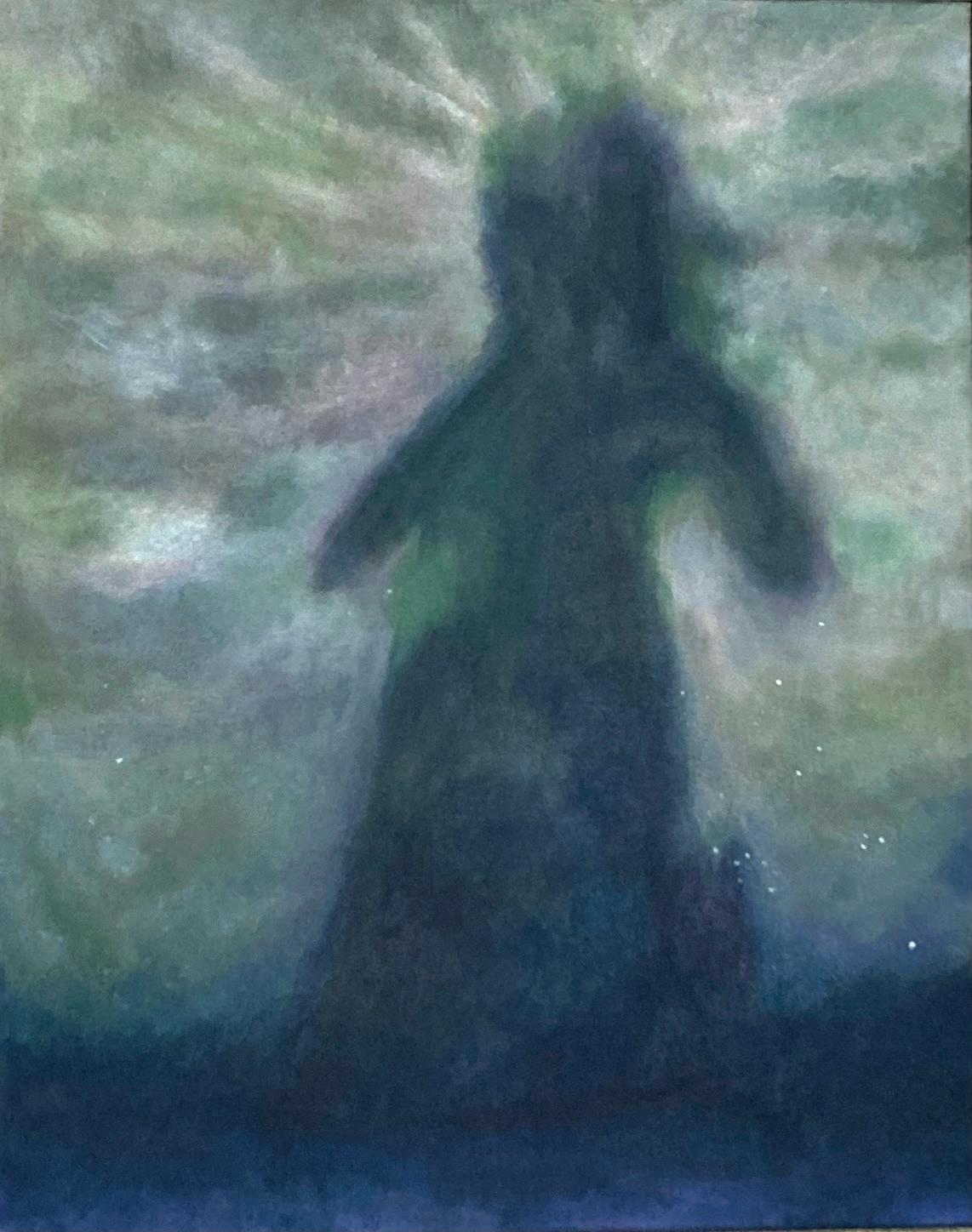
70
Zara Kurbanov Somber
Lesson from Mother
after As I Lay Dying by William Faulkner Ying-Chu Chen
Circa 1930
I remember my first night with the horse. My eyes strained to perform their function and my legs dragged two dead weights of my feet to the barn. It was a goddam beauty, worth all the gruesome hours I sacrificed free time, labor, and health for. I would caress, train, and support the creature so we could ride out miles to Texas. I would push, teach, hammer my love into its towering profile.
I remember my first day we rode together. The horse kicked at me in a greeting as I bumped its stomach. I clung to my harness and returned each hit with deliberate contact. And somewhere between all the bruises and heaves, we moved from our wrestling to a dance of fluid motion all the way through its four heels to my two stirrups.
I rode up the hill where my mother would have been standing, a shawl draped over her tired arms, her shoulders taut from their work on the children. At our eye contact, she would start drawing stray thoughts, stories, lessons across the still air and silently into my mind. She would paint a picture in my head of a little baby on the pillow. The scene followed days of routine, the tall lean figure of Father coming in and out of the bedroom as the baby and Mother sat in silence, sensing each other’s comfort and joy, listening to each other’s tranquil pains. She trained me since birth, I realized. Mother would float another image across my mind. This one, perhaps, of herself, enlarged and looming over my sinful, impulsive hands. It was the neighbor’s horse feed or candy cane for my younger brother, I can’t recall. My hair is strained back by her firm grip, and I feel the concentrated sting of her wrath hit. She taught me since birth, I grimaced.
“If there is a God, what the hell is He for,” I asked her after the crops died. I asked her after my brother fell off the roof. I asked when my father’s business was stolen from. I asked, I told, I screamed at her while she would lie looking out the window. And I remember the goddam silence. I remember straining my ears, running through the woods, trying to hear her voice.
The first night with the horse I had lost my voice from frustration. Mother had, shawl over head, watched from the entrance of the
71
barn without my notice, and came forward. She stared into the horse’s pitch black eyes and I felt the world revolve around the sun once. Then suddenly, she lifted one hand and firmly slapped its nape. Her hand, the horse, the air were still without a squirrel’s scuffle. Then she slid her slender fingers gently into a caress.
Afterwards, I followed her into the kitchen the next morning. I started sifting the flour, squatting with my back to the cutting board and her willowy figure. She had set the knife down and was staring past the window. I paused mid-breath as her lips parted.
“If you peeled an orange, is there a reward of nourishment remaining? If you took the structure of our house, if you moved to another town, would the wooden frames be our home still? If you took away a sworn promise, is there lasting love underneath?”
In one soundless twirl, she turned and bent down next to me, “Preach with a warm robe to the shivering, suffering townspeople— is that a virtuous performance or a prayer?”
“Every word,” she places her finger on my lips, “is a vessel. That vessel can be a ship filled with the angriest sailors or kindred spirits. That vessel, however, can also be vacant as a pure outline of cedarwood boards and welded steel.”
It took me a few years before I found the word “intuition.” I saw my brother’s sensibility and silent care. I felt my sister’s stress and our baby brother’s busy thoughts colliding with each other. Last I saw an empty box, filled with smaller structures of miniature vessels, crates, a dulled chest, and little containers lying on the floor of Father’s head.
Now, I know what you have taught us. I know you were unable to pray no more, and I cannot either. I know your distaste for the word “motherhood,” a meaningless label for the speechless pain and joy you have ridden with me.
Back on the hill, I would have reached down to adjust the shawl on her. And I would have let her see my tears since they spoke louder than any darn vessels memorized from the schoolhouse’s chalkboard.
72
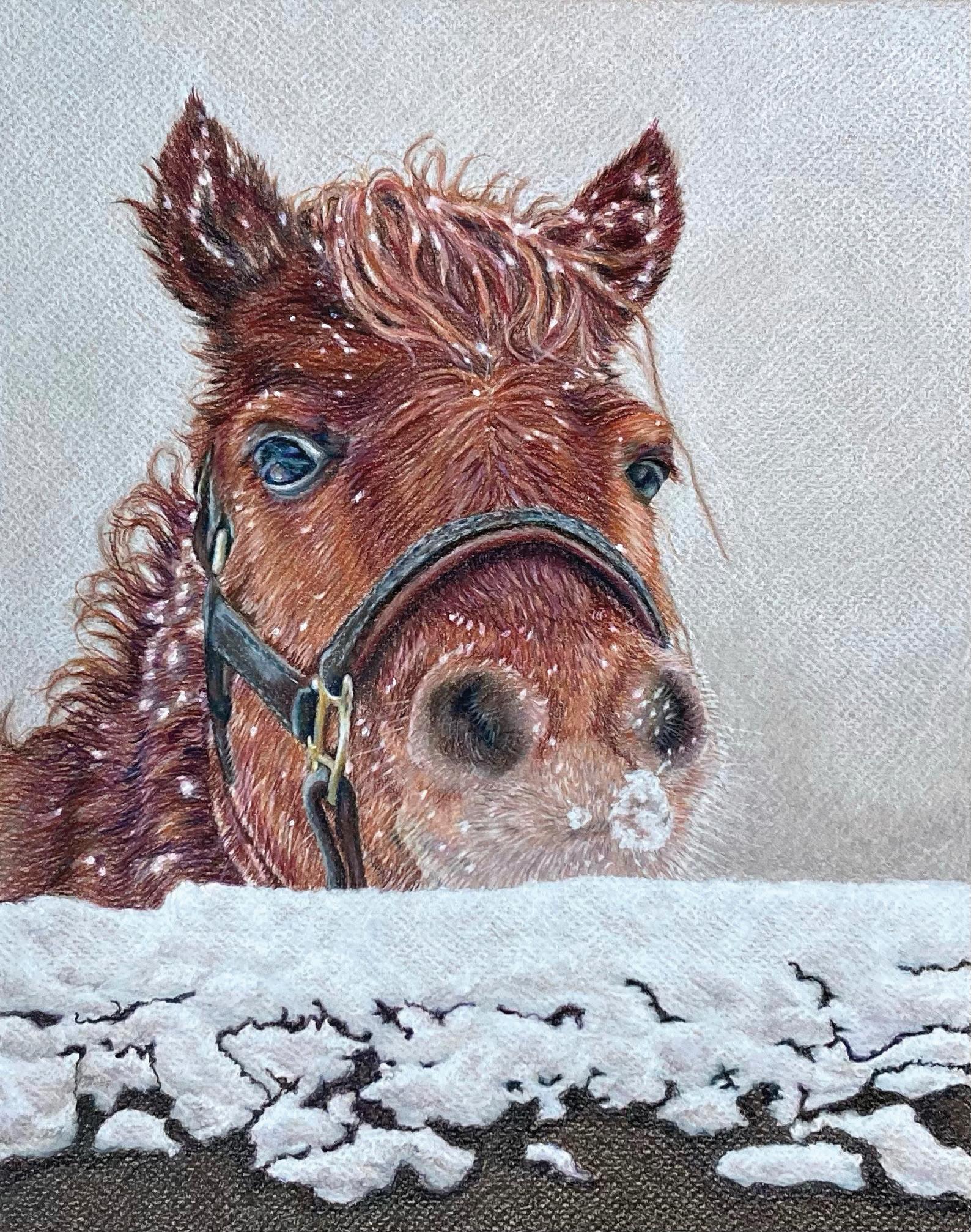 Zara Kurbanov
Zara Kurbanov
73
First Snow
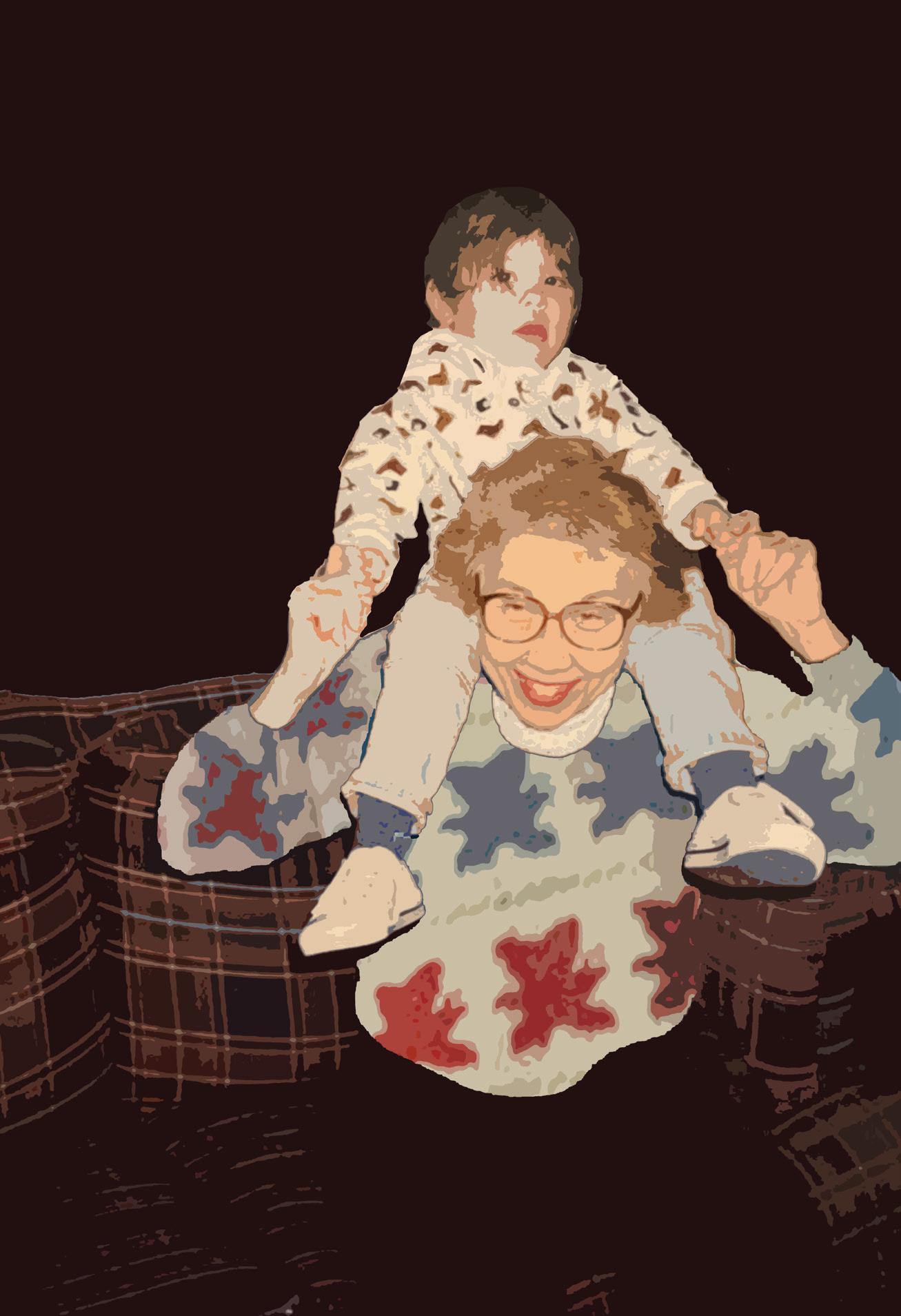 Elizabeth Spaulding Collette
Elizabeth Spaulding Collette
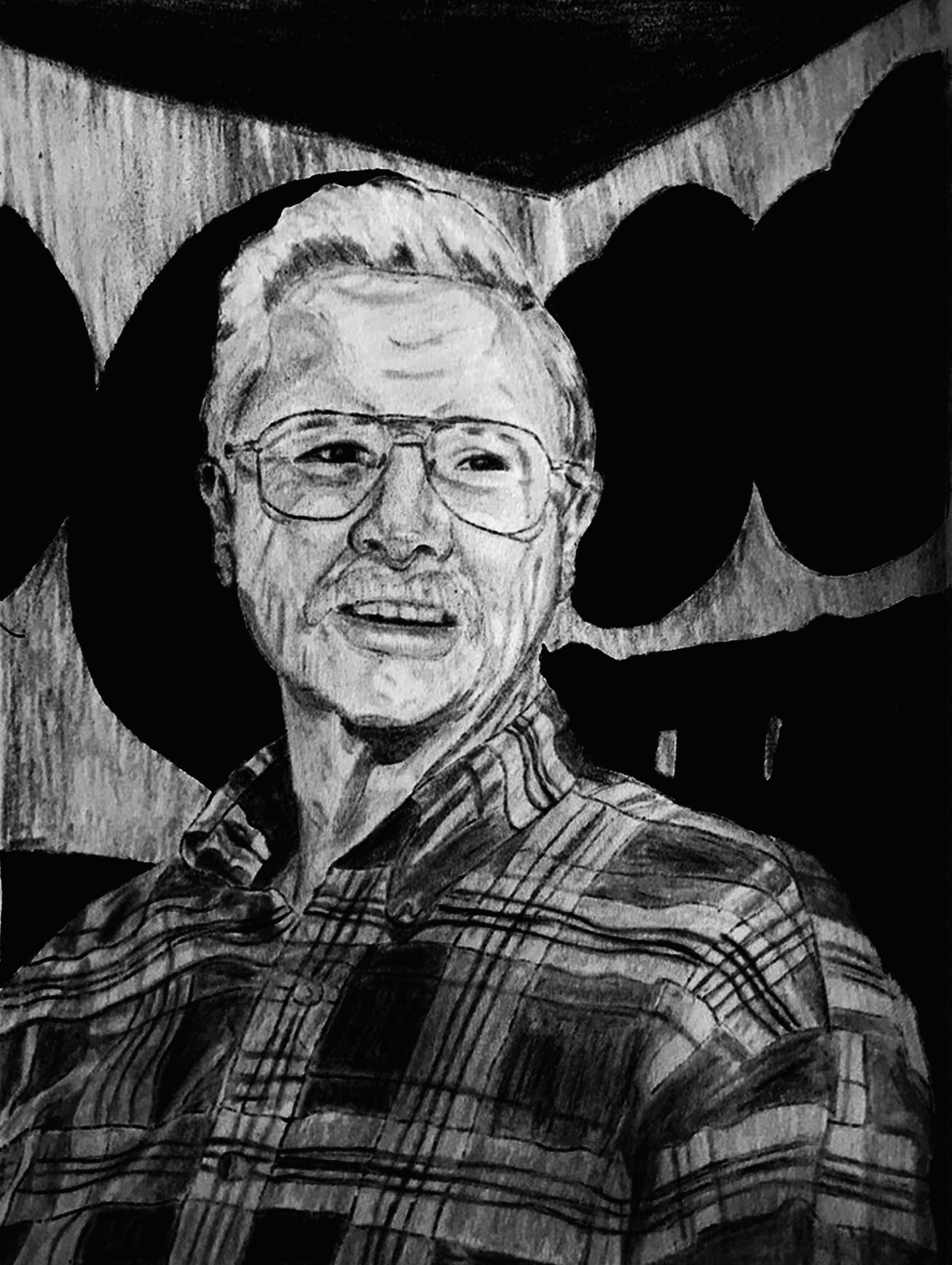 Elizabeth Spaulding
Elizabeth Spaulding
75
Donald
A Most Peculiar Library
Honour Russell
The Library is vast and unorganized, with books crammed on the shelves stacked and askew. Some books have fallen on the floor, with others neatly placed in rows.
It’s easy to get lost inside for hours.
This Library is yours and yours alone; no one else can see it; no one else can understand it except you, so take care.
People get lost in their Libraries. Their stories don’t end happily, so use the map.
There are many parts to the Library—here are some to know: Some parts of this Library are locked tight with chains over the aisles. These are locked for your safety.
You can go in eventually when you are ready.
Some aisles are neglected, shoved to the side, dark or dimly lit, covered in dust, cobwebs on the shelves, or populated by a skeleton who got lost and couldn’t be found.
This aisle is not forgotten, just absent from thought. One day you will wipe the dust off the cover and remember.
Then there are the aisles up front, dusted and shiny with light beaming on them. These are new memories, favorite memories, random facts, and knowledge. This is where most time is spent.
One may think this Library is just one floor, but that is wrong.
There is an attic, where you store useless stuff you think you’ll need one day but most likely will never use, stuff like math equations and people’s names.
Then there is the basement, where there is an “Authorized Personnel Only” sign on the door.
The basement is cold and dark, here you hide your worst chapters, the things that hurt you, the people that scar you, and nightmares that crawl up the stairs and into the library at night.
It’s not all bad down there—you have bits of your childhood that you forgot but want to remember, and you can; you just have to try.
It is scary down there but if you want to heal, if you want to remember, you have to brave the shadows.
Lastly, there is a tower that reaches for the sky; this is where your dreamful narratives are kept.
Dreams are important to remember. That is why they are kept particularly safe so you don’t lose them.
76
At the top of the tower, if you can ever reach it, is where you can stand and look out at endless possibilities and make new dreams.
You are welcome to use the Library any time, and you often use it every day—mood dictating the stories you check out. Just follow the guidelines and be careful. You wouldn’t want to get trapped.
At the top of the tower, if you can ever reach it, is where you can stand and look out at endless possibilities and make new dreams.
You are welcome to use the Library any time, and you often use it every day—mood dictating the stories you check out. Just follow the guidelines and be careful. You wouldn’t want to get trapped.
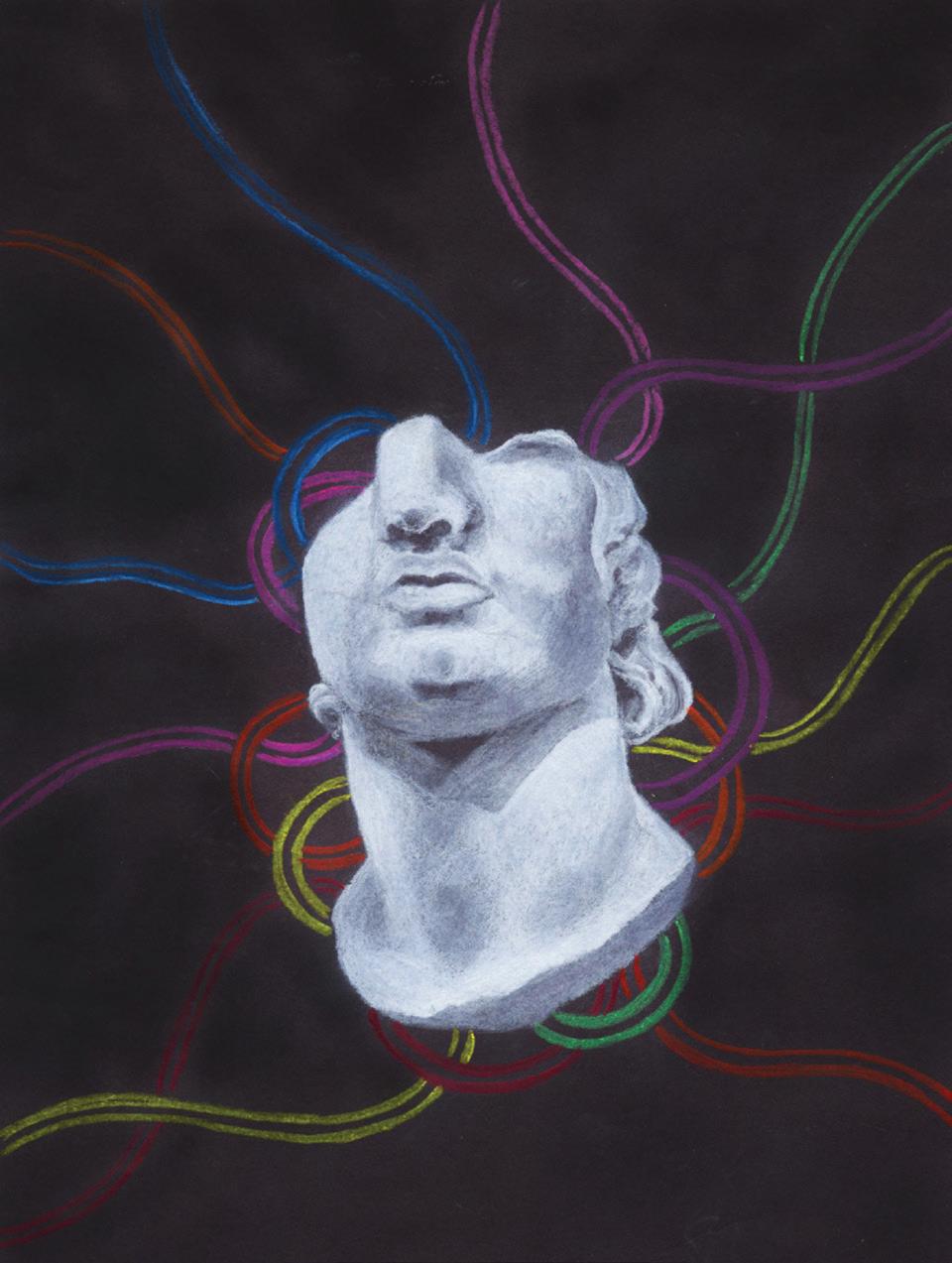
77
Nina Herceg Thought Process
Overcast

Choreographer: Saskia Jakubcin
Dancers: Vasilisa Banks, Mackenzie Coffield, Kayla Gomez, Saskia Jakubcin, Polly Welch

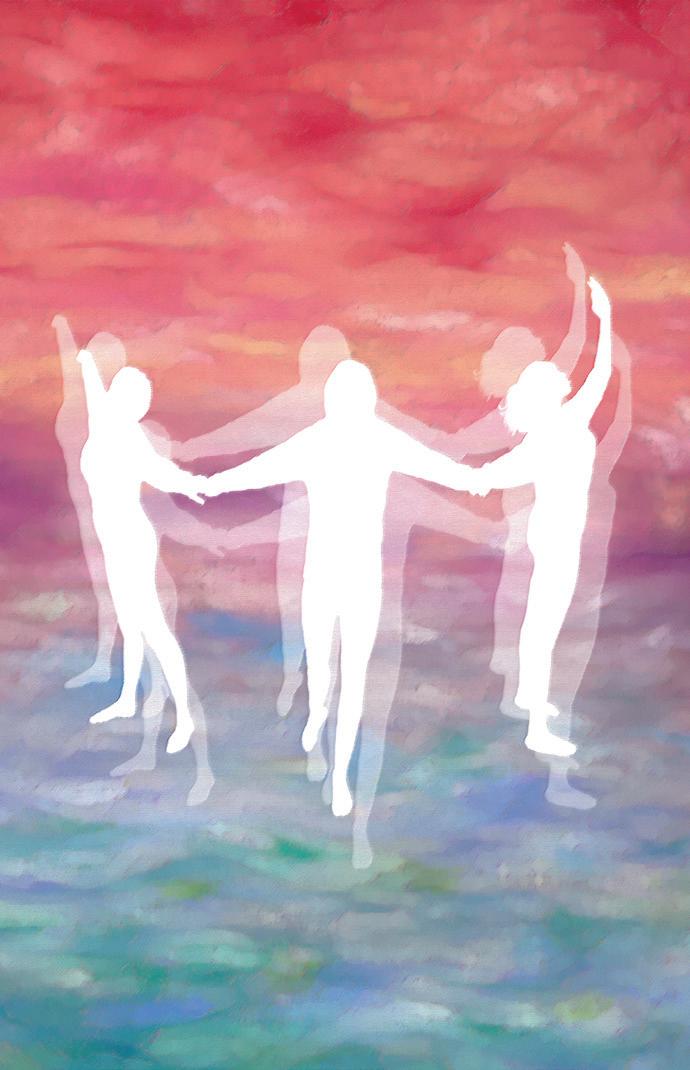
Music: “Dark Paradise” by Lana Del Ray
Professional photography by Andrew Henderson
78
Nina Herceg
Dance Corps
keep dreaming.
Choreographer: Anakhu Heru
Dancers: Vasilisa Banks, Kayla Gomez, Anakhu Heru, Saskia Jakubcin, Mira Nederlander
Music: “Wish” by Ravyn Lenae
Text: “Angela Bassett Recieved the 2019 Icon Award at the BGR Awards|BLACK GIRLS ROCK!”
Professional photography by Andrew Henderson
Stop!


Choreographer: Claire Hesser
Dancers: Katherine Feiner, Anakhu Heru, Claire Hesser, Livi Kaine, Catie Martinez, Mira Nederlander
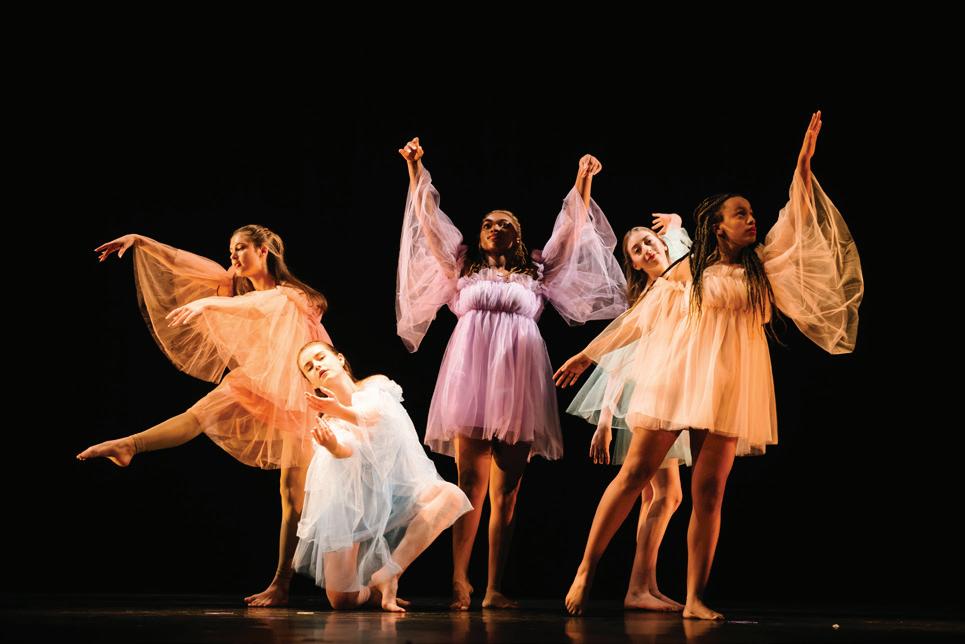

Music: “(You Drive Me) Crazy — The Stop Remix”
by Britney Spears
Professional photography by Andrew Henderson
79

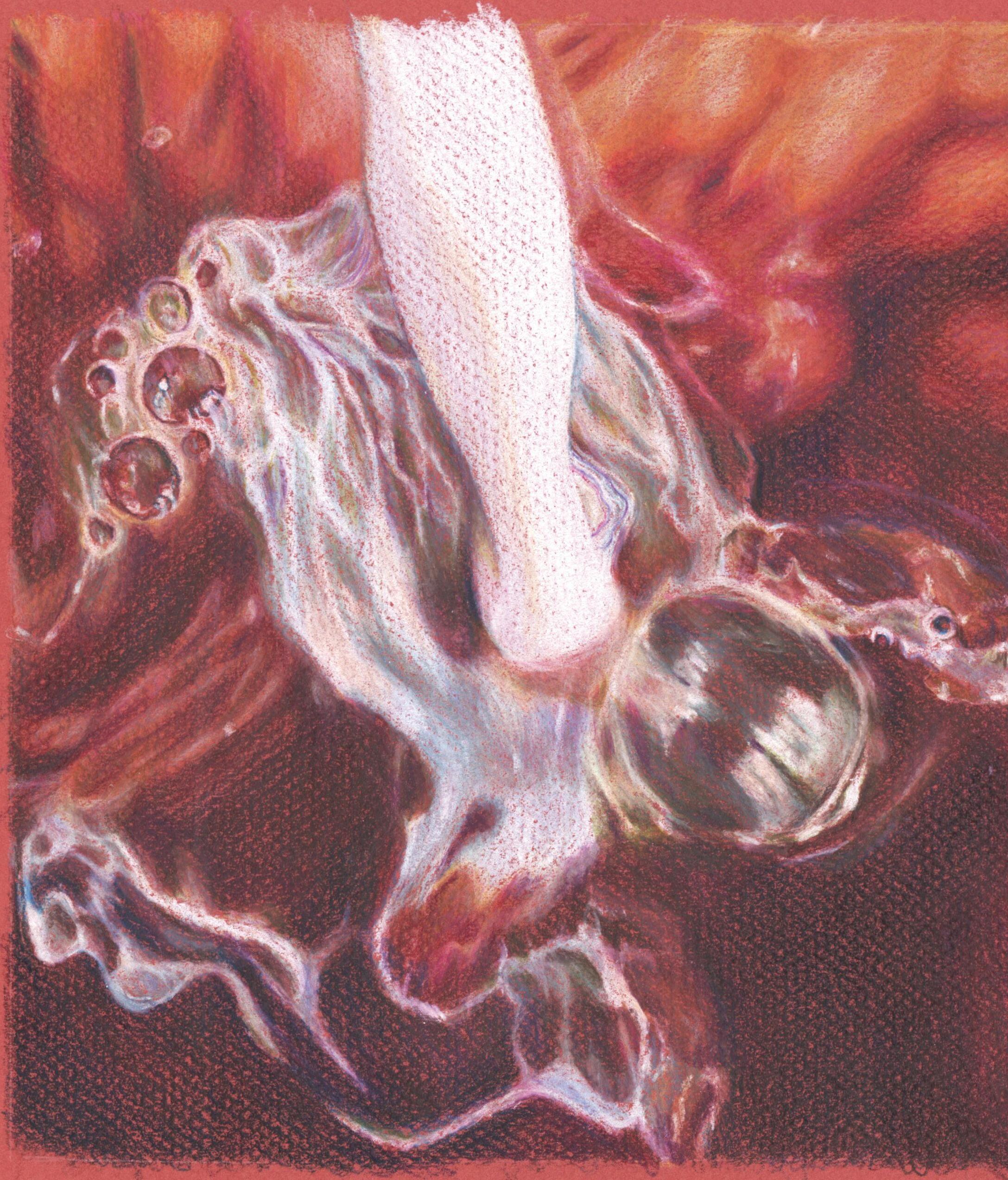
Mortals & Immortals
Immortals Mortals & Immortals Mortals & Immortals
Mortals & Immortals


The Inner Workings of a Hooverville
after John Steinbeck Arabella Everitt
Each day, the women emerge from their tents to greet the rising sun. Lugging their pots behind them, they put the coffee on to boil while the children run to gather firewood. Inside the tent, the men sit. And as they sit, they paw at their hair, their beards, and their eyes, trying to push themselves back together. They look with dull eyes at every crease that lines their mouths, at every wisp of hair by their temples in the cracked mirror of a shaving kit. Finally, they pick up their razors and set to work readying themselves for another day of disappointment. The women gaze back into the tents, and though they note the weary eyes of the men, they do not worry, for if the men shaved their faces, they were okay. As long as a man shaved, he still had his decency. So glancing back, the women knew it was okay, and the children carrying firewood watched the women and they knew it was okay.
After the meal had been consumed, the men open their car doors and begin their wild goose chase. The golden goose flaps ahead as they drive: the promise of work, prosperity, four walls, and a roof. The few who remain squat in circles. These councils of squatting men sit silently with dull eyes, drawing idly with their fingers through the dirt, waiting for one of them to begin their meeting.
“Did you hear about the kid that was hit?”
The group stops their pondering and turns their attention to the man who had spoken. Running his grimy fingers through his thinning brown hair, the man seems pleased with himself for capturing the group’s attention.
“Ran over by a cop, nasty business. Was just standing by the road, right on the side, you know? And he spots a rabbit. Well now, kids are curious creatures so he goes on a-followin’ the rabbit right into the middle of the highway. Now, the cop said he was aiming for the rabbit, but the rabbit hopped away without a scratch while that kid laid out there on the ground bleedin’ out. Nasty business.”
The group turns to one another and murmurs that it was indeed nasty business. The man who had spoken, now satisfied with the conversation he had sparked, returns to dragging his finger through the dirt before him.
The day carries on in this manner: a man shares, others
82
exclaim, and the stress in the camp grows. As the sun begins to wave goodbye to the people, the rest of the men return, defeated. They drive up to camp in their rickety cars and file into their tents. They crouch beside the fire and inhale the scraps of food their women had prepared for them. And as they eat, they wonder if this would be the last food they had for a while. To the sound of creaking crickets, the women clean up and the men return silently to the privacy of their dens. Each takes off his boots. Each massages the aching arch in his foot. And each drifts off to sleep, heads filled with empty dreams and dashed hopes. The women glance back at the sleeping men, and they know that it is not okay.
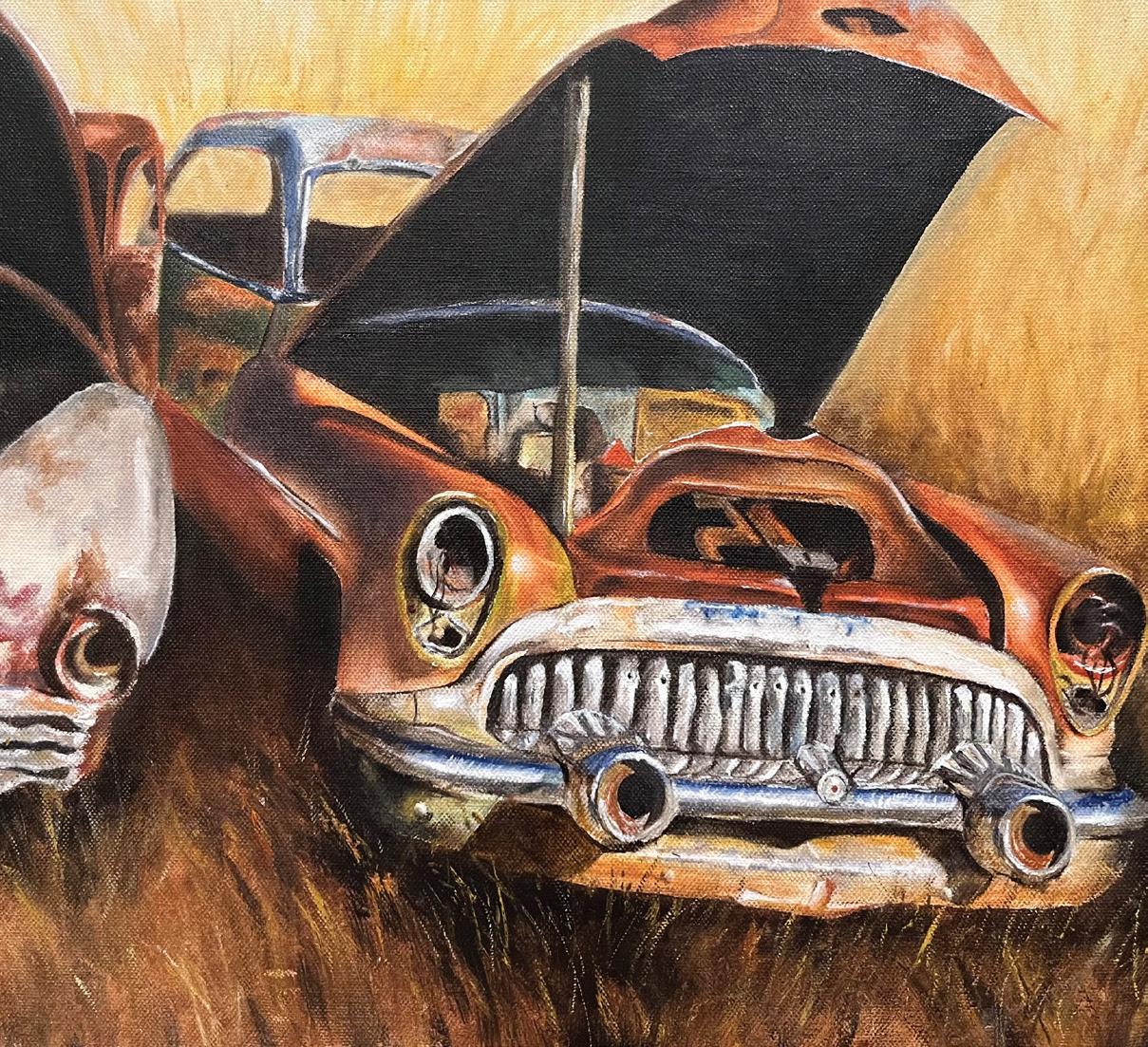
83
Sarah Li Rust
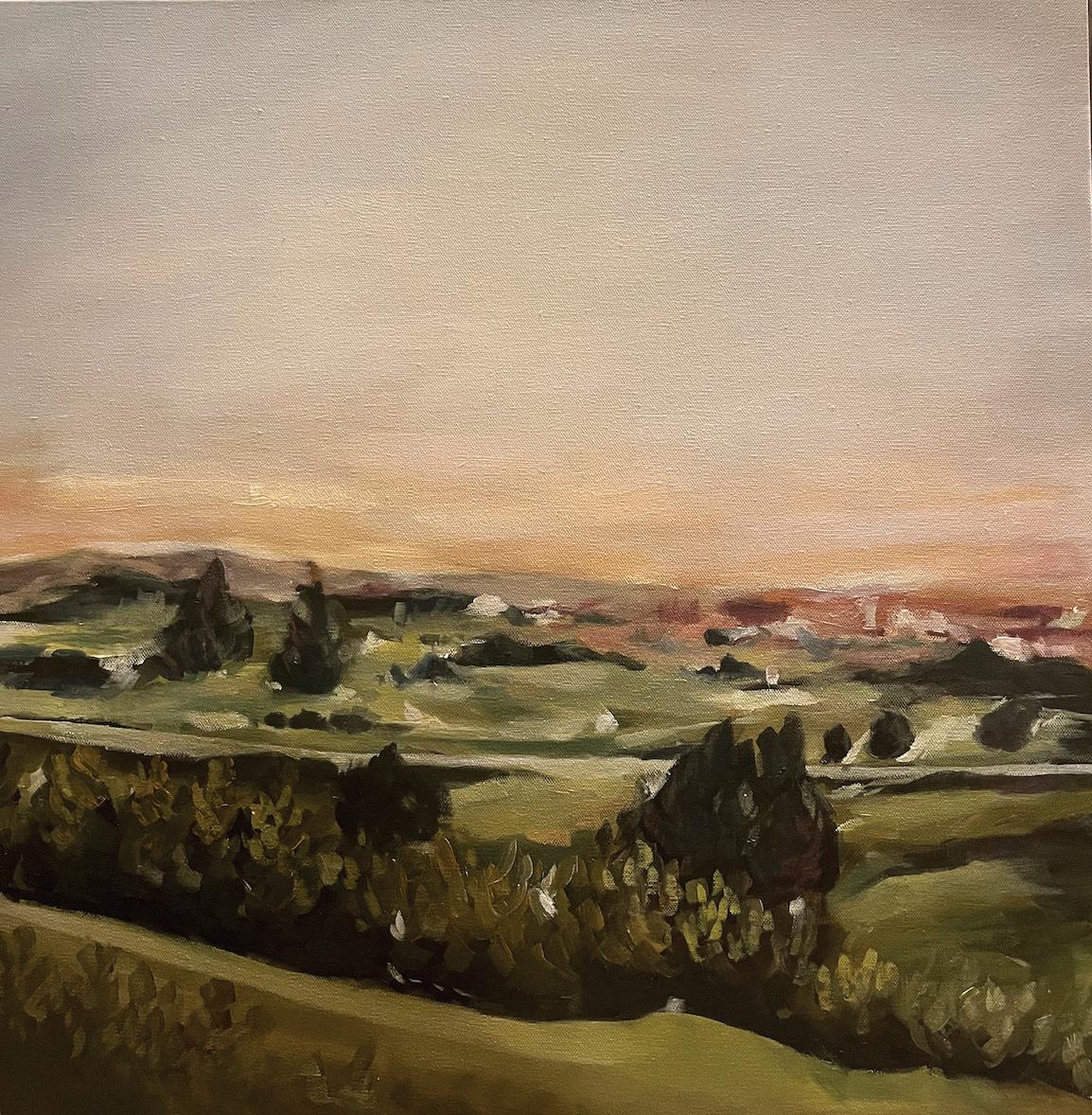 Sarah Li
Sarah Li
84
Ohio Hills
The Adlers
after John Steinbeck Sara Raghavan
Mr. Adler’s eyes glazed over as the sun’s faint hue gently proliferated over the horizon, illuminating the innumerable specks of dust. Frank Adler sat, immobile and reticent, as the dark dissolved into light. The sun rendered his wispy white hair barely noticeable and his muscles ached and begged him to stay put. The scene lay frozen in place. Frank feared that even his slightest movement would ruin the peace.
Each morning, Frank watched the sunrise over the stillness, greeted his wife good morning, and shaved using his partiallyrusted razor and broken mirror. No matter how carefully he watched his reflection through the shard of a mirror, he always somehow managed to nick himself. He’d splash tainted water from his bucket on his face, and head back into their tent to sit at the foot of the bed as his wife woke. With even the slightest cue of daylight, she’d turn over into their quilt in denial.
“Mornin’ Dorothy,” he whispered, “it’s a beautiful day out.” But the air was thick and muggy, and the sky was overcast, perpetually threatening hellish weather. She flashed a solemn smile and rolled over until she sat on the edge of the bed. Inside the tent, they owned a cot, a crate which doubled as a nightstand and a stool, and a rickety table bearing scars of age. Mr. Adler had a spare set of clothes, but he kept nothing more with him in the tent. On the crate, they kept a framed black and white picture of their family. It was the last time they’d all been together. Little Mildred and Johnny didn’t make it past New Mexico—dust pneumonia, they’d reckoned. They were young and weak.
People would come and go in and out of Hooverville, but not the Adlers. Though they fantasized about life elsewhere, they couldn’t leave. The first time they tried they ran out of food. The second time, out of gas in the middle of nowhere. The third time, they realized after five minutes of travel that restarting their life was futile. They were indefinitely chained to their Hooverville. Dorothy had a dream they’d become strawberry farmers out west. They’d live on their acre of land and produce so many sweet strawberries that they’d never have to go back to living in fear of disease and rampaging police. In this dream, Mildred and Johnny would run through the strawberry patches, picking and sampling the earliest berries, their noses scrunching as they exclaimed they were too
85
bitter at first. Later in the season, though, their faces would burst into wide grins as the sugary strawberry juice would run down their cheeks.
At the present moment, Mr. Adler stepped back out of the tent to watch the rest of the Hooverville come to life. People came and set up camp, others left. Some left only to come back again within a week. Frank tried to start their car every day; the engine simply wouldn’t spark back to life. Frank stared at the car in a trance.
“Mornin’ Frank,” their new neighbor Harold intervened, “sompin’ wrong with your car?”
“Mornin’ Harold,” Frank hesitated, “the better question’d be what ain’t wrong with it. The engine’s broke, the undercarriage’s fallin’ apart, I don’ know if she’ll ever be up an’ movin’ again.”
“Oh, lemme take a quick peek at it for ya.” Harold prowled around the back of the car and stooped below it.
Carefully, slowly, Mr. Adler joined Harold below the car: “See, it’s no use—it’s jus’ completely gone fried.” As the two men got back up from under the car, Frank’s sleeve snagged on part of the metal undercarriage and ripped. Frank stopped mid-motion to look at the gash. His eyes grew glassy as he let out a controlled sigh. Harold opened his mouth to speak, but decided against it. Defeated, he retreated away from the Adlers.
Mr. Adler staggered over to his tent and allowed himself to collapse on the cot. Dorothy, watching from outside the tent, gently wandered inside. She cautiously touched his elbow to examine what repairs might be necessary.
“We don’ have no fancy sewin’ machines here, but I sure can patch that hole for ya in no time,” she reasoned, “Besides, I’m sure my stitchin’ is better than anythin’ done on them machines.”
“It’s not the tear,” Frank began, “it’s…”
Dorothy nodded her head. She stooped below the bed and pulled out a hidden crate, holding a few assorted baby clothes.
“Not so sure why I held on to this so long. Reckon this’ll be as good a use as ever for the cloth.” Frank looked up and looked back down. He agreed, but hated that he did. He needed to get out. Dorothy started right away on mending Frank’s shirt, the powder blue cloth caressing the jagged edges of the hole.
In the evening, Dorothy went outside the tent to prepare a stew with what they had left for dinner. Frank tried on his newly mended shirt. Looking at himself in his shard of a mirror, he had to sit down. He gently turned the family picture face down.
86
The dust turned to stardust as the setting sun made way for the rising moon. Frank and Dorothy ate together, quietly, sharing sparse remarks about the mundane. That night they watched in wonder as the speckled balls of light decorated the sky. They lay awake in their tent together, among the village of sleepers.
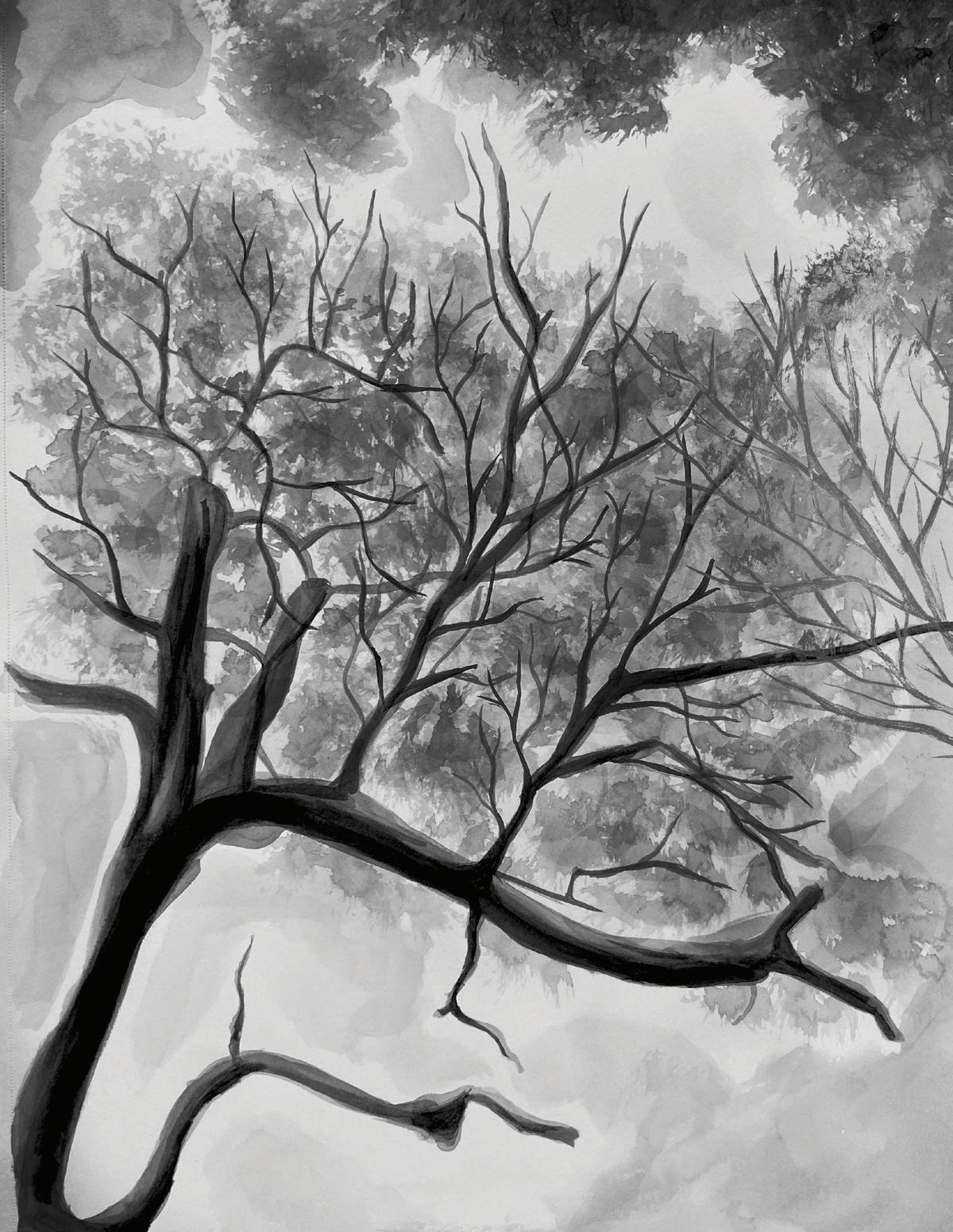
87
Nina Herceg Growing
Red
Red.
Joy Akuffo
That is how Patroclus describes the stains on my armor after a battle as he wipes away the blood, and sometimes, the tears. He is my best friend, my other half, my life.
Red.
That is how I shall describe the poppy flower that bloomed through his shirt after he went to fight for me. His blood that stained my hands— he cannot wipe the blood away and he cannot wipe away my tears. He was my best friend, and I cannot bear to live with half a heart. Reasonable, strong, smart—much more than I. Dead. How else shall I describe it?
Red is how I shall describe the rage that filled me, the fire that burned behind my eyes and in my throat, the cry that encapsulated my voice, thick as smoke, and my love for him, a burning Red.
88
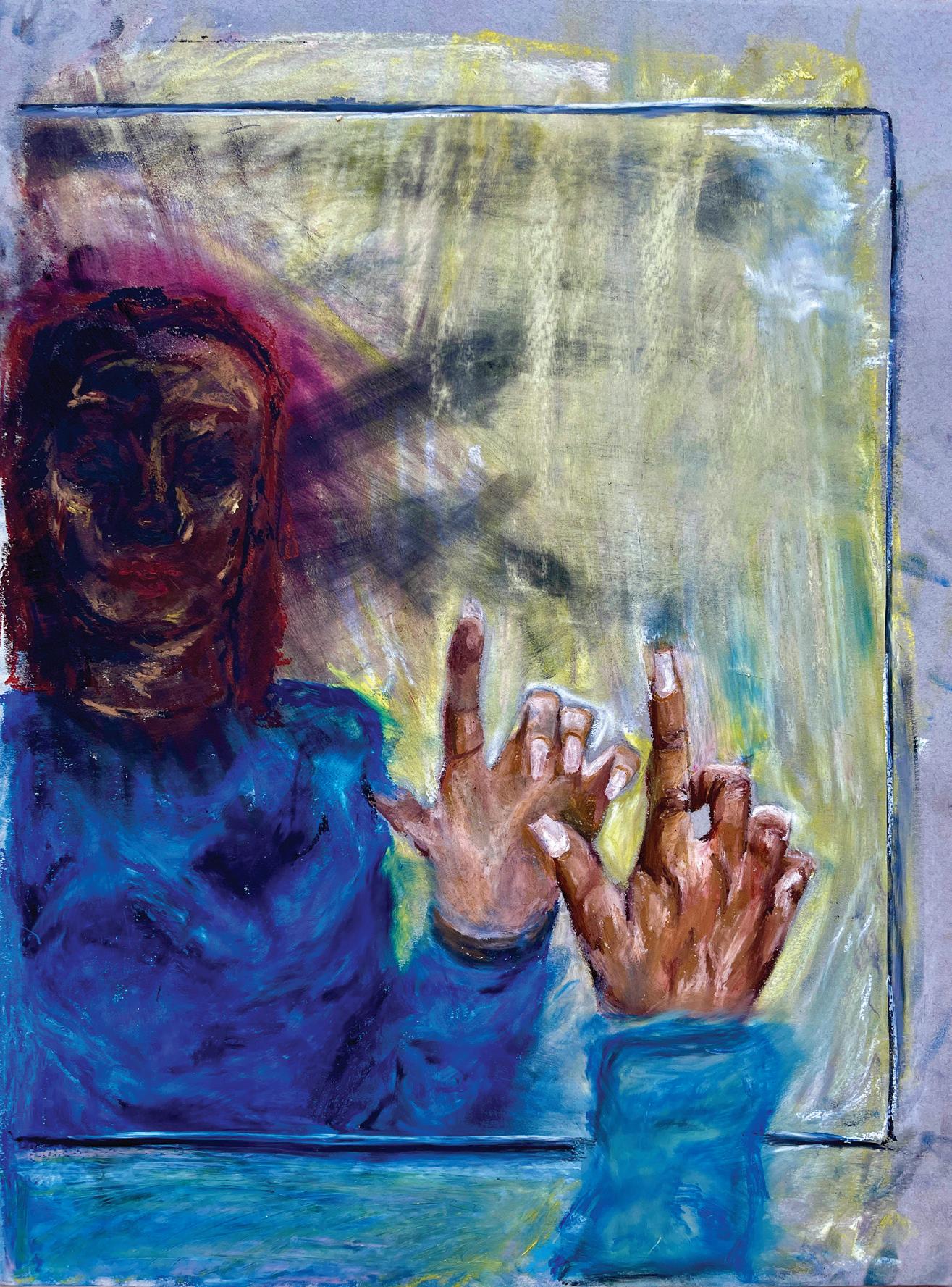
Distorted Reflection 89
Arielle Burrows
A Letter to Moscow
March 12, 1918
Dear Moscow,
Tara Salli
I fear that I have robbed you, deprived you of your pride, and worn it like a jeweled crown positioned ever so slightly crooked upon my head. For the past two centuries, you have watched me reorient our empire away from your revered onion domes towards the canals of Venice. You have seen me sprout from land declared unsuitable for such imposing architecture as our Winter Palace in merely a fraction of the time it took for you to solidify your borders from Mongol invasion. You have witnessed the proliferation of fantastical myths surrounding my creation and eloquence, watched the construction of statues erected in my creator’s name (Long live Peter the Great!), and witnessed art and literature—unparalleled by any before—emerge from the currents of the Neva.
Forgive me, for I assume, but a list of accomplishments as impressive as mine aforementioned surely institute feelings of envy in even the most historically legitimate beings like yourself. But fear not, for my achievements parallel a train of detriments of equitable size. You see, for the past two centuries since my founding, I have been tormented by incessant floods, destroying my splendid architecture, and leaving many of my poor inhabitants without a roof to cover their heads.
I feel for them, believe me, I do, but all is not lost in the face of adversity. Perhaps you have noticed in the numerous pieces of art and literature inspired by my exuberant streets, that an overarching theme ties each title to one another. Pushkin’s Yevgeny to Lermontov’s Pechorin. Characters burdened by pain and loneliness embarking upon an endless mission in search of meaning for their life. You see, my friend, pain and growth are interdependent. A great man whose impressive career I got the privilege to inspire once wrote: “Pain and suffering are always inevitable for a large intelligence and a deep heart. The really great men must, I think, have great sadness on earth.” Indeed, I agree. We cannot appreciate love and peace without knowing heartbreak and war. Perhaps you consider me cold, but I implore
90
you to consider my perspective. For the past two hundred years, I have worn your crown, not out of jealousy, or greed, but because our people have chosen to place it there. I have inspired them to live and to feel, whether that be agony or pleasure. I ask you this, my friend: without hardship and floods, what would literature truly be?
I hope I have not offended you, for that is not the intent of my writing. I merely aim to share the story of my creation, and thereby purpose for your esteemed audience to consider. For two centuries I have single-handedly yielded the power of our shared empire, wearing the crown proudly upon my head. But time has come for me to return this crown to its rightful owner: you. I will be the first to admit that the crown never truly fit my frame, for it sat upon my head rather precariously tilted to one side. Its weight was too heavy, and its circumference much too large for me to continue bearing the title as capital. Therefore, removing the jeweled garnish, I reach my arms out for you to accept its return and take my place as capital once more.
I do not seek your forgiveness nor immediate camaraderie, but for the sake of our empire, I truly hope that you will realize the value in accepting my offer. I long for a future in which from here on out, you and I work together in unison towards greater prosperity for our vast empire. For we are not a part of the West, nor the East. We do not bind our culture nor values to either side of the hemisphere. Instead, we are a unique union, an intersection of the revered East and the flourishing West. We are St. Basil’s and the Hermitage, Michael Romanov and Peter I. Time has come for our history to meet the future; for them to join forces, and from here on out, travel as one, peacefully drifting across the Volga, hand-in-hand.
The crown is yours, if only you accept.
Your dearest friend, St. Petersburg
91
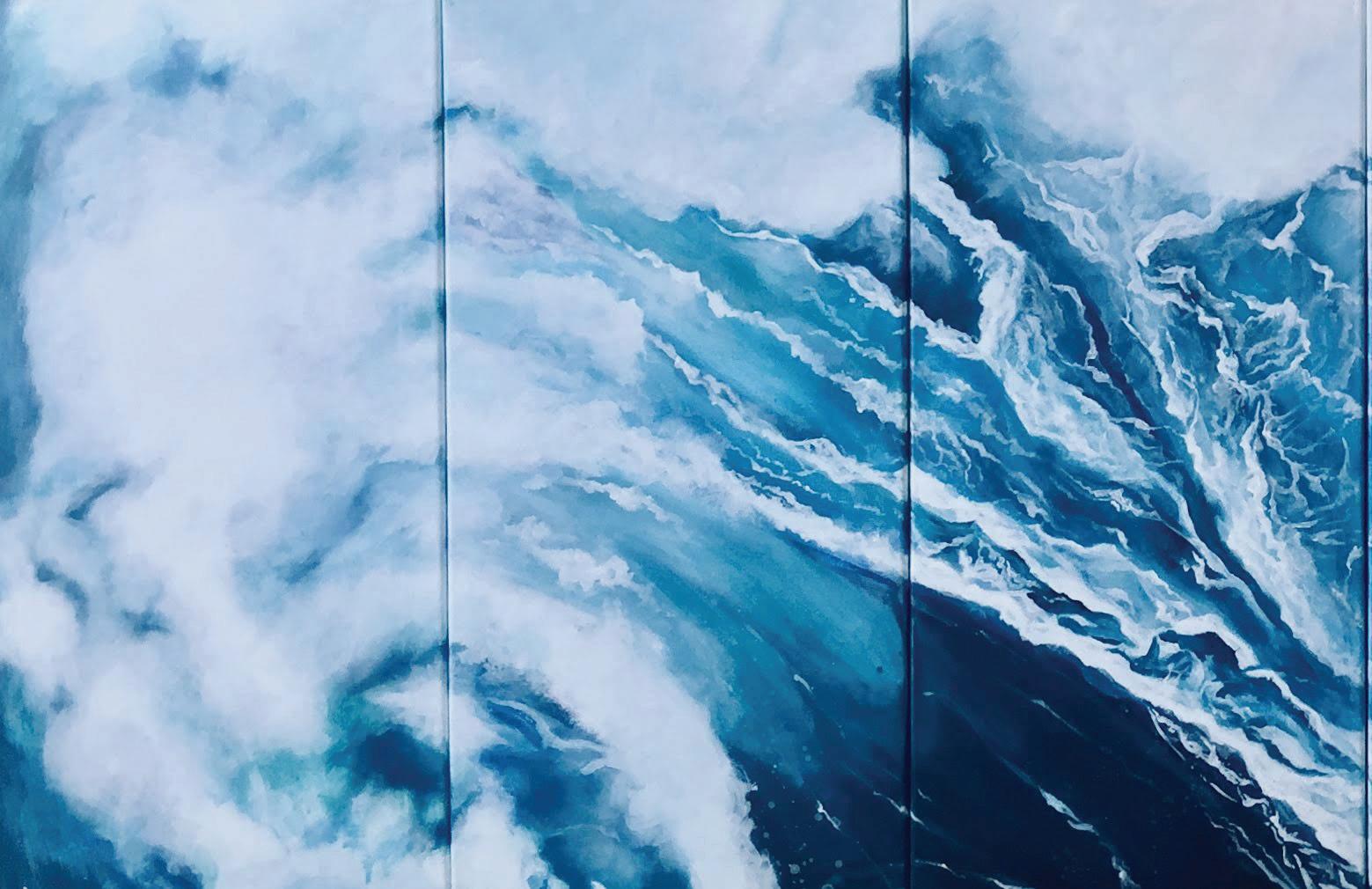
92
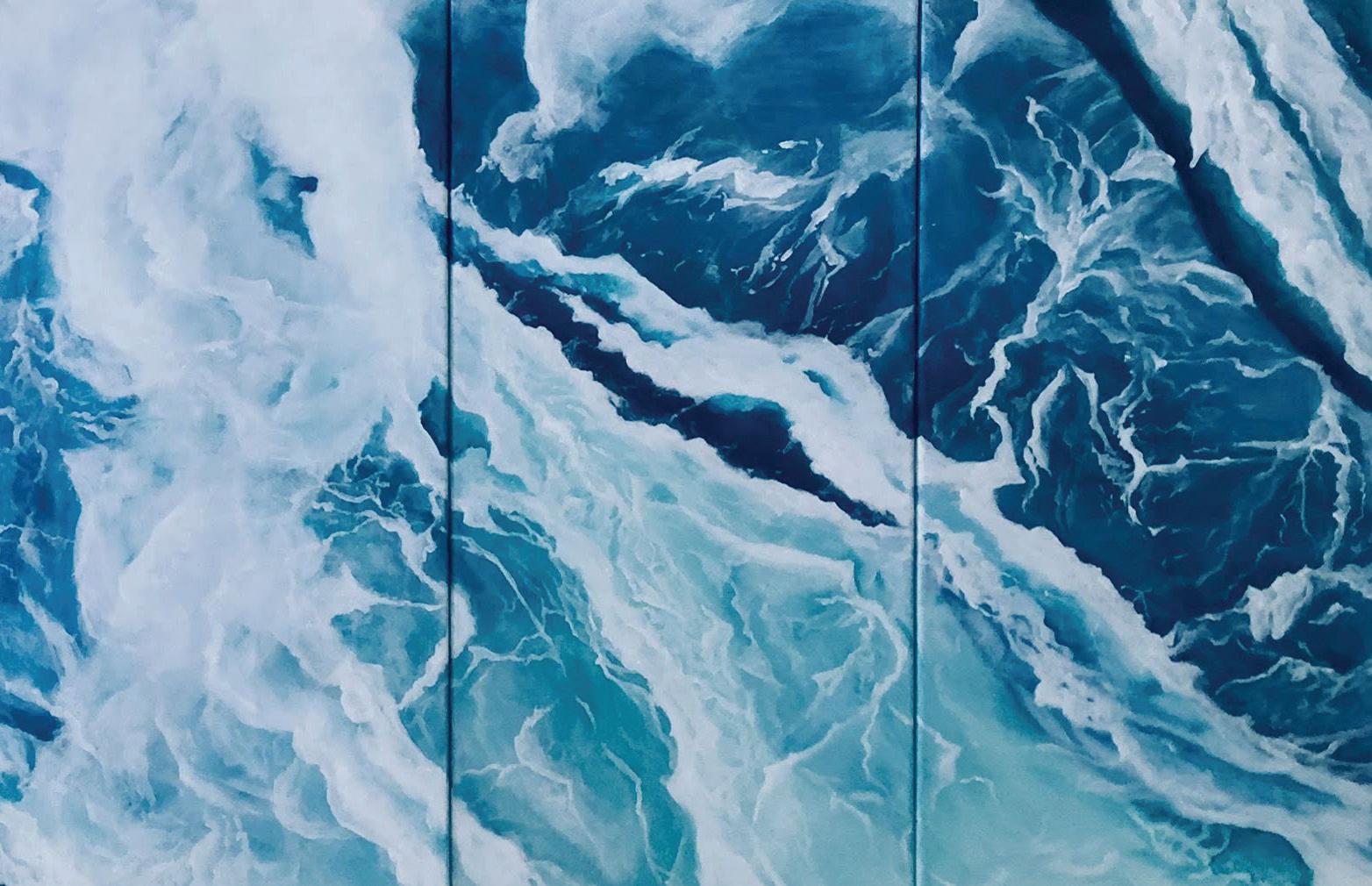
Sarah Li Water II 93
The Glove Department
Ying-Chu Chen
When you work in the glove department at Neiman Marcus, you are selling things that nobody buys anymore. I’ve gone by the same exact routine since my first day ten years ago after a (then) exhilarating job interview. Tasks are so familiar that I could do them with my eyes closed and teach them to the next round of young interns. But they aren’t hiring anymore. With each year, our staff has dwindled, and my skills have become more ingrained into my instinct. I’ve become a master and slave to my services.
Friends and family tell me to move on. My aunt’s got a new job at a tech company, and even my eldest sister is learning what it means to code. I’ve heard my cousins are now working at a startup to replace people like me.
My parents have heard it enough, so now I’ll tell you the exact fabric, time of the year, and place in the world each pair of gloves were made. I’ll tell you the story of those gloves, and my special affection for those pairs where each individual glove holds a separate tale. Don’t worry, they are usually reunited. The majority are.
Portolano, classic leather and the simplest style you can find. Black for your normal work day, and tan for the weekend escape to the country club on the coast of Long Island Sound. The gray is actually a hue of sky blue, see, it reminds me of Gatsby. I suggest not to purchase unless you would like the spotlight that comes with it.
Loro Piana, goatskin leather and cashmere-lined. Any color. It was a favorite back then, though I always thought they were worn by businessmen with shady confidentials. Or it may be that every man who has gone through the entrance’s towering brass doors has held at least one grave secret.
Dents, my preference. Made from wild South American boar, imported and crafted in Europe. The quality is always much better than here in America, which also makes it the most sustainable. Pardon me, no, not for the environment. It is durable for your lifetime.
You see, I’ve found everything there is to know about gloves. And when everyone has moved on, I’m just stuck knowing everything there is to know about gloves.
On the oversized sidewalk, colossal window-lined street,
94
I see figures rushing and squeezing past. Yes, I see the ladies in their high heels, and with their naked fingers showing off their newest ring that was perhaps an anniversary gift. Yes, I see the young gentlemen coming out of work, clutching briefcases with their bare hands. But I know my fingers well enough to know that if I walk out there, without my gloves, I might as well be nude strutting down 5th Avenue.
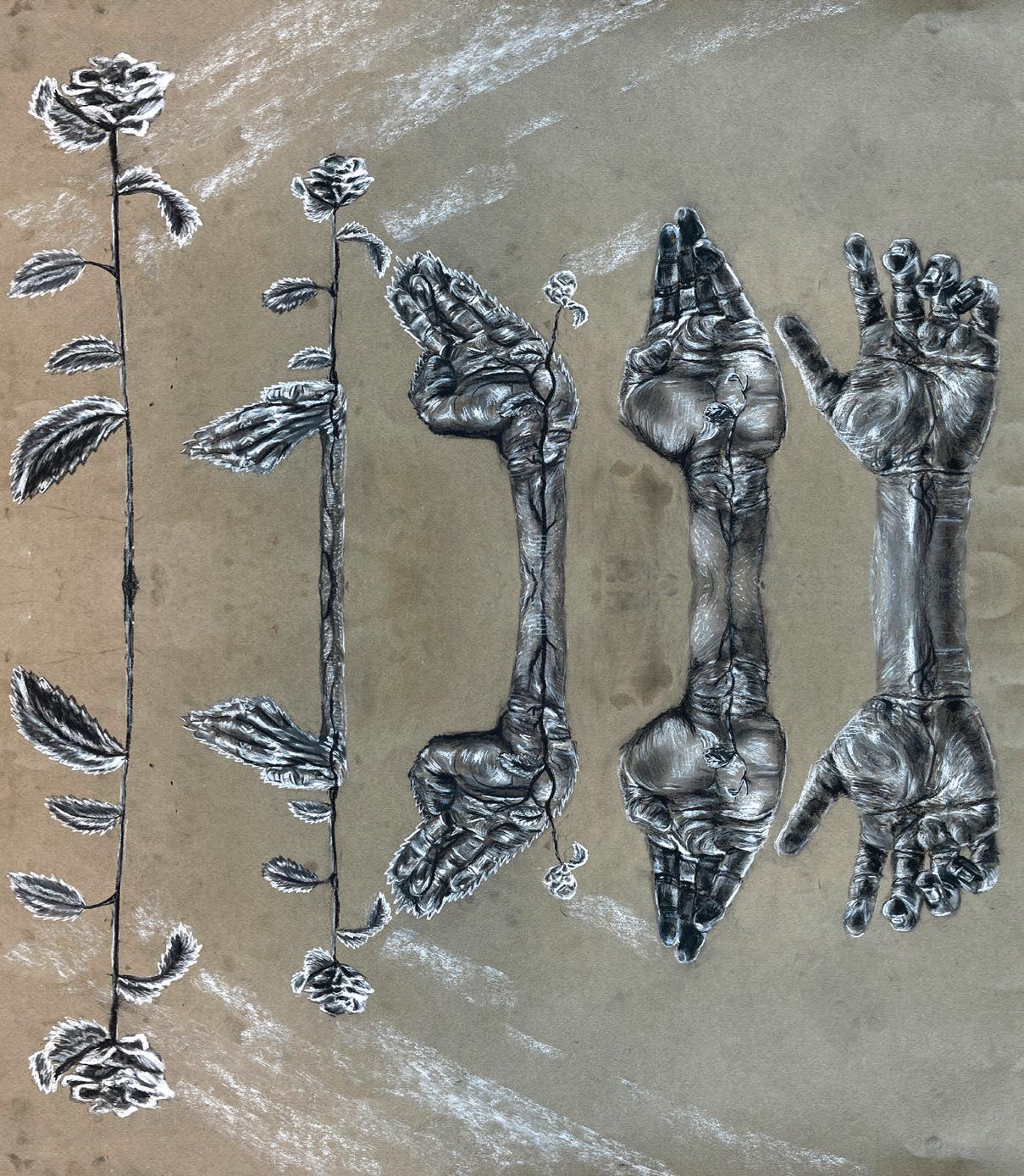
95
Grace Sullivan Transformation
When Did Samhain1 Become Halloween?
A golden shovel of “The Golden Shovel”
by Terrance Hayes2 Serena Evans
What has it become? Streets lined with inflatables depicting magic, kids standing in queues all night long, their parents tapping their feet to the beat of a clock. In
the sky not a single star, only white smoke slithering through the air, the crowd shivering feverishly. Endless corners in the field of wheat, the middle
trampled by thousands of tiny feet, a labyrinth that can be seen on the top of the forest trees. Some scare, some squirm in fear, some leech off of the
endless sugar, drowning in its artificial flavors. Wrappers litter the bustling street, crunching with every step and blowing in the breeze, their last whispers swallowed by the rustling trees. While some retire soon, night lasts hours for others. Costumes of white and black and gray we wear. Swords, knives, and spears in every child’s hand. Watched by dentists who sigh year after year, handing out plastic white bags, the offices bursting when the morning birds chirp. The only judges are the moonlit shadows who lurk in fury and rage, waiting for the offerings and prayers on lawns
1 Ancient Celtic festival during which people fasted and made offerings to monsters and ghosts they believed passed into the world of the living on that night every year.
2 In a golden shovel, the poet takes one or more lines from a different poem and uses each word as the final word of the lines in a new poem. Terrance Hayes’ poem, “The Golden Shovel,” invented the form using Gwendolyn Brooks’ “We Real Cool.”
96
and the sweet sound of rumbling bellies that haven’t eaten in days. And yet, despite ancestors bending on their knees, their hands pressed tightly, a
lack of respect remains. For who even remembers the past? Your neighbor?
Certainly not. So who will count the days until the monsters once again strike?
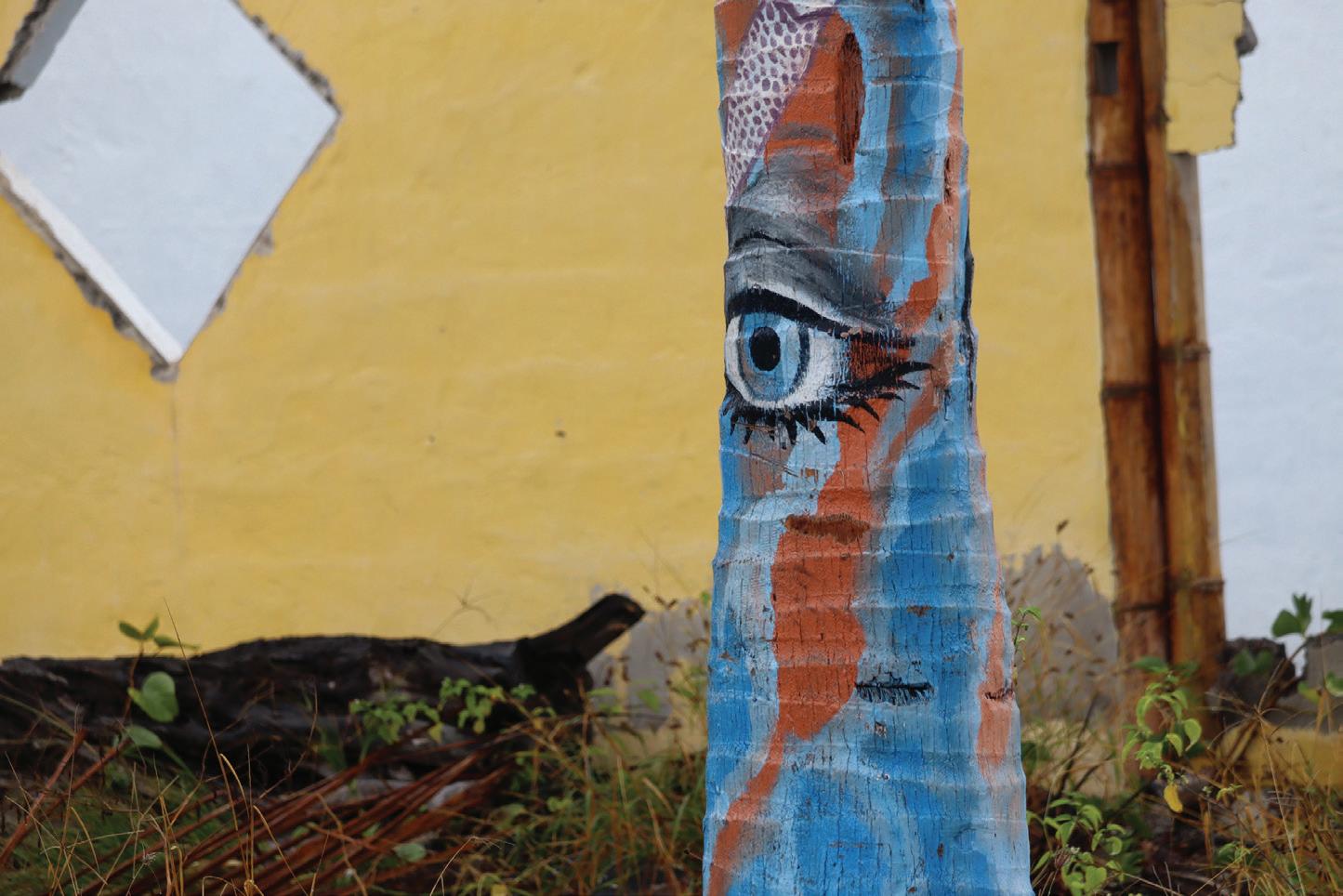
97
Kristy Keil Ojo de Isabela
 Alicia Qin
Alicia Qin
98
Comfort
Lloyd Crofton’s Winning Goat
Alessia Cutaia
It is important to note that Lloyd Crofton was always a contemptible man. Like his father, and his father before that, the Croftons had always been isolated from civilization, except for their annual trip into town. The Croftons had come to be known for their dairy goats, one particular goat which Lloyd Crofton held especially close to his heart had a silky white coat and was guaranteed to produce the most milk out of the flock. The goats and the Croftons live on what came to be Crofton Farms, and if you ask any folk in town how to reach their lamentable dwelling they would tell you to drive up the rocky pathways, up the mountain where the clouds began to fog your windshield, past the large grassy hill, and then you would see the old oak paneling and the warped shutters of the Crofton residence. The Croftons lived above the town, perched on a weathered mountain, and if you stood in the center of the village, it almost looked like the house wasn’t there at all.
To any sane person, the farm reeked of manure, the goats screamed unholy tunes, and the house, being lived in for generations, was dilapidated and the paint was worn away. George Tristram was greeted with just that, but he enjoyed it. He enjoyed how he could overlook the town, how the chimneys blew their smoke across the valleys that surrounded them. He enjoyed looking down on the rooftops and watching how smoke blew across their patched roofs. How small the townspeople’s lives seemed from the Crofton’s, George thought. He was especially intrigued how the mountains hugged the farm. He wondered if he yelled whether anyone would hear it?
The reason for George’s prompt trip to the Crofton’s was partly because of his own curiosity but most importantly because he was looking for his brother, James. When George peeked into his brother’s room that morning, he was not in his bed. George noticed the trails of mud his brother had tracked down the stairs and out the door, down the pathway, and even into the square. George had heard the drunken whispers of his brother, how he had planned to travel to the Crofton’s house. He heard whispers of Mr. Crofton’s goat, whispers ending in “tonight.” So naturally, George set out to find his older brother and confront him about his plan. George put on his rainboots and took his raincoat in case
99
the thick clouds in the distance became more menacing.
Hours before, the other Tristram had ventured up the Crofton’s hill. He too had admired the small lights of the village from the farm, though at night, the absence of light concealed the patched roofs and the smoke that blew across them. The air was sweet and heavy following the rainstorm earlier that day, and James, slightly intoxicated, didn’t notice the Crofton’s disheveled house or the stench of the wild stock. Nor did he notice Mr. Crofton’s bedroom light flicker on. He hadn’t realized that his presence was noticed when he stumbled toward the pen of animals, the goats waking and shrieking softly. He especially didn’t notice Mr. Crofton’s footsteps as he closed the front door. The mud squelched under Crofton’s feet; he too felt the thick air in the summer night. James, on a mission to find Crofton’s winning goat, could not differentiate the dark masses in the night. He fumbled around the enclosure, the more he touched the coarse coats of the animals, the more they rose and shrieked. Crofton’s pace remained constant until even James noticed the slow thump of the old man’s feet. He slowly turned, feeling the animals rubbing against his legs as they stood up. A dark figure, larger than he was, stood behind him, shovel in hand. As the man came closer to James and the moon illuminated his face, James recognized the menacing look on Crofton’s face, his readied stance, the rising and falling of his shovel and the large thwack it made on his head.
George looked toward the house, its large blue door. He thought it was possible that his brother might be inside the house. George imagined if he knocked on the door, Mrs. Crofton would greet him with a spatula in hand. He would smell Crofton’s breakfast and the sizzling of sausages. He then would be invited in the house and sit next to Lloyd Crofton, his coffee steaming. Then, at the table, he would find his brother, napkin around his neck, fork in hand. Yet, George thought it was impolite to knock on their door so early in the morning. So, George, like his brother, was drawn to the goat enclosure. In the daylight, George could spot what must have been Crofton’s prize goat. Her white coat shone free of mud like the other animals. Peculiar, George thought. He wondered how it was possible that a goat stood so brightly in the mud considering the rain. George studied the remnants of mud on the goat, which only surrounded its ankles. Above the wet, dark substance, George believed he saw something out of the ordinary. A red outline of blood just above the hoof. It looked dry, caked under the mud. He opened the fence to get a closer
100
look. The goats, now awake, circled George. He fell to his hands and knees, jeans soaking up the moisture of the ground. From a closer look, the red was indeed blood. He furrowed his brow.
A quiet screech echoed towards the little boy. Crofton stood at the door. He was taller than he looked in the pictures, stalkier. George stood up, and started towards the man. Crofton must be here to welcome me to breakfast. To say James had stayed the night for it was too dangerous to walk back down the large hill at such an hour! George smiled at Crofton as they walked towards each other. George thought it was strange that Crofton carried a shovel with him. He thought it was strange that the mud looked fresh on the equipment he carried. But it was something else that caught his eye, a glint of red on top of the rusted metal. He thought it was particularly strange that Crofton had not hollered for him yet; instead, the man kept silent. “Have you seen my brother, James Tristram? He came here last night…” George said, eyeing the shovel.
“Why don’t you come inside,” Crofton hoarsely suggested.
“Well…alright,” George didn’t want to be impolite and refuse Crofton’s offer. Besides, his knees, soaked from the mud, were becoming cold and goosebumps started to form on his arms. He walked up the pathway leading to the old house, and Mr. Crofton stayed closely behind him. As he walked through the doorway, George noticed that Mrs. Crofton was not there to greet him, and the warm house George had pictured was replaced with the stark morning light spewing onto an empty kitchen table. George did not notice that Crofton never wiped his muddy boots on the doormat, that he didn’t even close the door, that Crofton kept the rusty shovel in his hand.
101
But Then I Met
But then I met Michael.
Scarlet Fishkind
Michael’s button-downs were always anxious, holding firmly with their tight grip.
Michael’s eyelashes were long enough that you thought about them.
Michael was the type of guy that carried the Communist Manifesto around not because he was a communist, but because he was the complete opposite.
Michael’s lips were chapped and flaky like they were too disappointed to stay on.
Michael seemed extremely confident, but you struggled to think he was truly happy.
We have all met Michael, we all know Michael.
But then I met Shawn.
Shawn was the type of person that made you wonder what his room looked like.
Shawn called over the waiter.
Shawn walked slowly, with his hands in his pockets and his face toward the wind.
Shawn loved his siblings but didn’t know them.
Shawn didn’t cry when something tear worthy had happened, but always held tears back when he saw The Mighty Ducks
We have all met Shawn, we all know Shawn.
But then I met Charley.
Charley had unique, riveting interests that didn’t seem like they were unique, riveting interests because he wanted you to know they were unique, riveting interests.
Charley listened to Elliot Smith but never listened to the lyrics.
Charley approached you, made perfect small talk—small talk so miniature that the stomach butterflies forgot their cue.
Charley had the type of face that was delicately beautiful, but only if you tried to take a deeper look.
Charley made you feel pity and you didn’t know why.
We have all met Charley, we all know Charley.
102
But then I met Oliver, Ryan, Travis, Nathan, Jackson, Tyrell, Roman, Harry, Hank, Max, Walt, Jerry, Justin, Kent, Jonathan, Chris, Jacob, Nolan, and Josh.
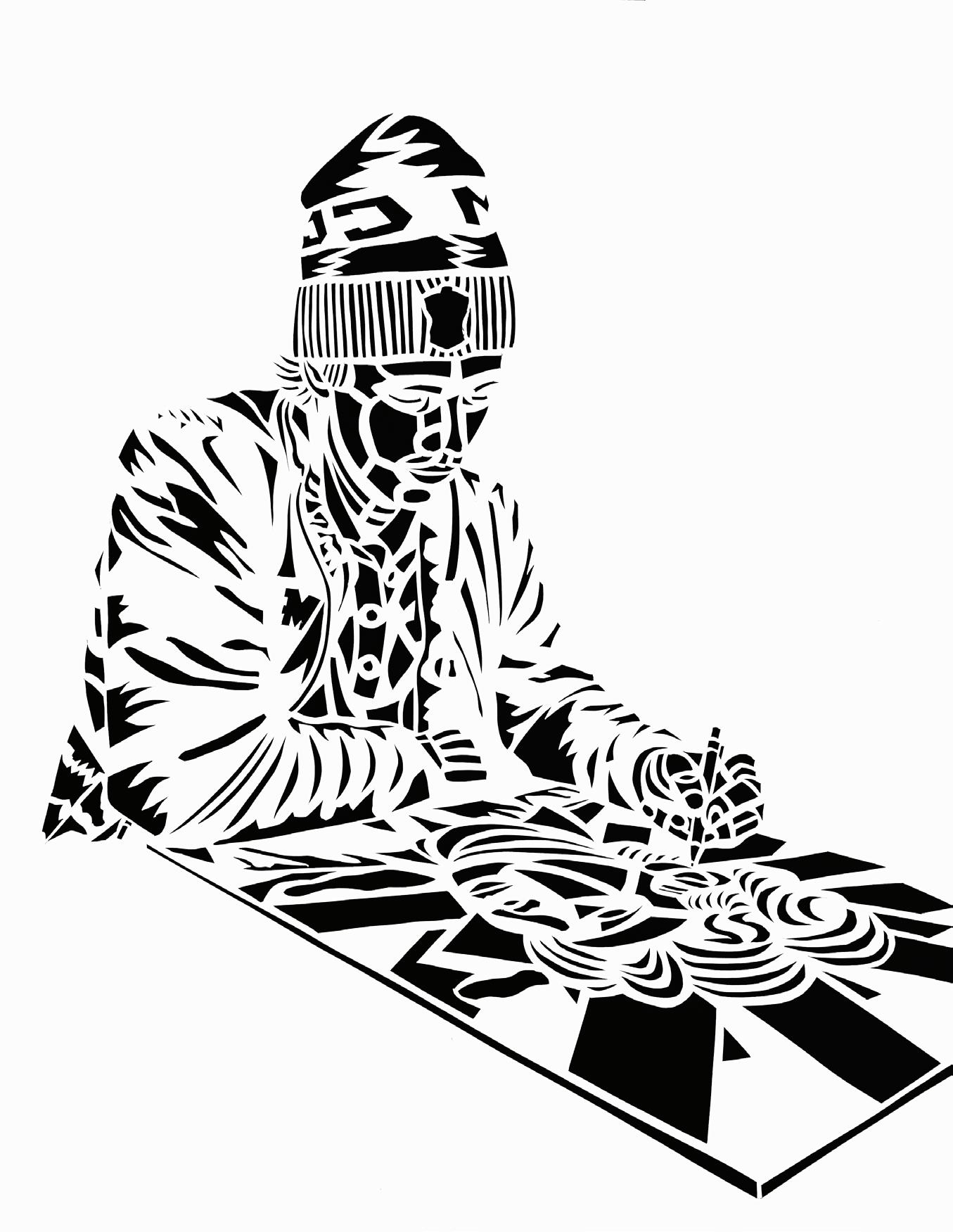
103
Jake Minella Self By Self
A Problem for Another Day
Melina Salame
I stared into the white-framed mirror of my bathroom. Aside from my hair in its typical, tangled, post-nap fashion, my bright pink pimple cream, and my dirty t-shirt, I looked exactly as I had before my nap. I was well-rested for the very important night ahead of me.
Life hadn’t felt real lately, not since Aiden finally made a move. I had liked him for such a long time, thinking the feelings would never be reciprocated. But then, last month, I remarkably emerged from the friend zone unscathed. About time, if you ask me. Tonight, he was finally taking me out on a date.
That being said, nothing had been quite as surreal as this. A long strand of skin, anchored to my lower back, hung limply past my knees. As I picked up this…tail, I half-expected my hands to pass through it as if it were some sort of hologram. To my horror, it was very real. A trail of slime was left on my outstretched palm, which had now begun to shake. I slapped myself in the face, hard, and when the tail still dangled, I did it again. I climbed back into bed and forced my eyes shut. I counted to 112. When I rose again and went to the mirror, I half-expected this nightmare of a thing to start wagging as I stared at my reflection.
This commotion had already stolen valuable moments of my time. Aiden would be at my house in 37 minutes. My blowdry window was quickly narrowing—I could see the crown of frizz beginning to poke from my head through the leave-in conditioner. But canceling was not an option. I did not pine over this boy for 412 days to cancel our first date. “Just Keep Swimming!” I don’t think that Dory could have predicted the abomination that was currently growing out of my backside, but it was good advice nonetheless. I resolved to continue getting ready.
Listening to my “get up and slay” playlist, I dove into my familiar going-out routine. I was rushed after 32 minutes of attempting to will away my new appendage, but aside from the obvious, I looked good. No pair of jeans I owned had any chance of fitting over my little friend, so I resolved to tuck it into the back of my pants as best as I could. I tied a sweater firmly around my waist. It was certainly risky business, but the sweater hid it well enough, given the circumstances. Aiden could not have picked a more lovely place for our date. My favorite Italian place, with good food
104
and an even better ambience. The first five minutes of our dinner were somewhat awkward. I had no experience sitting with a tail, and repressed the urge to perch atop my chair on all fours and let my tail hang free like a rat. Thankfully, I was successful. I knew zero people who had impersonated a rat on a first date and been offered a second one. I attempted to engage in conversation with Aiden instead as I untucked my tail from my pants and let it dangle on the chair. You would be shocked at how easy it is to ignore a two foot tail protruding out of your back when the conversation is truly engaging. A cute old couple was chowing down at the table next to us. They had smiled at us when we sat down and the old man had winked at Aiden. Dory’s advice was growing on me—it had all turned out alright. He paid the check and stood up to leave. Forgetting my circumstances, I stood up too, and to my horror my sweater dropped to the ground behind me. I stood motionless for a moment. My tail was hanging behind me and gently swinging back and forth. One false move and it would swing out from behind my silhouette and into Aiden’s view. “Uh, I can get that for you,” he said. After standing motionless for an abnormal amount of time, I practically yelled at him, “No, I got it!” I would not drag him into this tragedy. Scrambling, I grabbed the only thing in reach.
Hurled with precision as if my life depended on it, my water glass shattered right against the leg of the old couple’s table. Aiden turned around in disbelief as he stared at the shards of broken glass. After taking a split second to admire my aim, I snatched my sweater from the floor and secured it around my waist. I finally let out a breath as my tail was safely obscured from view. Meanwhile, Aiden was attempting to console the old couple. They were very alarmed by the crash and looked at me with fear.
“I’m so sorry, I must have had a muscle spasm or something. I can’t believe that just happened!” I pleaded.
Aidan looked at me as if I was a freak, but then he simply shrugged. Eventually, I managed to convince the old couple and the manager of the restaurant (who had been summoned) that I was not in fact a violent individual trying to injure them during their dinner. Aiden and I left after leaving an appropriately hefty tip. I had a feeling that it would be in our best interest to try a different Italian restaurant if we ever went on a second date.
To my dismay, that prospect was looking pretty grim. Although I thought Aiden had believed my muscle spasm claim, he hadn’t stopped looking at me like a freak since we left the restaurant.
105
Telling him I was concerned about my muscle spasms returning, I convinced him to drop me home early and skip out on the movie we had planned after dinner. I left the car in a rush as soon as he pulled into my driveway and ran inside. Hiding a tail for three hours is an indescribably draining experience. I climbed right into bed. There was no way I was getting a second date. I lay in my bed, uncomfortably positioned on my stomach so as not to crush my tail. Tears filled my eyes—I had been waiting for this day for so long. Not only had I ruined my chances, but the tail showed no signs of disappearing. As I drifted off to sleep, I was stirred from my hazy rat-ridden dreams by the buzzing of my phone—a message from Aiden. I opened his chat, prepared to read that he was blocking me or that things were just not going to work out. I had fun tonight. Good luck with your muscle spasms. I responded quickly, put my phone down, and closed my eyes. The rat-like strand hanging out of my back was a problem for another day.
 Ainsley McKee
Ainsley McKee
106
Skin and Bones
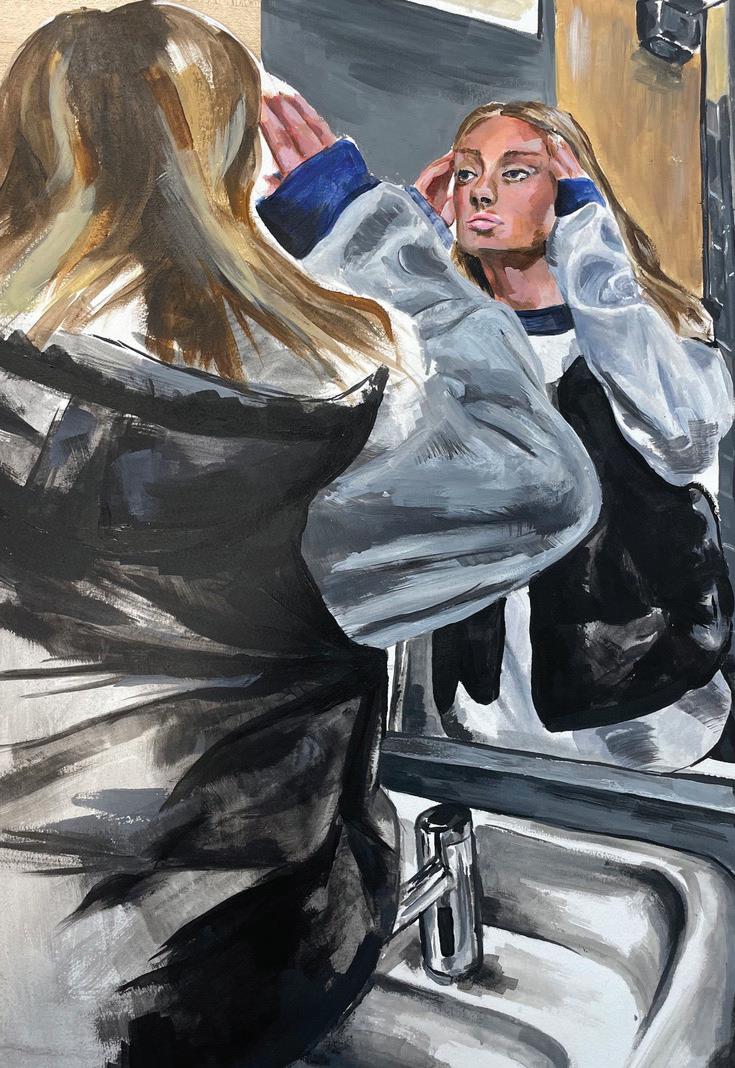
Ainsley Mckee Critique 107
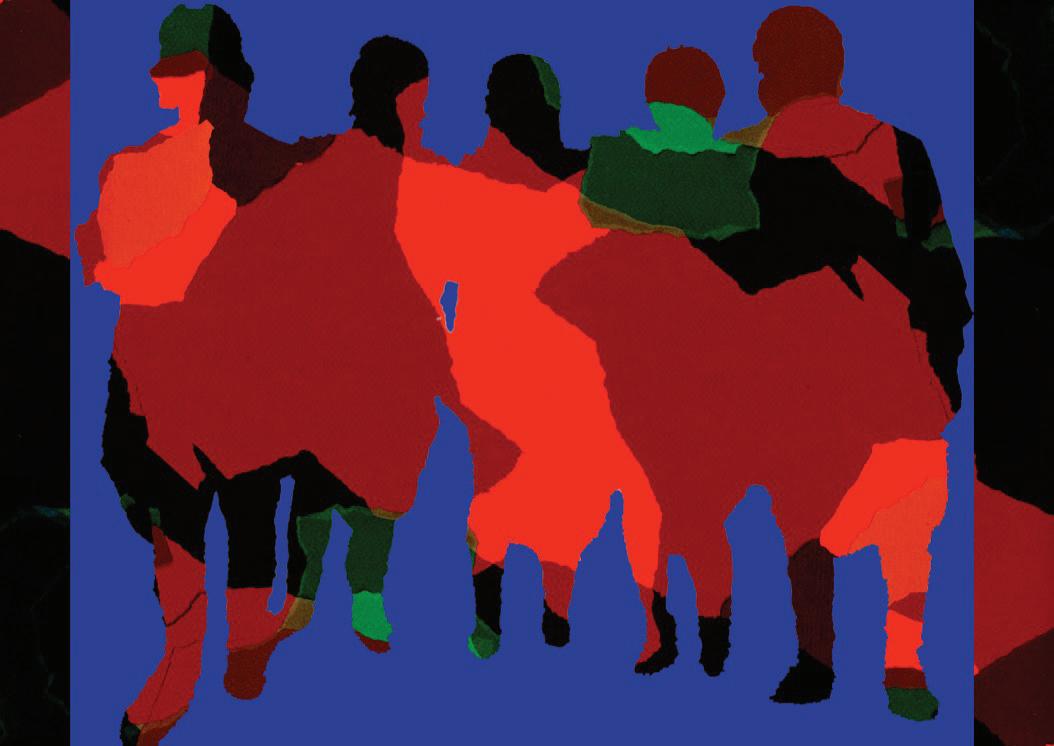
Asher Benn In a Crowd 108
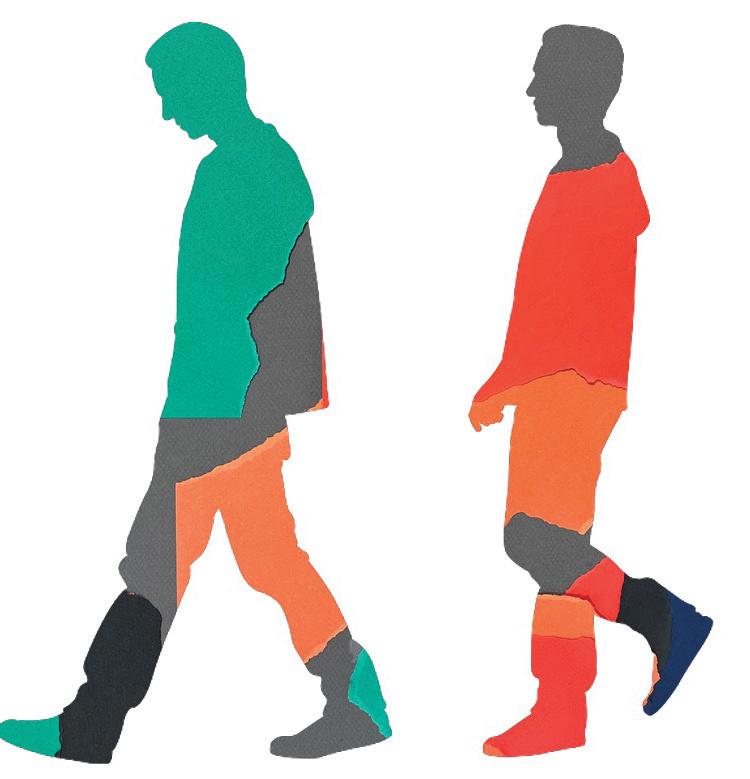
Asher Benn Walking Alone 109
Monday, 4 AM
Sara Raghavan
The world is quiet at 4 AM on a Monday. The whistle of leaves fluttering against the shutters, the low hum of insects and toads all harmonizing. My candle burns furiously, and aromas of balsam fill the air.
I pull my blanket closer. It is purple because my eight-year-old self was obsessed with that color, and this blanket is from that era. Do you remember that? How long has it been?
The glow of my laptop illuminates my face. My view out the window is entirely one shade of midnight blue. If I close my eyes and open them, I see no change. Maybe that’s the point. I open the porch door, gently closing it behind me. And for a brief moment my breath calms. It’s cold. Colder than I expected it to be.
I can’t help but think of you out here. After all, I’m standing by your favorite lawn chair. You would have loved to experience this night with me. Perhaps I’ve gotten to that point in the morning when everything seems so melancholy and yet so peaceful at the same time. I should probably rest.
But if I rest, I wouldn’t get to see the sunrise. You would throw me the sun from across the pond, and in my slumbering, I would miss it.
So I’ll sit here until the view with my eyes closed contrasts what I see outside the window. The car engines will start up again, commuters heading to work. I’ll be standing here by the lawn chair. Maybe I’ll grab my purple blanket if I get too cold.
Oh, there it is! Is this the same sun you see?
110

111
Zara Kurbanov Binney Park

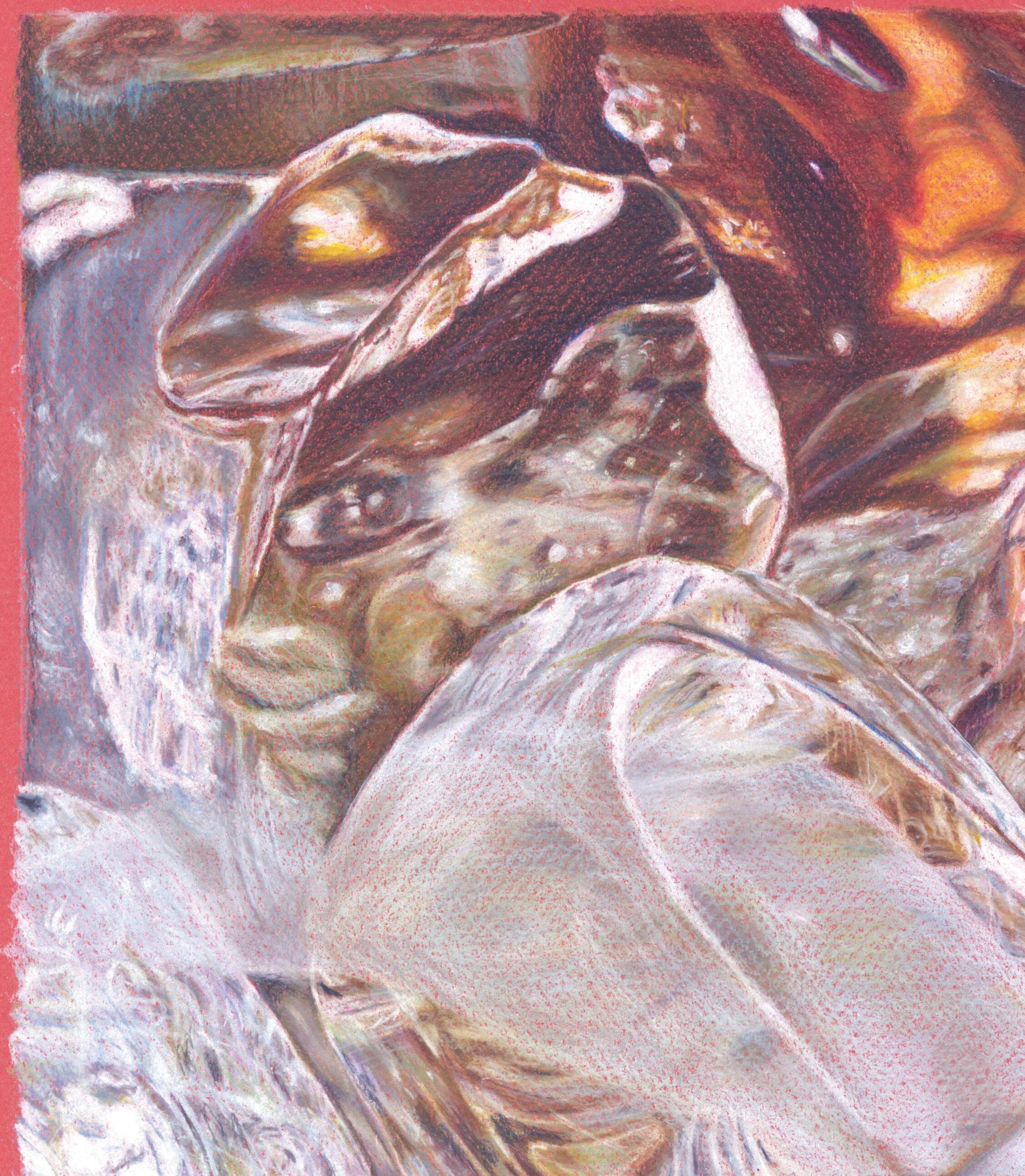
But the Air & Sky Are Free But the Air & Sky Are Free But the Air & Sky Are Free But the Air & Sky Are Free


Oh the Patterns
after “In a Time of Peace” by
Ilya Kaminsky Ella Kurtz
In a time of peace the road to Toledo is lined with daisies, but the road home is filled with clovers and blades of green, green grass.
While the cars stop at the ever-blinking lights, the cricket cries once again, singing its warbling song: it is a time of peace.
The birds, filling fields with their cries, succumb to the whispers of the wind and the beauty of the daisies and the harmonies of the rain.
As the sun and the shade graze the bodies of motionless sparrows, we are reminded amidst clovers, three and four, it is a time of peace.
Daisies line the road to Toledo, telling us that we live in a time of peace. The birds who sang kiss their wings folded.
114
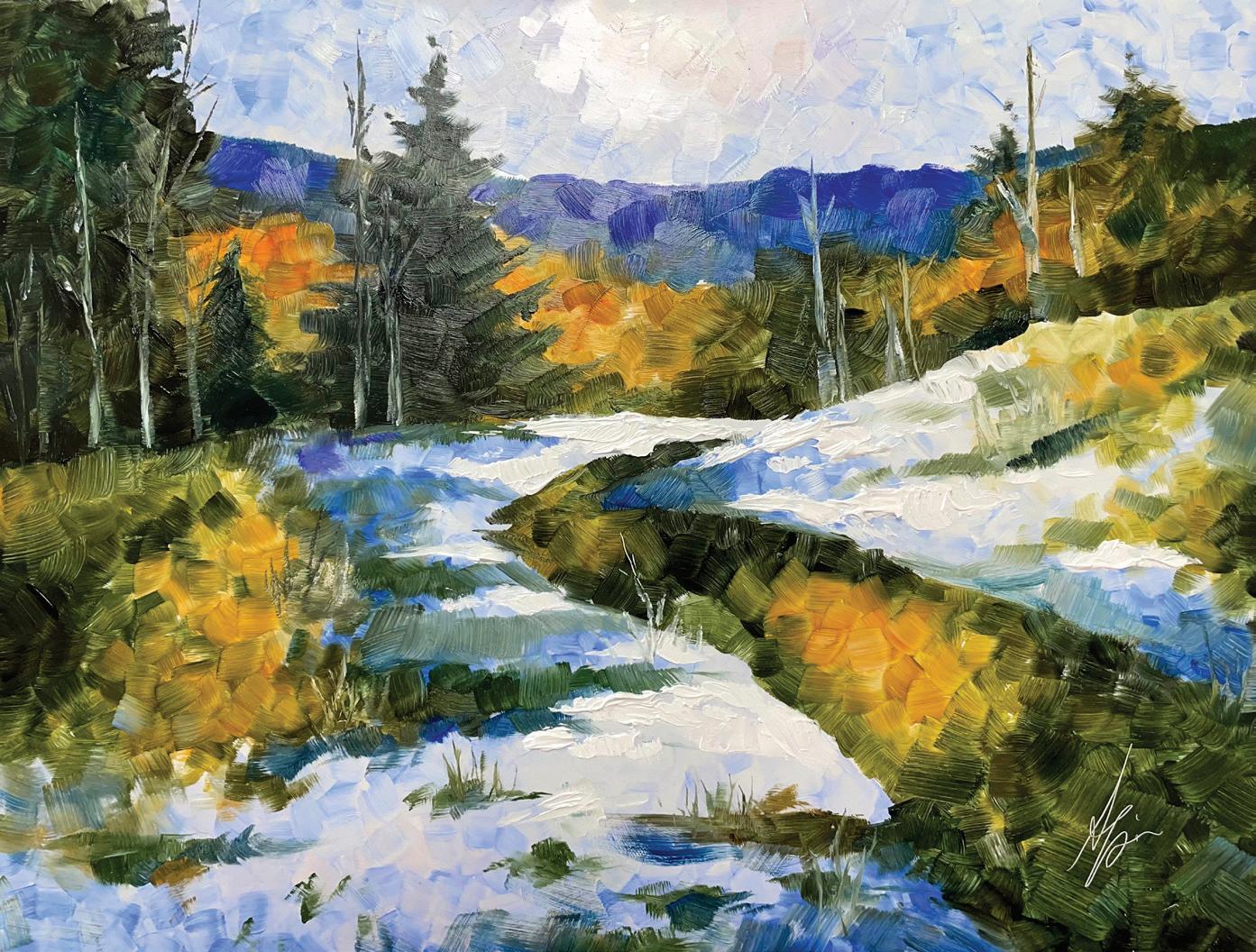
115
Alicia Qin
In Winter
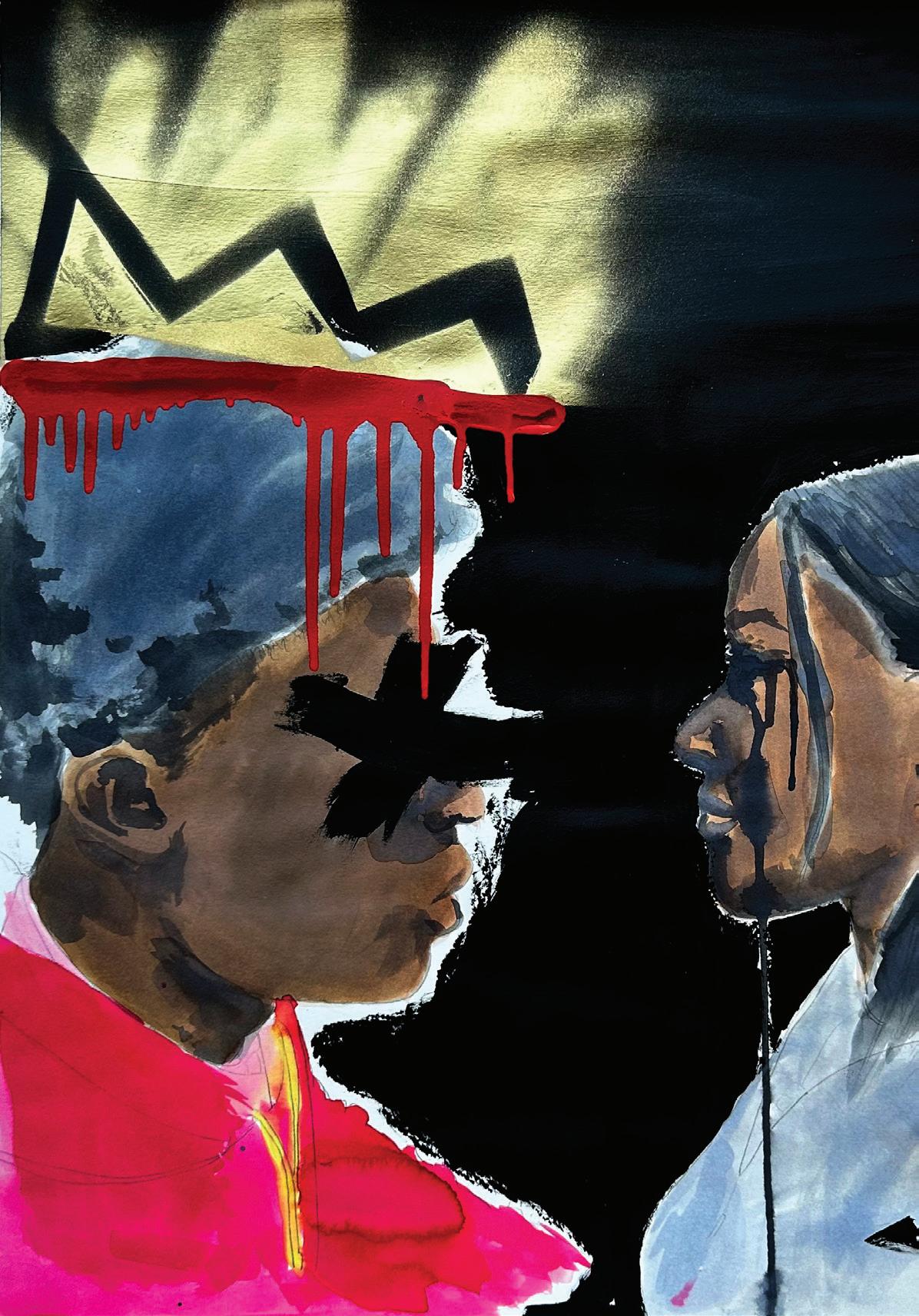
116
London Ulysses Macbeth
Tamir Rice’s First Art Show
At five-foot-seven and one-ninety-five, He’d be a giant if he were alive. Mother in tears, a sister on the ground, Threatened by arrest when the “gun” was found.
The jury decided his death was justified. The cop that murdered him would not be tried. The judge thought his life was worth six million; To them he was only one in eight billion.
A boy in a man’s body though he was, Tamir’s would-be beard was still just peach fuzz. He was talented, of the breed: “art nerds,” A poet whose stories were clay, not words.
Today could—should—have been his first art show. But his life was cut short. We’ll never know.
Emma Jones
117
I’ll Never Show My Hands
Here I go
Talking to myself again
I make faces on the road
And I’ve never felt more alone
I’m doing better, I think I’m doing better, I think I’m doing better
Tell me I’m doing better
Lauren Sun
I want to see your world come crashing through my fingertips, I Want to be the one you choose to teach what love is to I want to be 15 forever
Say I can be better than I am
Even though you know I’ll never show my hands
Here it goes
The entire world is laughing about a joke
I have never heard before Even more, I hope you’ll find There’s something wrong with how I tie back My hair
So you know I’m not the one you think you care for
I want to see your world come crashing through my fingertips, I Want to be the one you choose to teach what love is to I want to be 15 forever
Say I can be better than I am
Even though you know I’ll never show my hands
Maybe I’m genetically predisposed for Something out of my control to Tell me I wasn’t meant to be a lady
I’d like to die someday knowing someone found me pretty, I Think it’s getting worse again
Again 118
I want to see your world come crashing through my fingertips, I Want to be the one you choose to teach what love is to I want to be 15 forever

Say I can be better than I am Even though you know I’ll never show my hands.
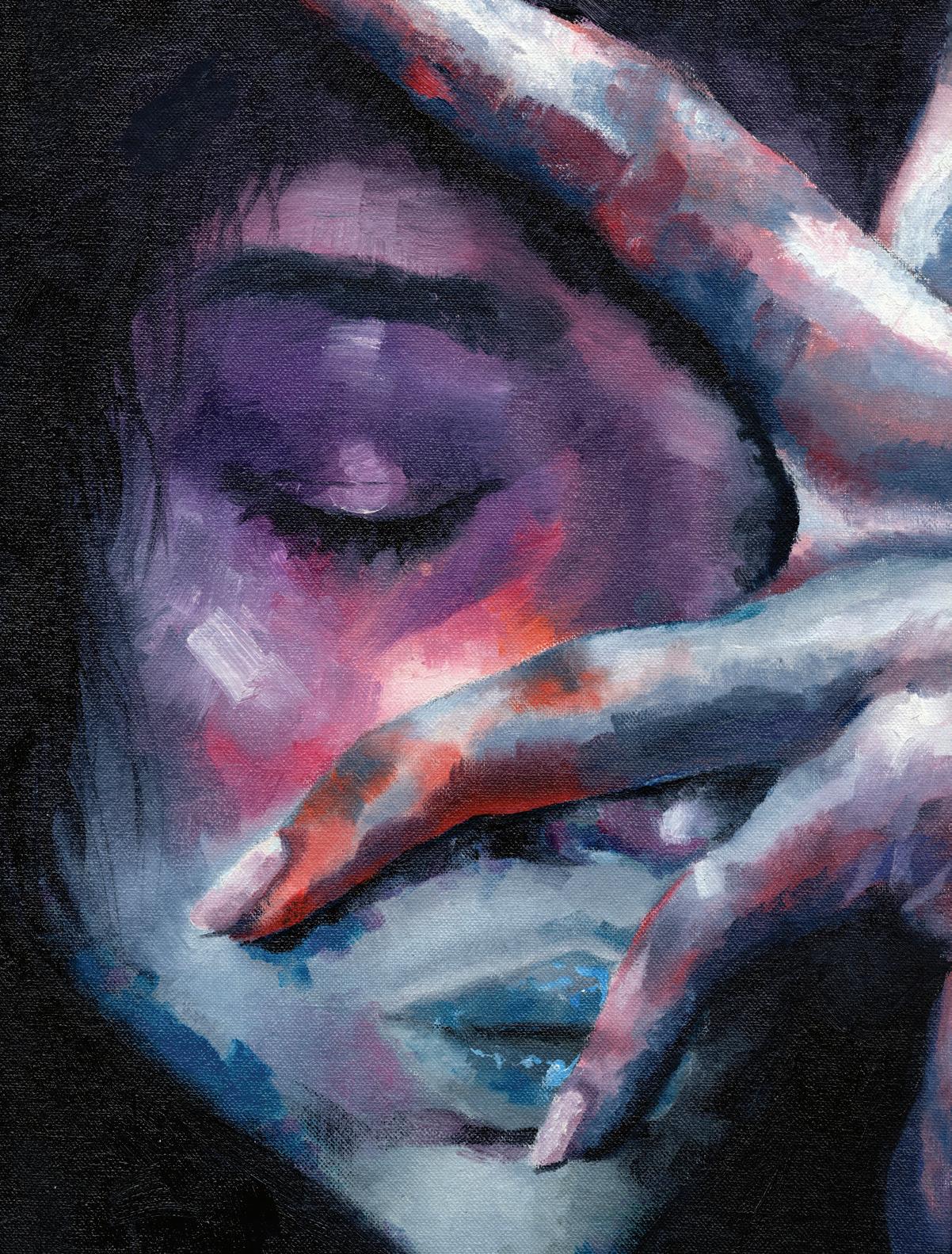
Watch the songwriter perform this piece! 119
Joyce Huang Blues
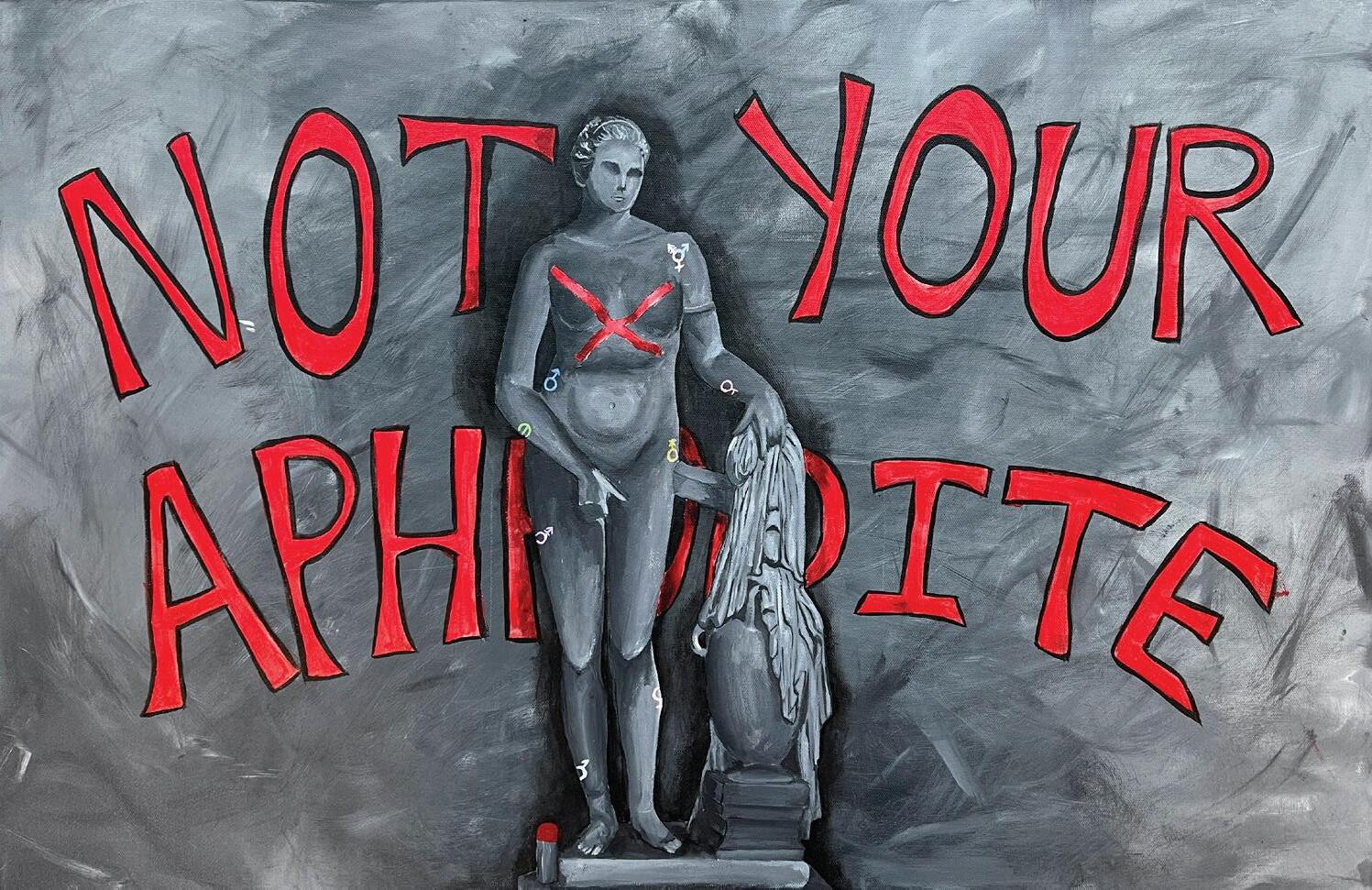 Honour Russell
Honour Russell
120
Not Your Aphrodite

121
Honour Russell Bound Freedom

Sabitsana
122
Sofia
Mirrors
Estranged
A golden shovel of “The Golden Shovel” by
Terrance Hayes Joy Akuffo
Like a feather in a pool of water we drift slowly apart without even saying a word, as if by coincidence we grew up and became women. I remember that one night when you left the tap on— you were incredibly ungraceful, as if you had spent the night at the bar. Past ten o’clock, you stood on two stools trying not to get your socks wet with water. Now, we drift like nothing through your mind, until there is no more water left.
123
The Moon and His Lover
Zara Kurbanov
“Shall we?” she said to none other than the Moon. The music began as the moonlight wrapped itself around her, gently persuading her to glide into the sky. The symphony crescendoed as she climbed the ladder of stars. They shine so bright, but could never prevail against the Moon, the kind and serene Moon. And so he held her by the waist as they sailed through the night, high in their graceful heights. Strung along by their endless melody, they lulled the world to sleep.
Hours passed as they soared in tune, but soon the ground began to glow, and her Moon began to wither away. “Oh, won’t you be back once more?” he pleaded. Reluctantly, she glanced at him before gently stepping down from the gleaming stars. A trace of a wrinkle could be spotted between her eyebrows as she pitifully whispered, “But I was never really here, was I?” The craters on his skin fell through to his heart. She was the melody they had been dancing to all along; she would never be more than notes on paper. She could never be more.
Her eyes twinkled as the Sun finally rose from its slumber, and started to slowly encumber the Earth, stealing her along with the night’s dark remains. Yet in her brilliant reflection, the Moon could finally see his own perfection. He closed his eyes, forever humming the wisful curves of his lover.
124
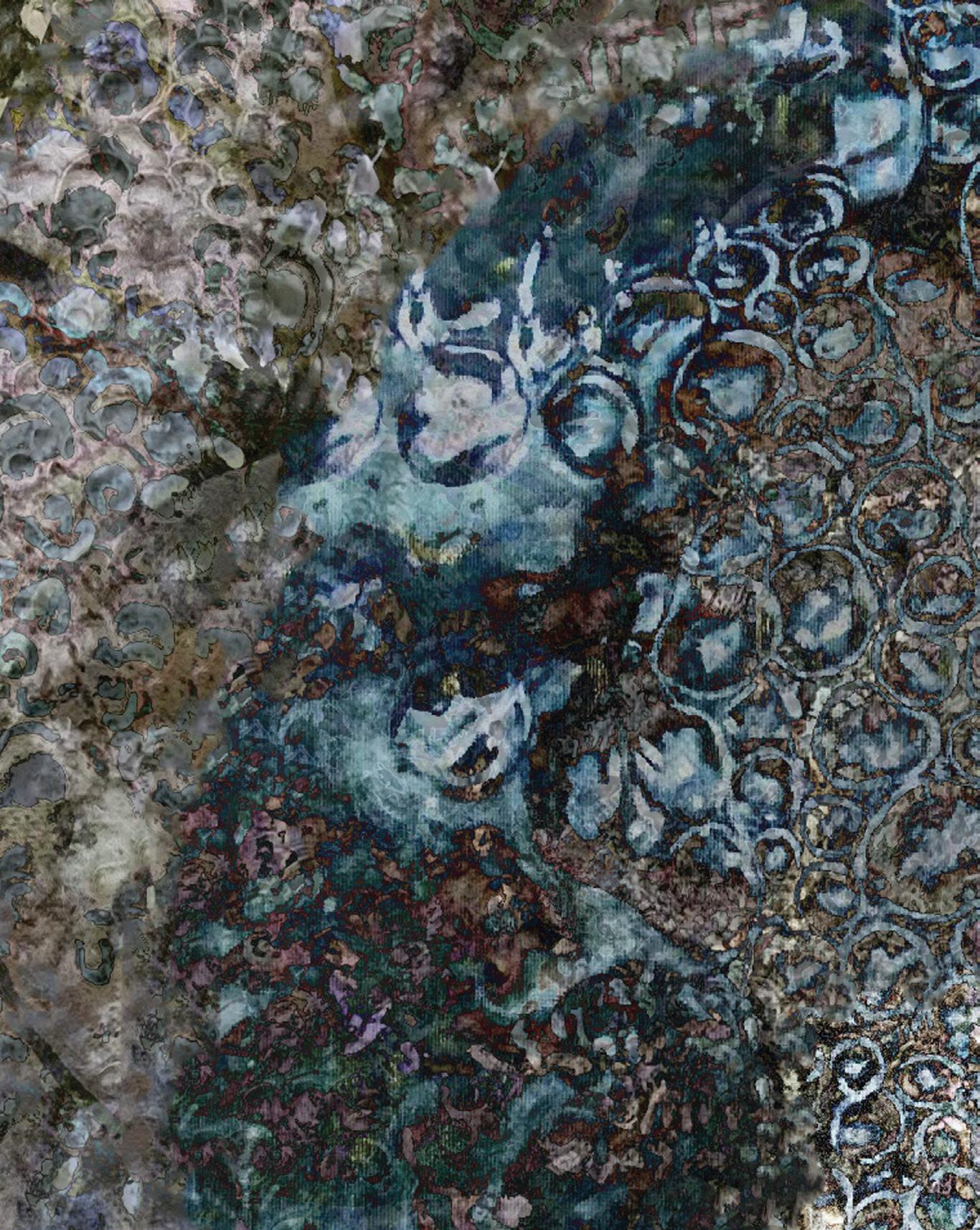
125
Zara Kurbanov Mystical Night

126
Zara Kurbanov Vortex
Pennies for a Purpose
Hadley Faulstich
They sit beneath rippling water. Passed through pockets and cash registers. Now, they receive a promotion. No longer a representation of the places on the right side of a decimal, their shiny surfaces hold dreams. From a wallet to water, we foolishly believe in their power. Something behind the face of a president and the copper coating inspires us to have faith in good luck, to put a price on hope. An idea becomes currency worth a few pennies. But wishes are priceless. If only we could have known. It might have saved you a few cents.
Following Pages: Persia Shipman Liberation
127
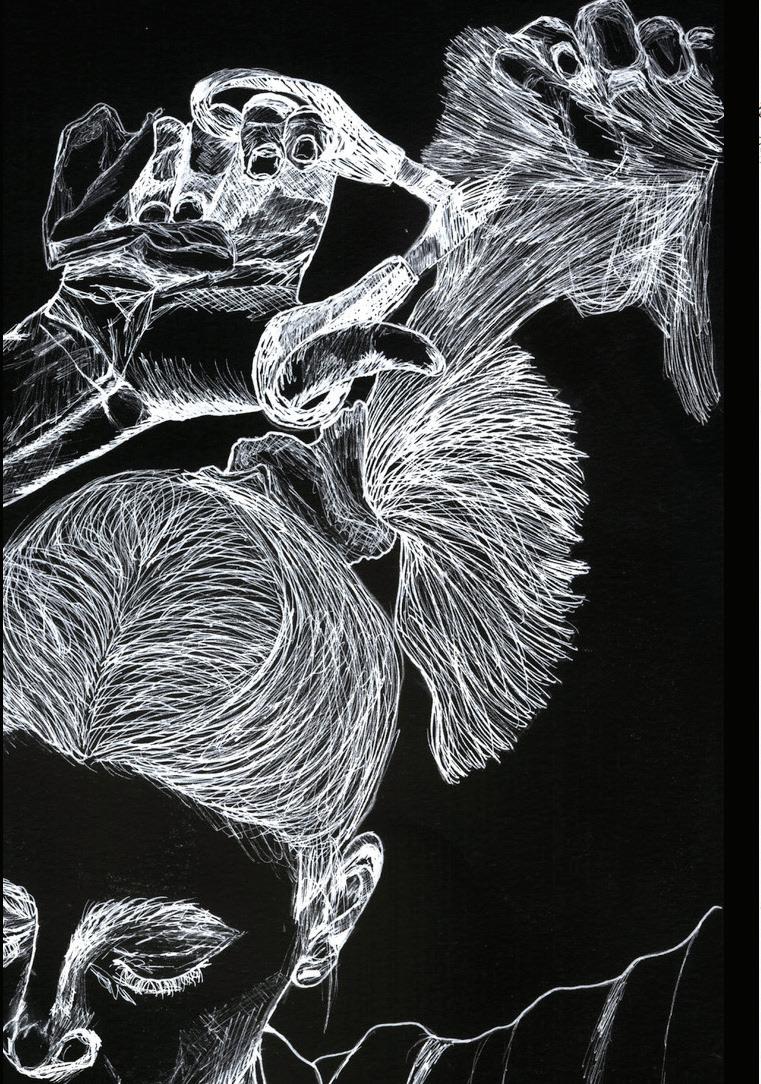
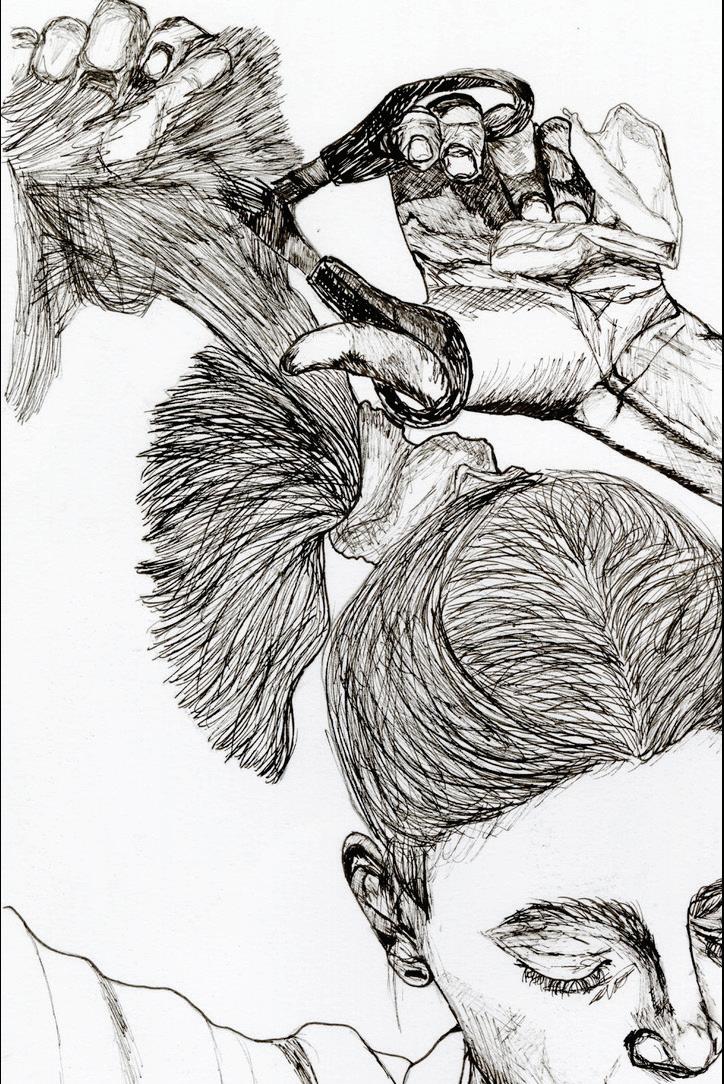
Letter No. 136
The tide comes in and out, in and out. Like a heartbeat.
Ashley Aufderheide
A pigeon soars above the seas through the darkened sky. Where to? England. I can hope.
The pigeon’s name is Tilly, her feathers a silvery blue, her little eyes black like licorice.
Tilly’s small, not even a pound. Yet the letter she’s carrying—my meticulously folded, creamcolored letter— is filled with words that carry the heaviest weight.
The goal is for her to make the journey from my small bungalow in Wicklow to your urban townhouse in Liverpool.
But that’s a mighty long journey. Will she make it? I can hope.
And while the letter appears to be so fragile and trivial in relation to the heartbeat of the tide, it is more consequential than the 135 letters that preceded it.
My Dearest Charlotte, I’m sorry. I’ve fallen in love with someone else.
Paul.
130
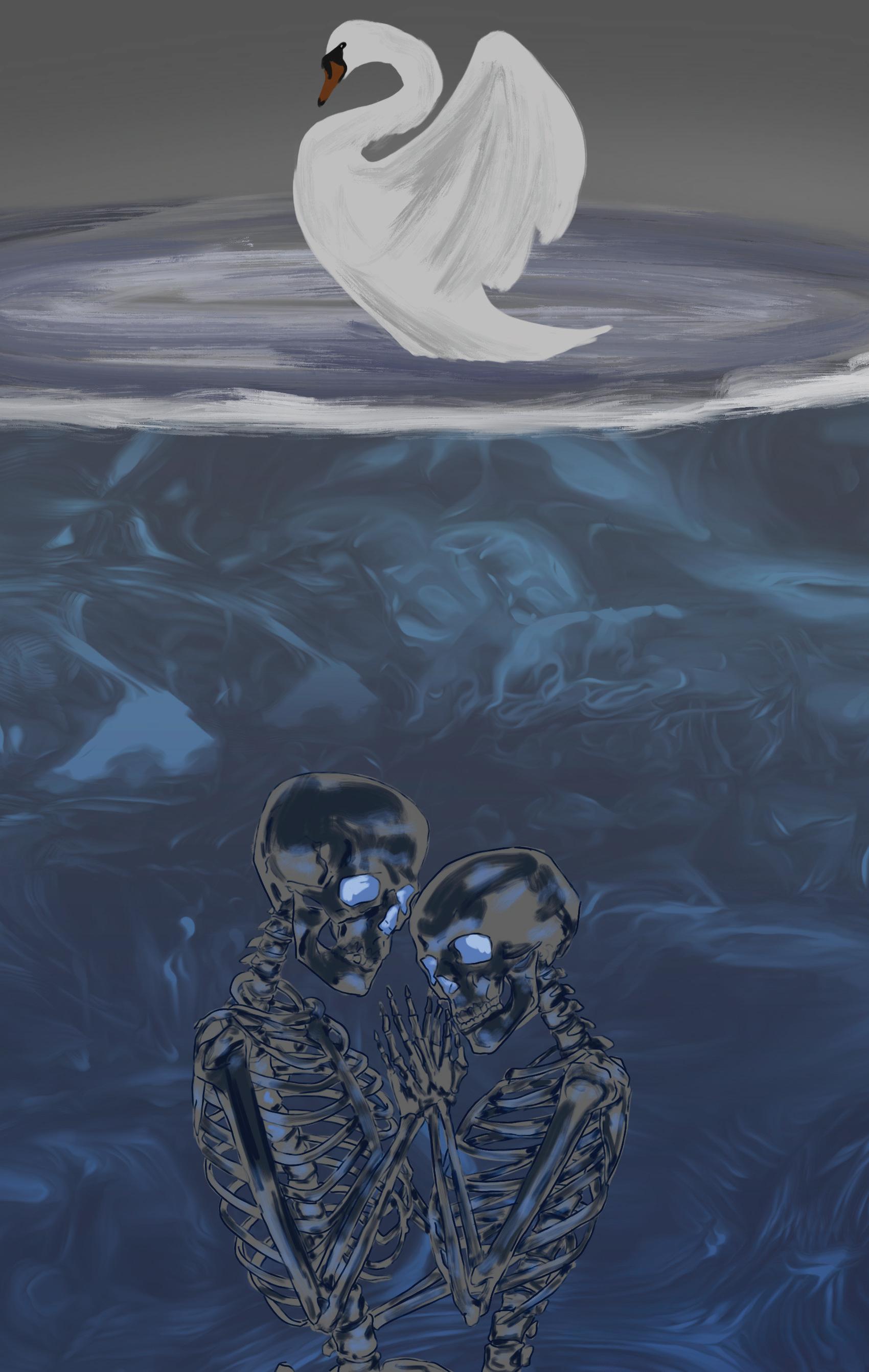
131
Honour
Russell Love So Deep
My Forever Love
Katie Nichols
He was so gorgeous, I felt my heart sputter and stop, like my car on the freeway last Friday. His eyelashes were luscious, almost as long as the pause of dreaded forgetfulness in that fifth-grade student council speech that returns to haunt me in the middle of the night. His lips were so full that I remembered just how much I had to pee, and I simply couldn’t grip the raw vacuum-sealed turkey breasts any longer.
As they slipped out of my hands and onto the floor of Stop & Shop, our eyes met. I saw the future. We grab lunch tomorrow, he orders a burger, I have a garden salad and pretend to be petite. We move in together in seven months, and all our useless stuff starts to intermingle on the apothecary in our hallway. Soon enough, we are at the altar, we have our first kid, we move out of our apartment and purchase an adorable starter home in the suburbs. I try to get into gardening and kiss him goodbye at 7 AM on weekday mornings, and bring our daughter to pick him up at the train station on Wednesday afternoons. We have another kid, then another. We raise them. We watch them graduate high school, then college, and cheer with surprise as the one we thought was least likely to pull off such an impressive academic stunt receives his graduate degree. We move to an English cottage by the sea, we grow old together, we never stop smiling, gazing into each other’s eyes...
“Those sure can be slippery,” he says, and I’m at least 123 feet deep in love. Casually flipping my hair, I flash my most dashing smile, like it isn’t 4:37 PM and I’ve just stuffed my face with two orders of McDonald’s ten-piece chicken nuggets in the parking lot. He turns to go, and I want to tell him that he can’t. I was scouring Zillow last night, pretending that I need four bedrooms and four and a half baths for the kids I don’t have. It’s true, I’ve found our perfect forever home. But I would never raise my voice in the feminine care and frozen meats aisle. I act desirable, and restrain myself from stealing another glance at his gorgeous face as I scan my turkey—six times, in fact, before the self-checkout counter stops screaming that my breasts are upside down. I know in my heart that we are destined to meet again.
132

Introspection 133
Summit Mock
 Izzy Hartman
Izzy Hartman
134
Winter Scene
Thoughts of Fire and Snow
Ying-Chu Chen
We were driving to Lake Tahoe for an annual ski trip from our snowless home. The air had cooled and I could see glimpses of white dust on the trees and ground near the highway. We had already passed two stations for snow chains. Every couple of minutes, my parents’ discussion lingered back to the dilemma of when, where, and how we were to get snow chains on our tires. My sister, though right next to me, was a faded source of sound as I immersed myself in the sights along the road. Tall, handsome trees in perfectly scattered rows swooped their branches to wave a greeting at me. The distant evergreens painted a soothing, emerald backdrop. The roadside curb started out as gray cement, turned into muddy sides, and gradually became smooth, chocolate mounds with increasingly white snow dust each mile we drove. The few cars that passed us carried ski racks and hardshell rooftop carriers, and I imagined eager kids like me awaiting their snowy, hilly adventures within the grasp of a few hours. Snowy white, earthy brown, and emerald green colors blurred together as I realized how long I had not blinked in my awed appreciation of nature.
A black millisecond and my eyes opened again to blinding flashes of harsh red, orange, and white light. A full fury of fire raged at our side. My dad’s foot on the brake, we slowed down, heads swiveling, and my whole body straightened to lean forward. A car. A car on fire. The back window of the car slid off and hit the ground in silence. I could barely make out the molten shape a few feet away from us. No, no. My heart beat with the rapid fury of the flames. I could feel heat rise up inside, outside, and all around me. I never saw anyone come out of that car.
I used to think life was a linear experience. I thought that from start to end we walk, fall, and rise from step to step. I simplified life, and still do, into definitive pieces and patterns I could puzzle together. Too often I focused on the extremity of events, and forgot that a pebble can tip a scale. It is so easy to build up a feeling of invincibility to death. It is so easy to ignore and forget all the tiny risks and life-changing possibilities that happen daily. By witnessing the car ablaze, I saw that anything miniscule can explode into the most catastrophic event in a matter of a few seconds. On the other hand, a seemingly huge school exam can
135
become a trivial scratch of a letter grade that would not even alter my entire year’s average. I have realized everything I see can be completely flipped on its head the next second. Everything I think can be swiftly countered with a new perspective. Every emotion I have can be felt with a contradictory sentiment simultaneously. I am aware of the fire’s heat, and thus sense the snow’s coolness. I can appreciate joy, but only with the acknowledgement of pain. I can see light, but am forced to accept darkness lingering nearby. And everything I am aware of follows this pattern: it only exists because its opposite does too.
And here I am contradicting my actions yet again—distancing myself farther from my life to see it more closely. The more ways I look, the more polarities I see: a sum of opposites that somehow exist in harmony. And if my reality can be full of these coexisting contradictions, what is life but one big paradox? When one thing is present, I will soon find its opposite too. I felt anger igniting in my chest as I saw no one come out of the blazing car, but I also sighed with relief feeling my car’s cold headrest.
136

137
Sara Raghavan Still Standing
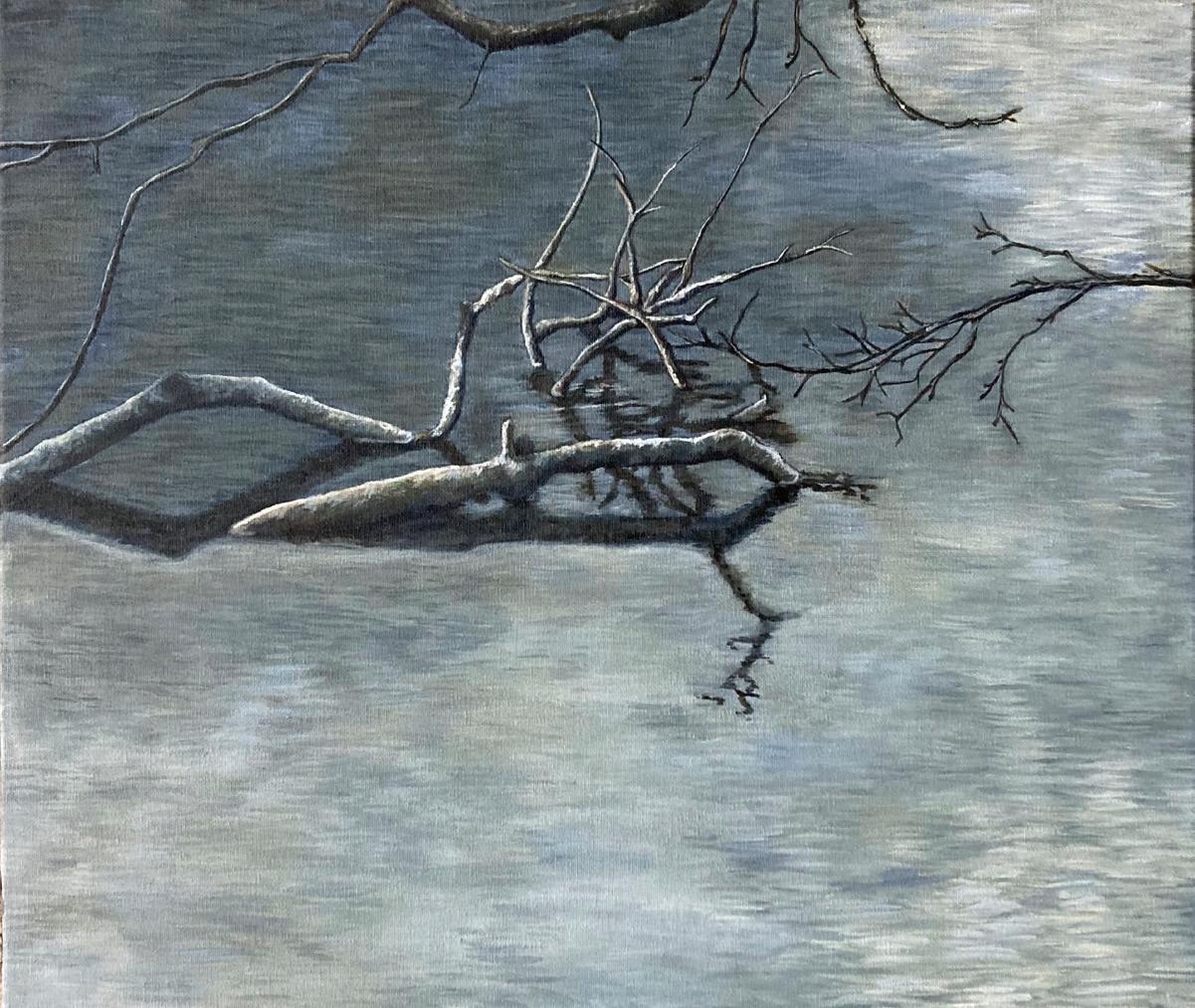
 Zara Kurbanov Sunrise
Zara Kurbanov Morning
Zara Kurbanov Sunrise
Zara Kurbanov Morning

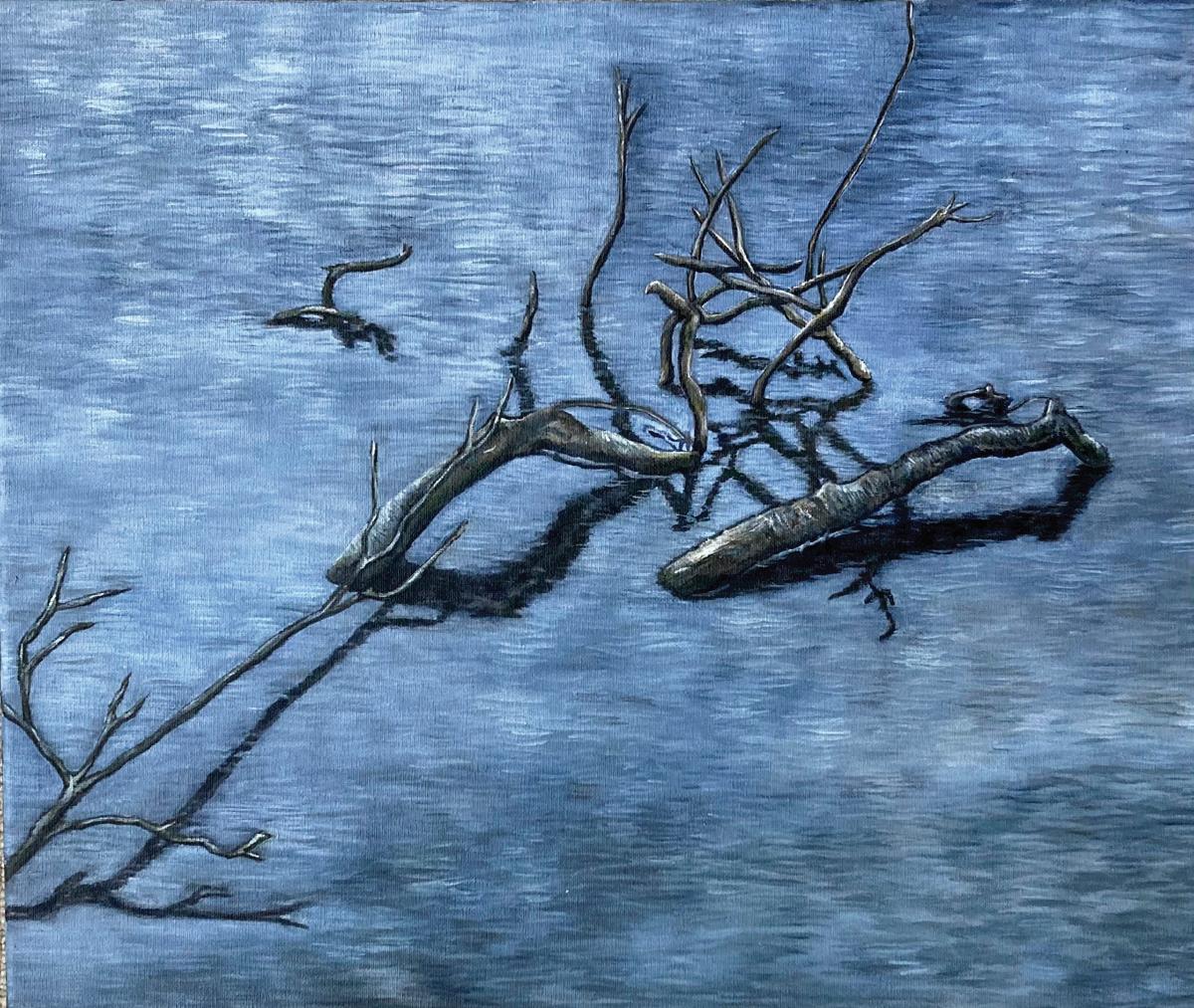 Zara Kurbanov Sunset
Zara Kurbanov Evening
Zara Kurbanov Sunset
Zara Kurbanov Evening
The Silver Cabin
Gianna DeBono
There exists a silver cabin at the edge of the world, sitting just below the place where the northern lights meet the ice caps. The point where its foundation touches the Earth is obscured by a radiant light, giving it the appearance of floating above the ice. It is said that living in this place is a shapeshifter, comparable in beauty to the seraphim. He is, perhaps, the most worshiped of all of God’s creatures. Although none have been fortunate enough to meet him, humanity has since called him Time.
At the edge of the world, the air is the color of poppy flowers. It seeps into your skin like warm honey, disarming your senses and pacifying your soul. Here, the shapeshifter’s cabin is trapped in a state of perpetuity. Its silver walls never tarnish, and its intricate designs remain untouched by nature’s elements. Calcified flora climb its roof, arranged in hauntingly beautiful patterns and effusing a disturbing aroma of deceit. All those creatures above and below the Earth whisper of the hostility of this place, so much so that no living thing can exist beyond the silver cabin. Its poisonous beauty, however, is quite alluring to mankind. The shapeshifter, cunning and devious as he is, has made his silver cabin as a gift to humanity—a promise between himself and man. Although none have entered, humanity does not hesitate to imagine what lies behind the fabled walls. Time’s promise takes whatever form he pleases, an enchanting mirage created by the mind of man. The beloved shapeshifter dances before his eyes, painting the world’s riches with a lilting and lovely voice, transforming himself into man’s deepest desires and most outlandish fantasies. Man imagines the day when he will stand before the cabin at the edge of the world and see himself reflected in its silver walls, not as he is, but as he wishes to be.
The shapeshifter revels in humanity’s foolishness. He blinds the eye of reason to his illusory promise, and tunes the ear of man’s soul to his voice alone. His promise of the silver cabin breeds indolent minds that pay him homage, and Time revels in this idolatry. He whispers that nothing is to be done but to wait in passivity, and watches as man’s soul begins to drip with sloth. He lets humanity cling to his promise as he emaciates the body and corrodes the mind, until not a thought remains but of this shapeshifter’s promised gift.
140
And as Death encroaches upon a man indoctrinated by Time, he recoils at the sight of his soul, grotesquely malformed and begging, even in death, to be delivered to the silver cabin. At the edge of the world, Time has made this silver cabin as a promise to humanity, and he has called it Tomorrow.
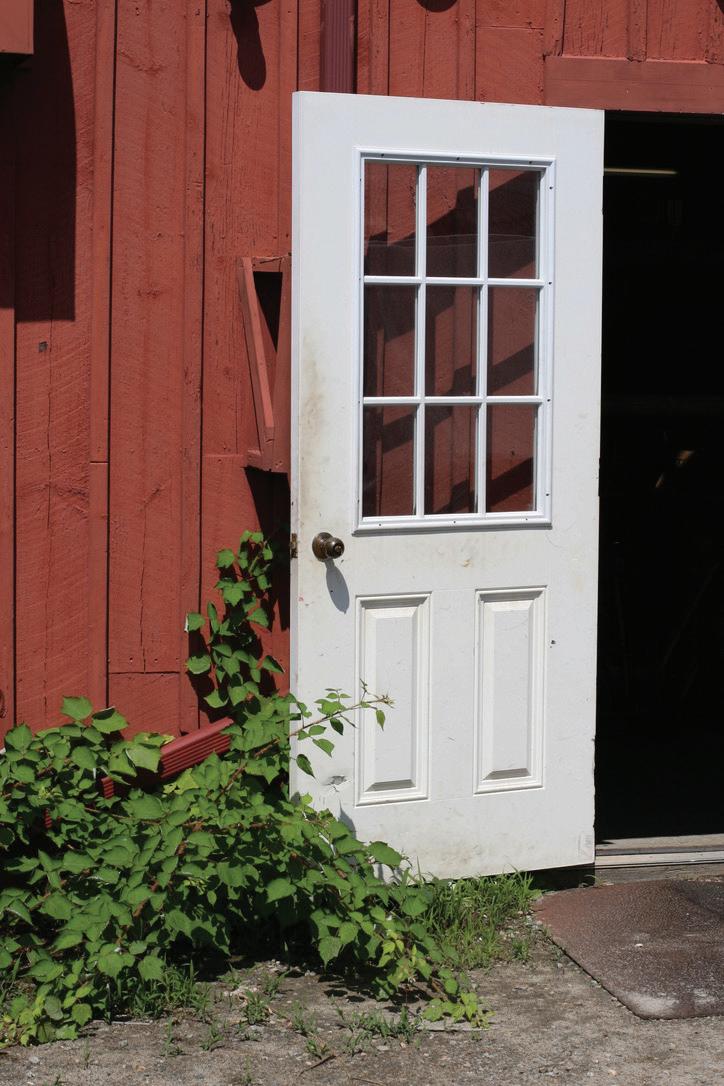
141
Zara Kurbanov Door To Elsewhere
Letter from the Art Editors
After working the past couple of weeks on the 35th edition of Daedalus, we wanted to say a couple words to bring this edition to a close. First of all, we wanted to thank the wonderful writing editor team— Ms. Delapenha, the Editors-in-Chief, the Associate Editors, and the Junior Editors—for providing us an amazing selection of pieces to read through, and we gladly picked up the ball from there.
While we did our best to pair the art to each of the accompanying pieces, we also aimed to showcase the incredible work we received in its own right. Even with the plethora of works that made it into the magazine, we regret not being able to include more. A huge thank you goes out to all of the contributors for their efforts and their talents; your beautiful artwork surpassed expectation time and time again. The pieces that did make it in were extraordinary examples of imagination, experimentation, and personal voice, and we thank you for sharing that vision with us.
Our third thank-you goes out to the incredible arts and production advising team: Ms. Tamalonis and Mr. Pursell. We thank you for your insight and the long hours you spent with us in the art studio putting this magazine together. You pushed us to find new levels, first in creating the artwork, then throughout the process of making our pairings and putting together the graphic design aspect of the magazine, and were integral to the final product. Congratulations especially to Ms. Tamalonis for advising Daedalus for the 35th year; we couldn’t have asked for a more beautiful magazine to commemorate this moment. We saw coffee as the primary theme to bring this edition of Daedalus together this year, but we welcomed each and every voice that contributed to the magazine. Although most of us are avid coffee drinkers, the theme further encapsulated the sharing of ideas, conversations, and collaborations that often occur over a cup of coffee. During the Age of Enlightenment in the 1600s, coffeehouses were a hub of intellectual and cultural enrichment. While we may not be Rousseau and Voltaire brainstorming the foundations of modern political and economic thought, we continue to see coffeehouses as a place to come together. As the saying goes, “history repeats itself.” There was no space where this was clearer than our own Coffee House in mid-December that allowed us to share writing and art that was close to our hearts.
Our final thank you goes out to the reader in joining us on this occasion and taking a step into our vision. We are incredibly proud of all our creators, both art and writing, and hope to have given you just a glimpse into the awe-inspiring creative community at Greenwich Academy. Thanks for reading!
Warmly and with love, Nina Herceg, Sarah Li, Alicia Qin, and Elizabeth Spaulding
142

Greenwich Academy Volume XXXV
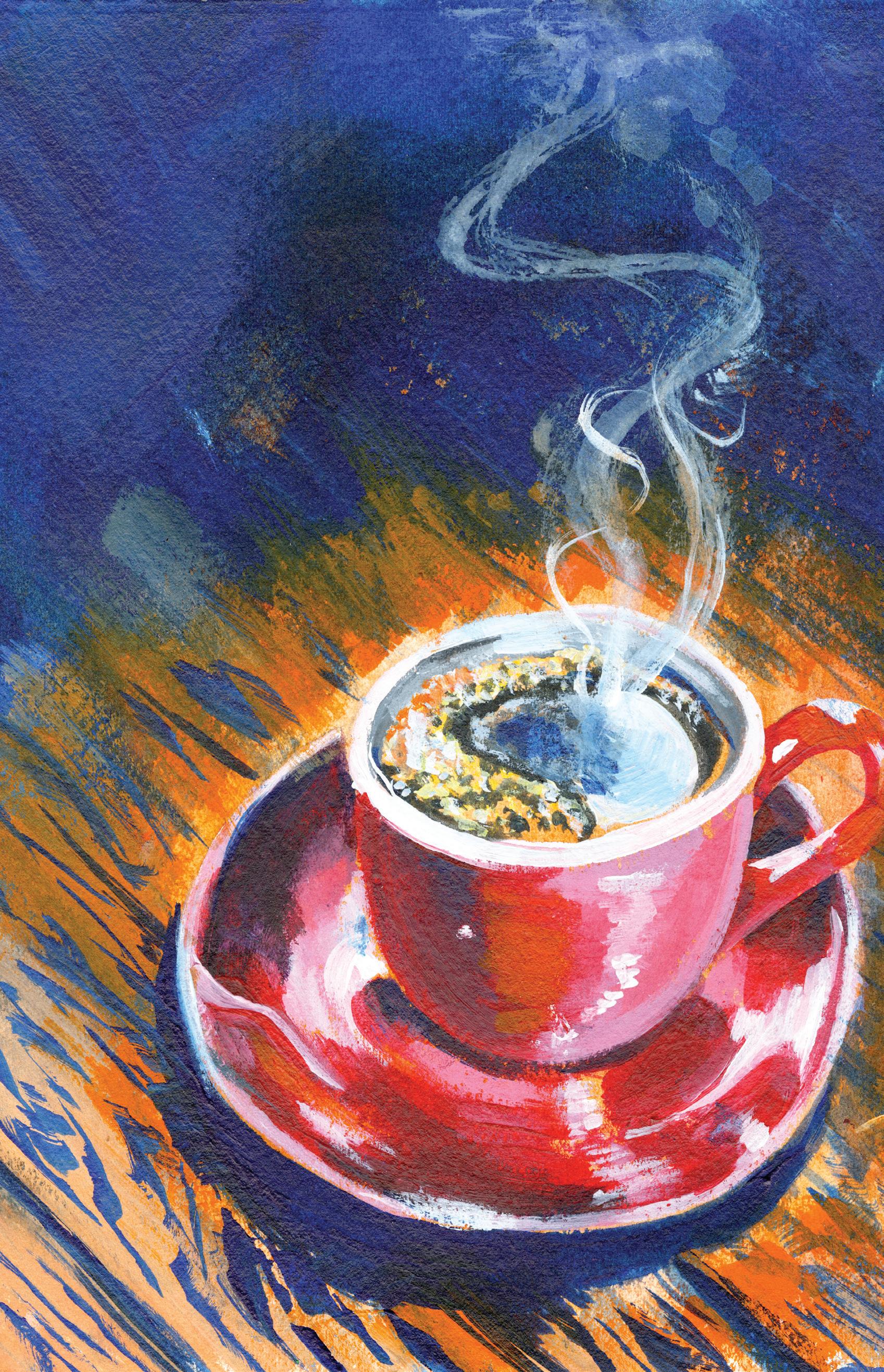









 Honour Russell
Honour Russell
 Honour Russell
Honour Russell


 Joyce Huang
Joyce Huang

 Ainsley Mckee
Ainsley Mckee
 Grace Sullivan
Grace Sullivan


 Callie Hammond Prisoner of Addiction II
Callie Hammond Prisoner of Addiction II









 Alicia Qin
Apples and Pears
Alicia Qin
Apples and Pears





 Sarah Li
The Ice Cream Man
Izzy Hartman
Sarah Li
The Ice Cream Man
Izzy Hartman

 Elena Schmedlen
Elena Schmedlen





 Anna Leventon
Last Cab
Anna Leventon
Anna Leventon
Last Cab
Anna Leventon


 Alicia Qin
Alicia Qin
 Katie Nichols
Katie Nichols
 Sara Raghavan Golden Hour
Sara Raghavan
Sara Raghavan Golden Hour
Sara Raghavan

 Zara Kurbanov
Zara Kurbanov
 Elizabeth Spaulding Collette
Elizabeth Spaulding Collette
 Elizabeth Spaulding
Elizabeth Spaulding












 Sarah Li
Sarah Li






 Alicia Qin
Alicia Qin

 Ainsley McKee
Ainsley McKee











 Honour Russell
Honour Russell








 Izzy Hartman
Izzy Hartman


 Zara Kurbanov Sunrise
Zara Kurbanov Morning
Zara Kurbanov Sunrise
Zara Kurbanov Morning

 Zara Kurbanov Sunset
Zara Kurbanov Evening
Zara Kurbanov Sunset
Zara Kurbanov Evening


